A Florida State University Advancement publication for alumni, parents and friends SPRING 2024 Volume 16, Issue 1

FSU’S REPUBLIC OF PANAMA CAMPUS
THE INNOLEVATION® CENTER FOR STUDENT ENGAGEMENT
WOMEN’S SOCCER: FOUR-TIME NATIONAL CHAMPIONS

A Florida State University Advancement publication for alumni, parents and friends SPRING 2024 Volume 16, Issue 1

THE INNOLEVATION® CENTER FOR STUDENT ENGAGEMENT
WOMEN’S SOCCER: FOUR-TIME NATIONAL CHAMPIONS
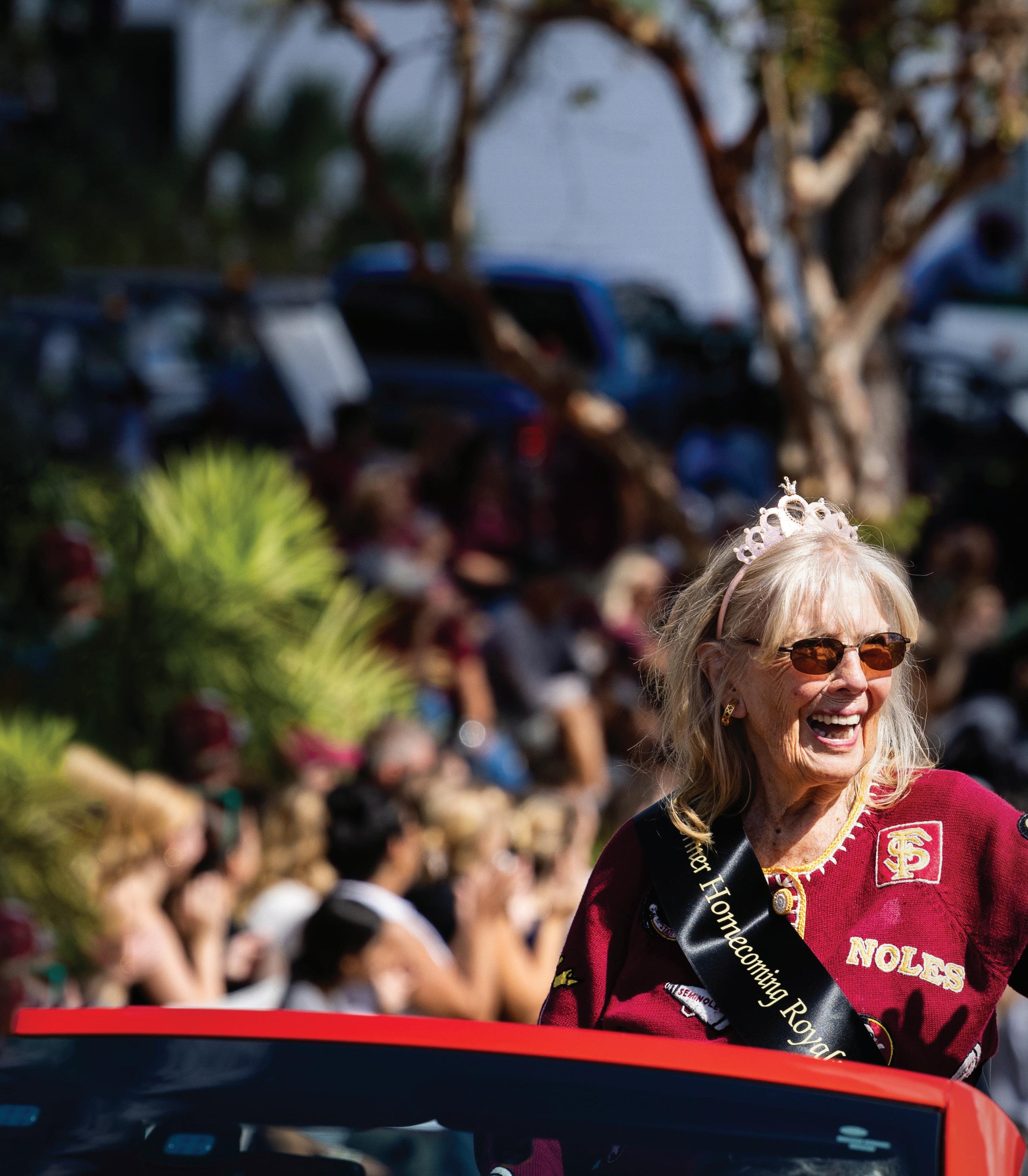

Last fall, FSU celebrated 75 years of the Homecoming tradition. In addition to students and alumni, many of FSU’s homecoming royalty joined us for the festivities.
Spring 2024 Volume 16, Issue
An award-winning biannual publication from the Florida State Division of University Advancement, which includes the Alumni Association and FSU Foundation. Named after the first torch in the university seal, VIRES represents strength of all kinds: physical, mental and moral.
PUBLISHER
Julie Decker
EDITOR-IN-CHIEF
Janecia Britt (B.A. ’17)
MANAGING EDITOR
Beth Pannell
DESIGNER
Lindsey Masterson
CONTRIBUTORS
Emily Clemons MacMillan (B.A. ’17)
Zac Howard (B.A. ’14)
Kenta Joseph (B.S. ’08)
Kelsey Klopfenstein (B.A. ’18)
Maia Rogers (M.S. ’22)
PHOTOGRAPHY
AJ Studios Photography FSU Athletics
Colin Hackley Photography
Bill Lax (B.S. ’90)
Erich Martin (B.A. ’11)
Advertise alumni.fsu.edu/advertise
Contact Us vires@alumni.fsu.edu
Submit a Class Note alumni.fsu.edu/class-notes
Get Involved alumni.fsu.edu
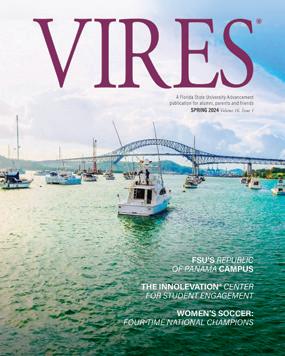
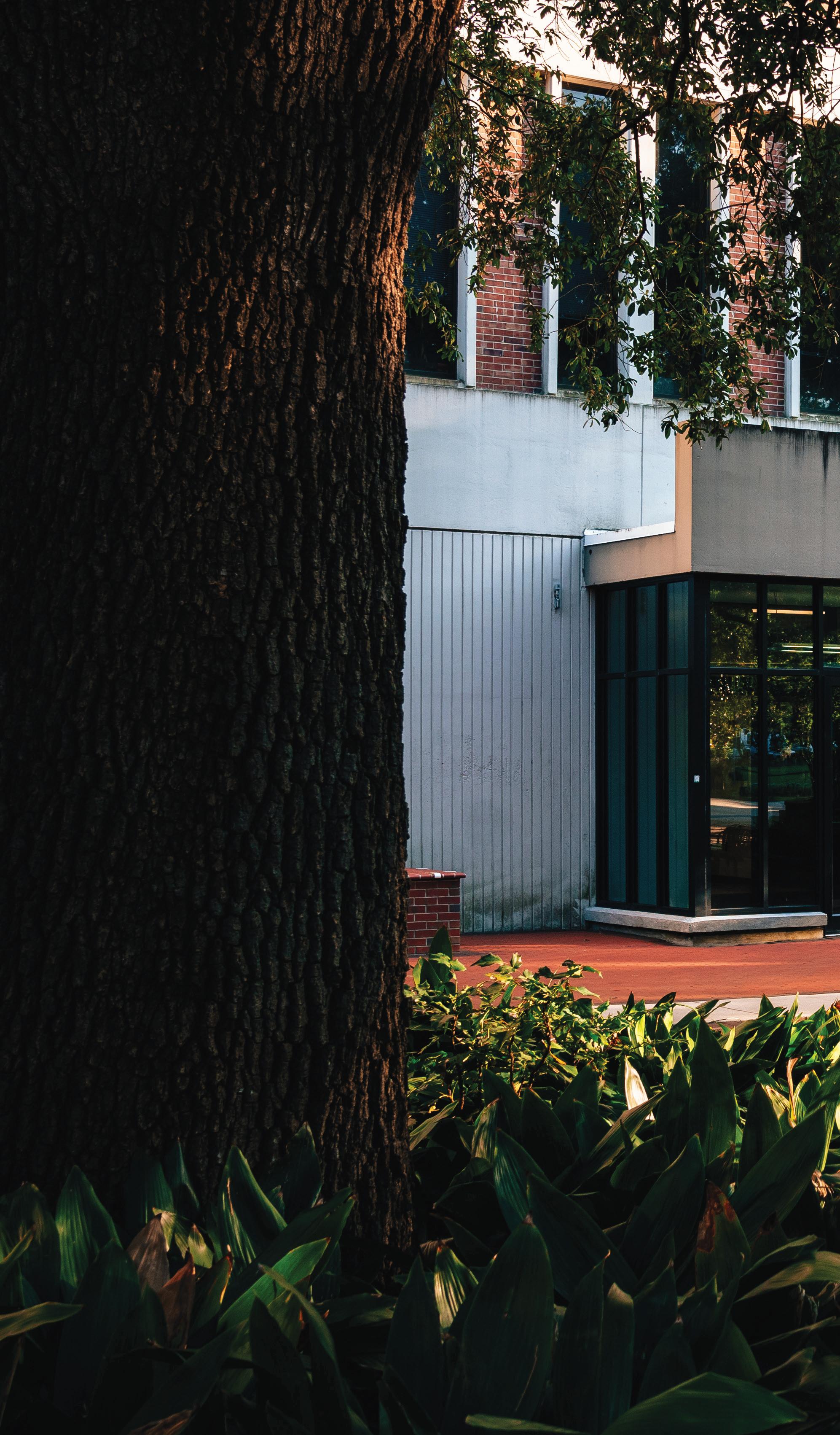 Emily Clemons MacMillan (B.A.
Emily Clemons MacMillan (B.A.
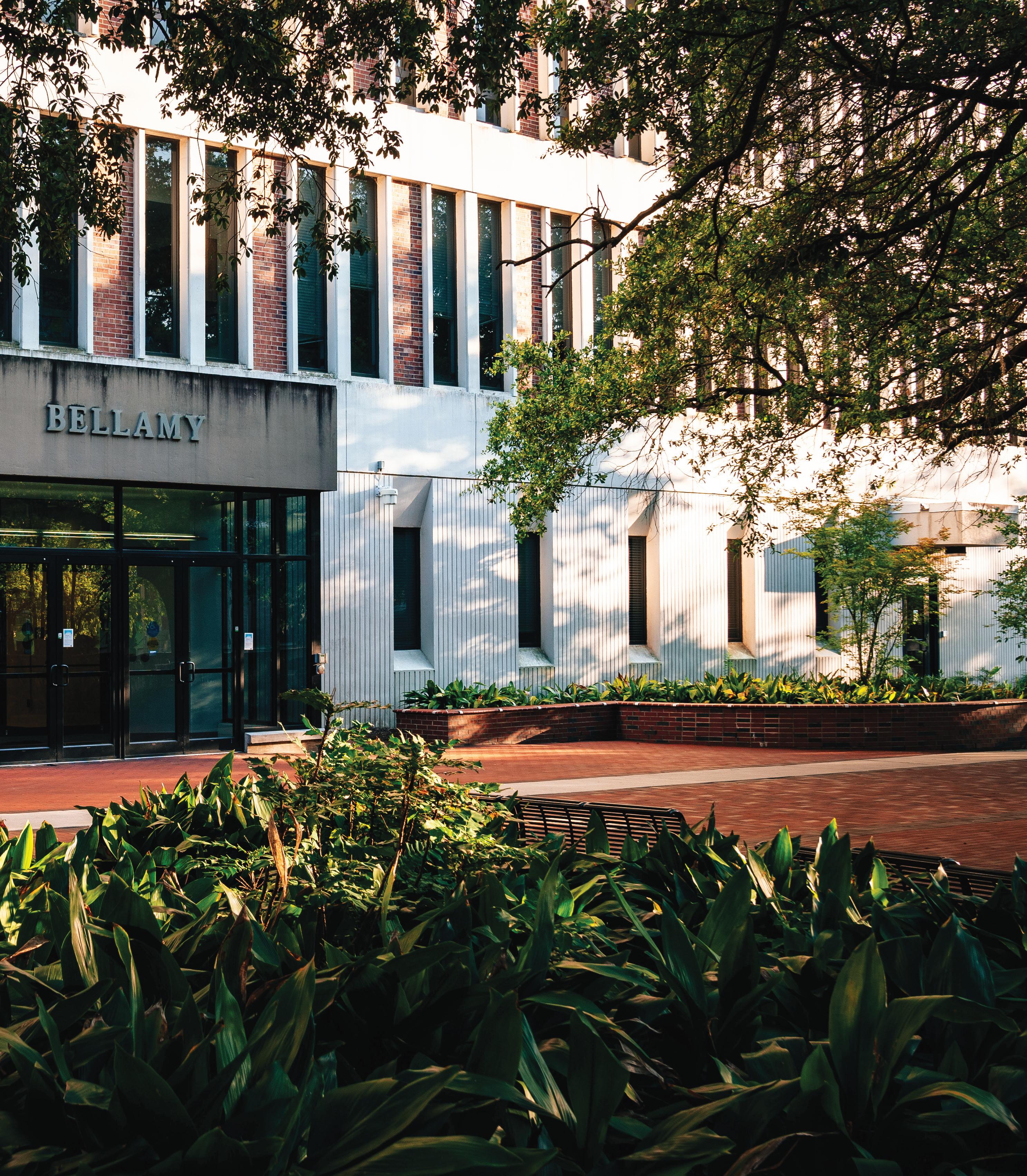
←During the 2023-2024 academic year, the College of Social Sciences and Public Policy (COSSPP) celebrates its 50th anniversary through various events, programs and celebrations. Over 5,000 students call COSSPP home, and over 50,000 alumni around the globe work to address the world’s challenges and better their communities.
To learn more about their anniversary activities and festivities, visit coss.fsu.edu/50th.
’11).
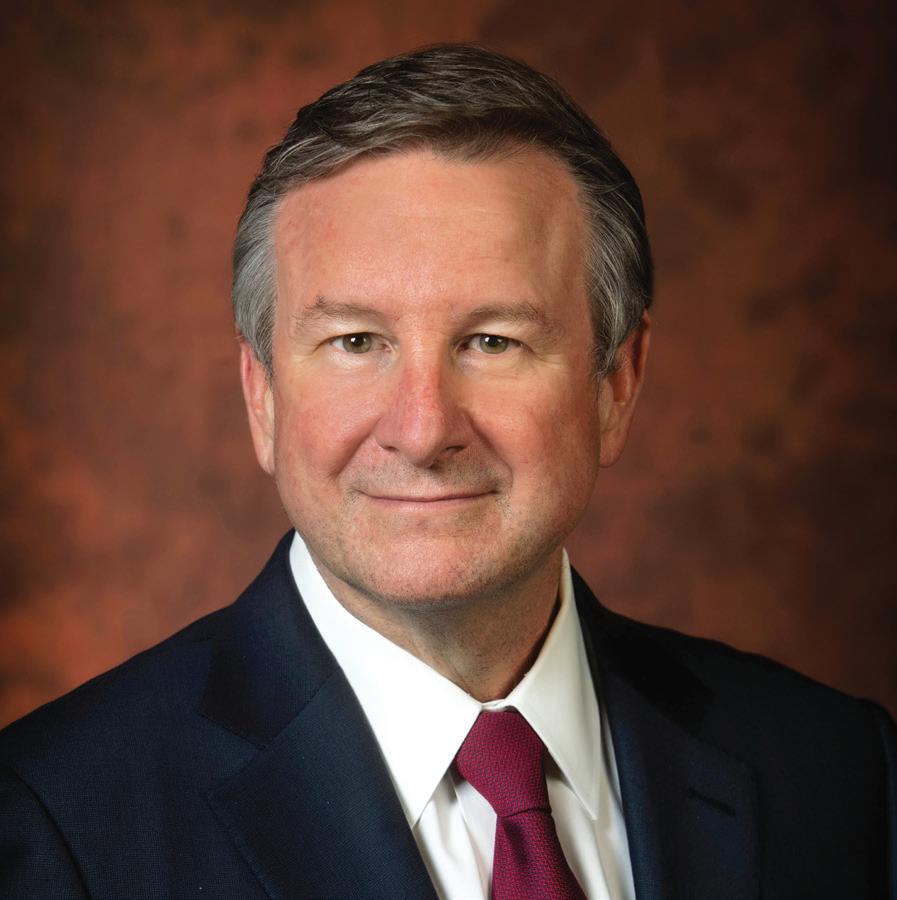
As an entrepreneur at heart, I have always been passionate about creating new businesses and driving economic growth. After earning my Ph.D. in organic chemistry, I started two companies based on technologies I developed in printable electronic materials while working as a professor and researcher at Carnegie Mellon University. It was daunting but incredibly fulfilling as those companies created 90 jobs and contributed to the economic growth of Pittsburgh and the surrounding region.
I learned more from starting those companies about where to focus my research and how to navigate realworld problems than anything else I had done. I met so many people outside of academia, which taught me a lot about the corporate world and building business relationships. Those experiences allowed me to see firsthand the benefits of a strong entrepreneurial ecosystem. That’s why I am committed to nurturing and inspiring an entrepreneurial spirit in Florida State University’s students, faculty and staff as a key component of our strategic plan. This is an essential part of our mission as a major research university — a place that not only creates innovation and discovery, but also creates companies and jobs.
Our Jim Moran College of Entrepreneurship — the nation’s only standalone college of entrepreneurship — and the InNOLEvation Center are excellent examples of how we nurture this spirit in our students. In this issue of VIRES, you’ll find a fascinating piece on two of their most inspiring student success stories.
John Wilcox turned his passion for making a difference in diabetes care into a successful business. His research on insulin pump failures led him and his team to win the 2018 InNOLEvation Challenge for a product that can
detect failures and alert the patient. In the years since Wilcox graduated from FSU, the company has expanded and received large grants from JDRF and the National Institutes of Health.
Michael Benarde is another FSU alumnus who turned a great idea into a successful business. He founded NightCap after winning the 2020 InNOLEvation Challenge with a product he and his sister invented to help prevent drink spiking. They brought the beverage cover to “Shark Tank” and struck one of the fastest deals in the TV show’s history. The company has grown exponentially since.
This issue also includes an article on Discovery Challenge, an event in which five faculty members presented innovative research with commercial potential to three judges with venture capital experience. Presenters earned a combined $100,000 to accelerate the development of these projects. This event, along with efforts such as Fast Start, a new streamlined process to move research from the lab to the marketplace, will help increase the number of FSU startup companies and contribute to economic development in our region.
In addition to encouraging our students, faculty and staff to launch new businesses, I am also increasing FSU’s partnerships with local industries and expanding our global engagement. In this issue, you’ll read about a visit to FSU from a delegation from Ireland, which was an incredible opportunity to build relationships that extend beyond the upcoming Aer Lingus College Football Classic. First Lady Dr. Jai and I are excited to see the FSU Seminoles take on the Georgia Tech Yellow Jackets in Dublin’s Aviva Stadium on August 24, and we hope to see some of you there. In the meantime, I’d like to thank you for your dedication, passion and support.
Have a great summer and Go Noles!
Richard McCullough President, Florida State University

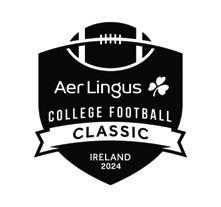

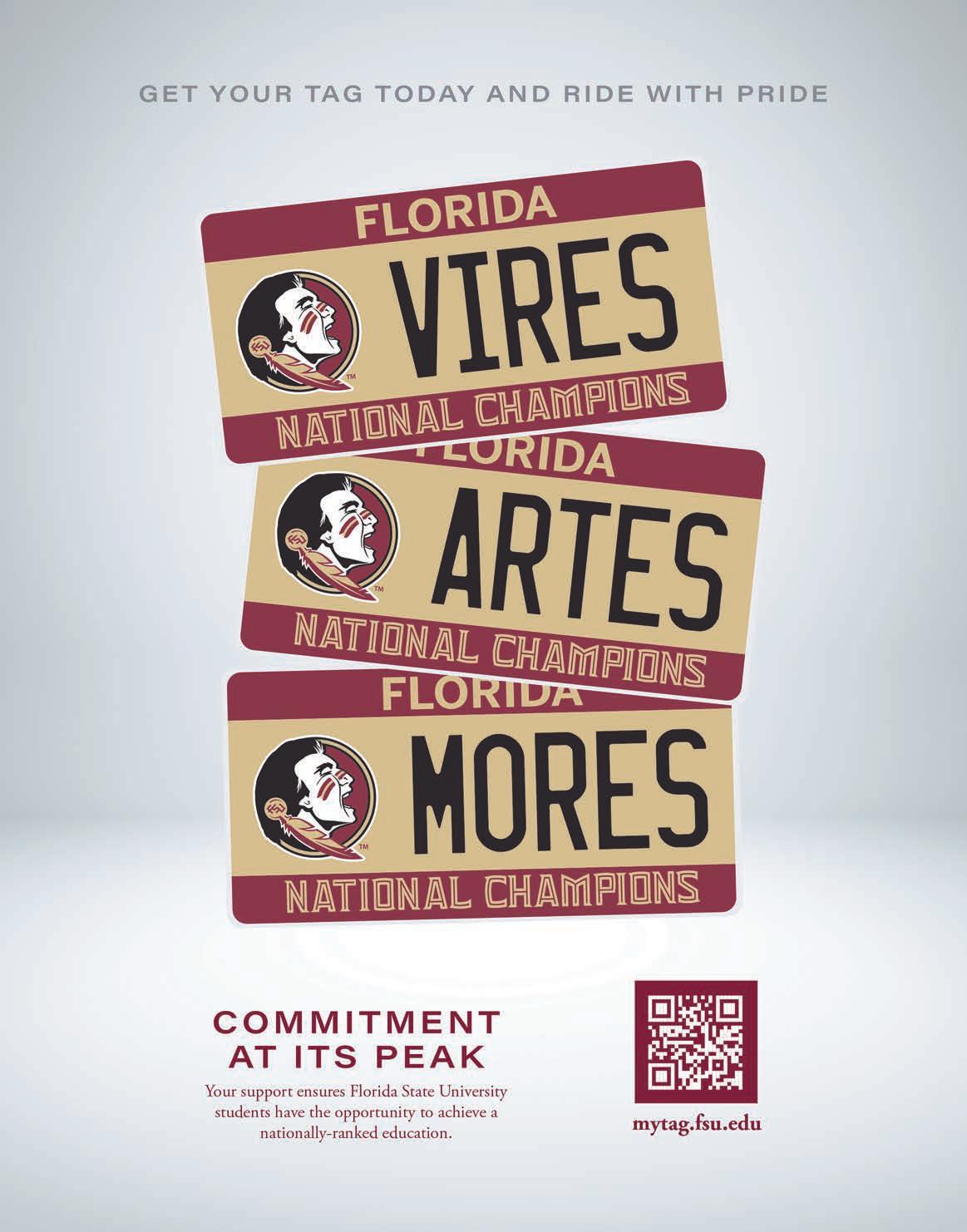

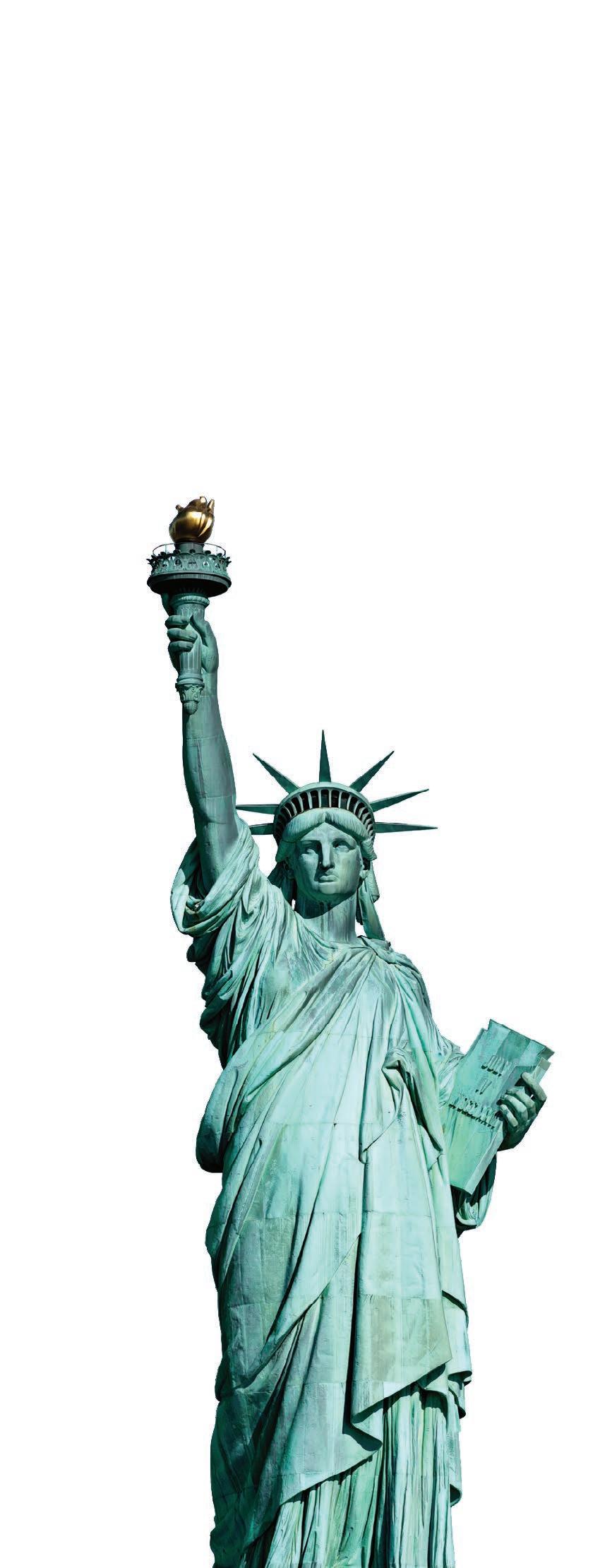
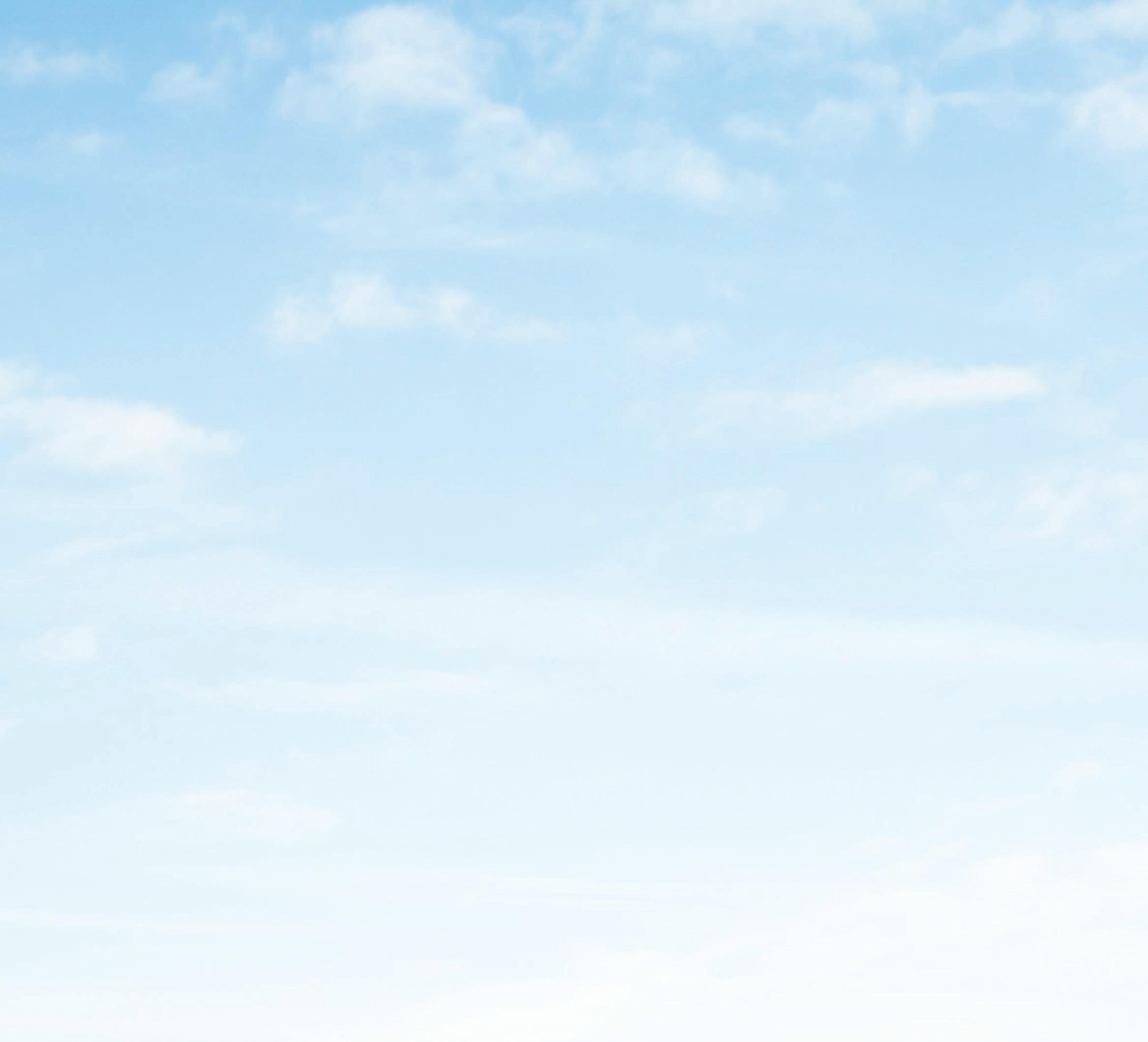
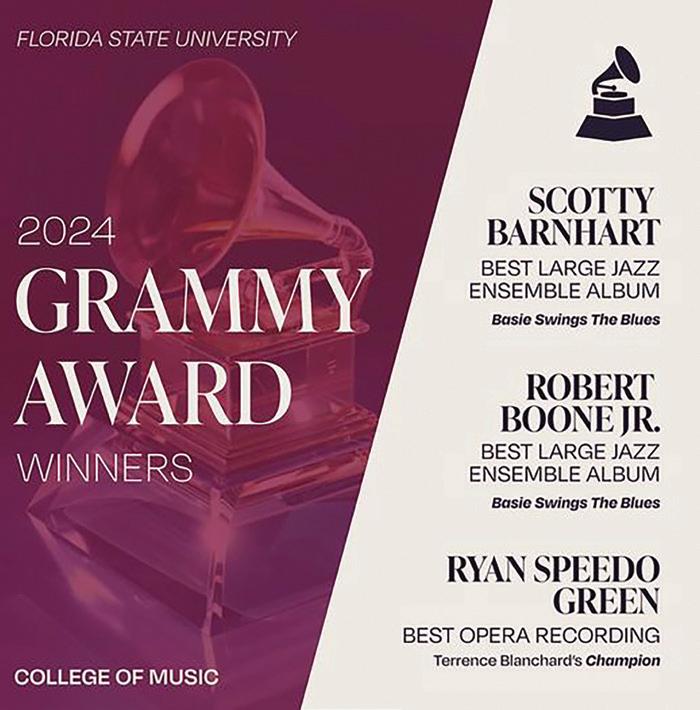
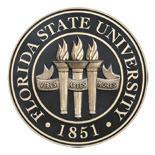
Florida State University College of Music
We are so proud of our Grammy-winning Noles! Winners include College of Music professor Scotty Barnhart and alumnus Robert Boone Jr for “Basie Sings the Blues,” named Best Large Jazz Ensemble Album, and alumnus Ryan Speedo Green for his performance in Terrence Blanchard’s “Champion,” named Best Opera Recording.
Icon Park Orlando @IconParkOrlando
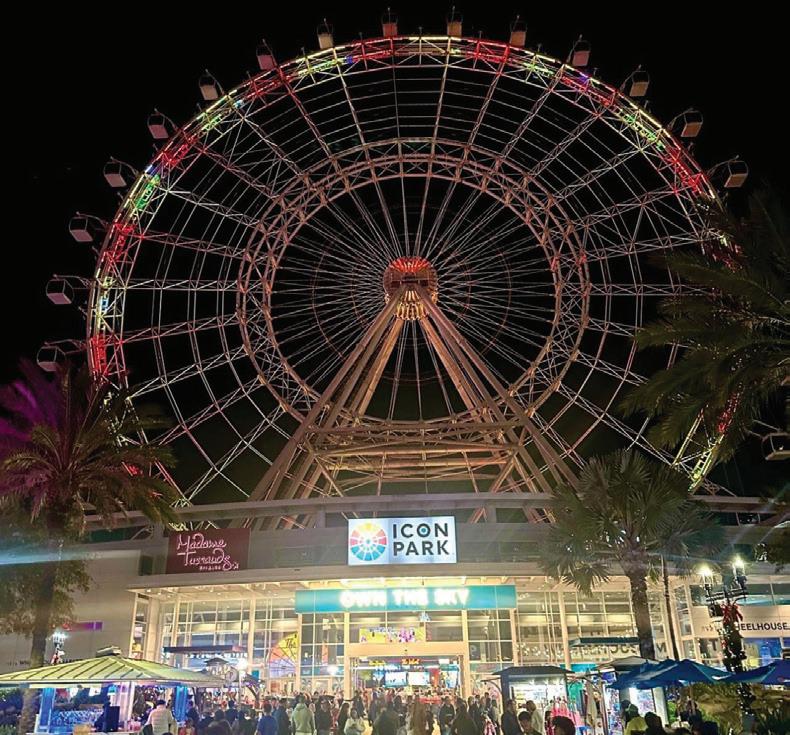
On New Year’s Eve, ICON Park lit our 400 foothigh Wheel Garnet and Gold to honor The Florida State University’s 2023 Football Conference Championship, 2023 Soccer National Championship, 2023 Softball Conference Championship, and 2023 Volleyball Conference Championship. Congratulations Florida State University!
Alumni Association @FSUAlumniAssociation
We are thrilled to invite you to try out our new digital networking tool! Create new connections with FSU Connect, a platform exclusively for the Seminole community. Submit your question, get matched with expert alumni and start receiving feedback!
Jump-start your success at fsuconnect.fsu.edu and experience the power of your alumni network.

“This is a great tool for connecting with nearby fellow alumni in my field. I really appreciate FSU having this tool. I wish I had it from the day of graduation back in 1996. Highly recommend graduates sign up immediately!”
Coleen Stinson (B.S. ’94, M.S. ’96)
LEARN MORE gonol.es/FSUConnect
facebook.com/fsualumniassociation
@fsualumni
linkedin.com/company/fsualumni
@FSUAlumni
YouTube.com/FSUAlumni vires@alumni.fsu.edu
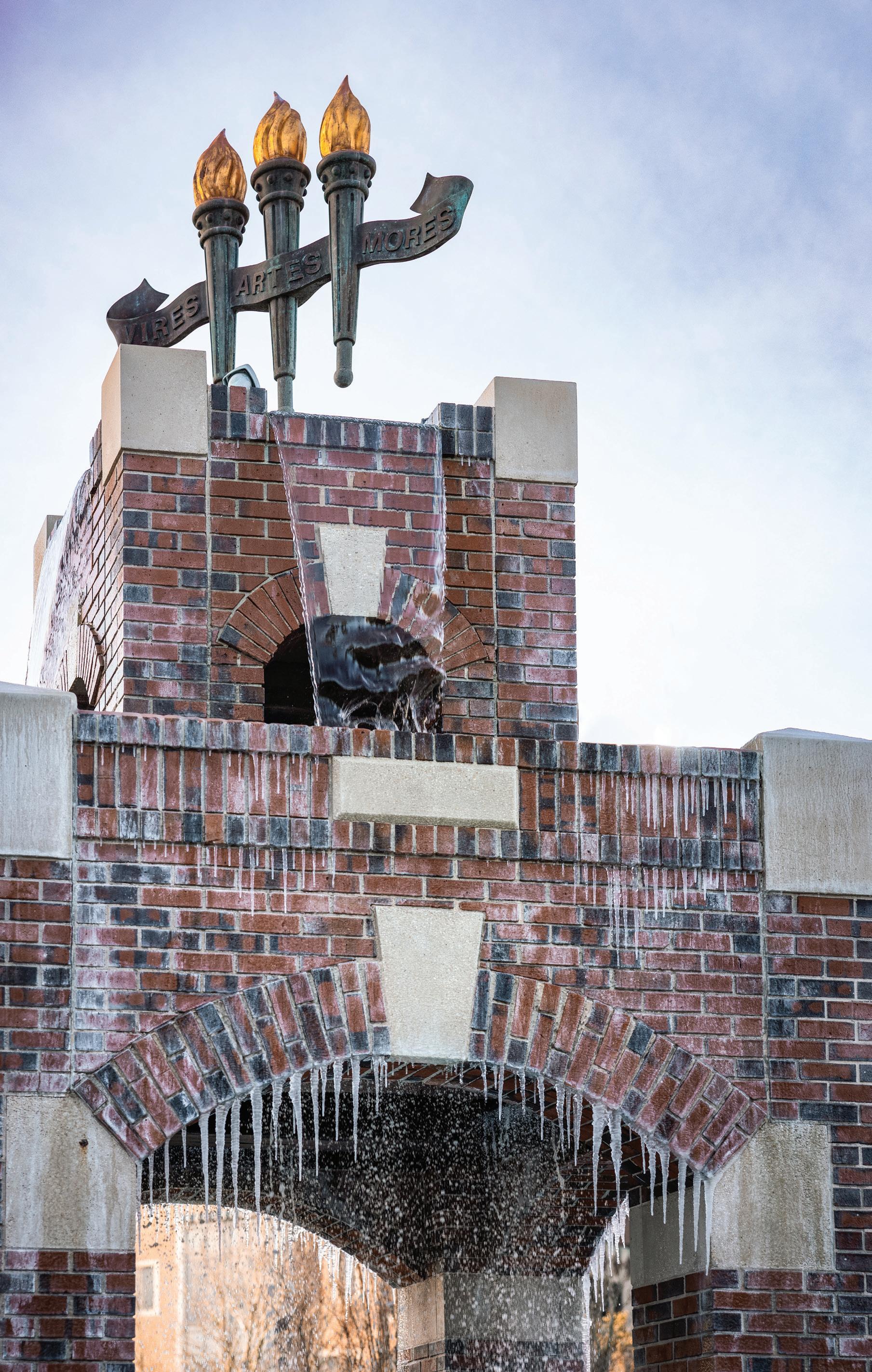


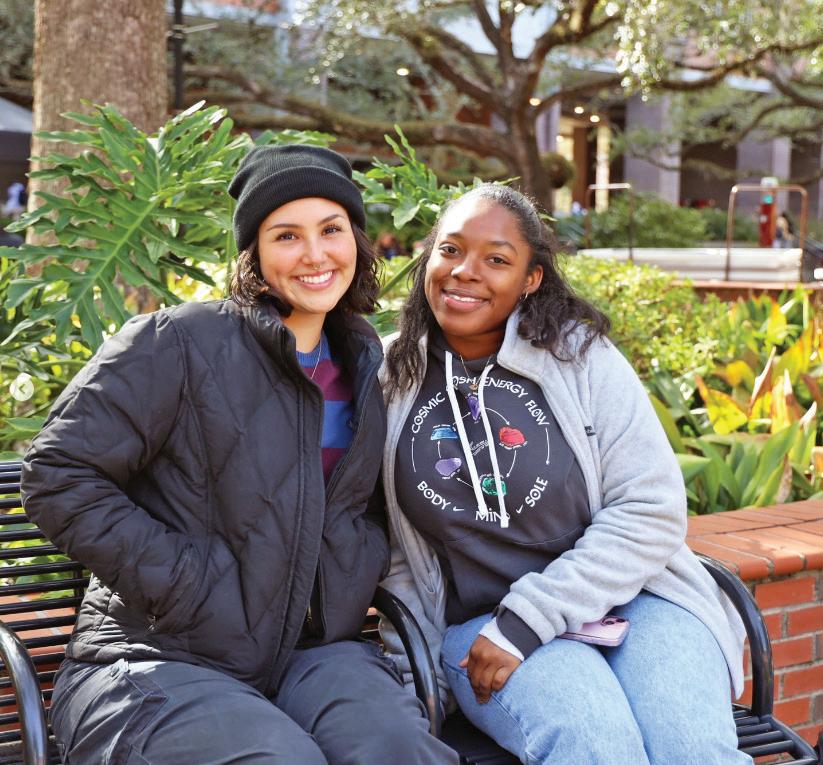
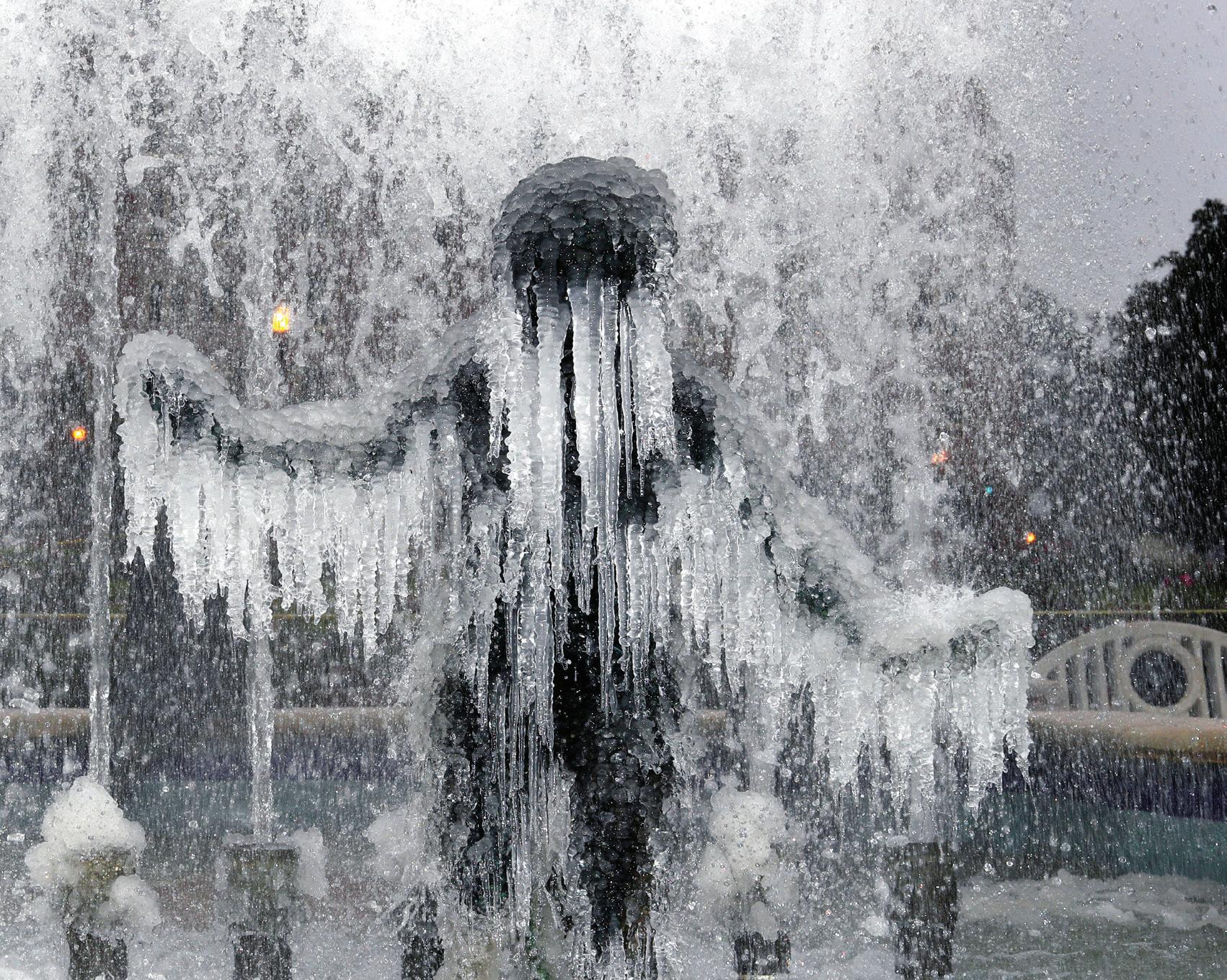
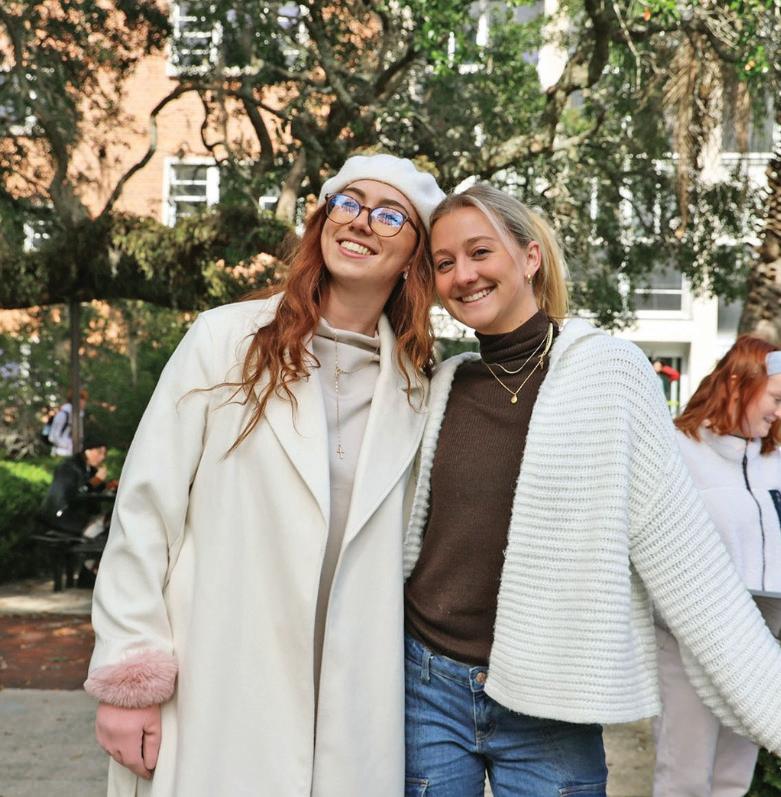
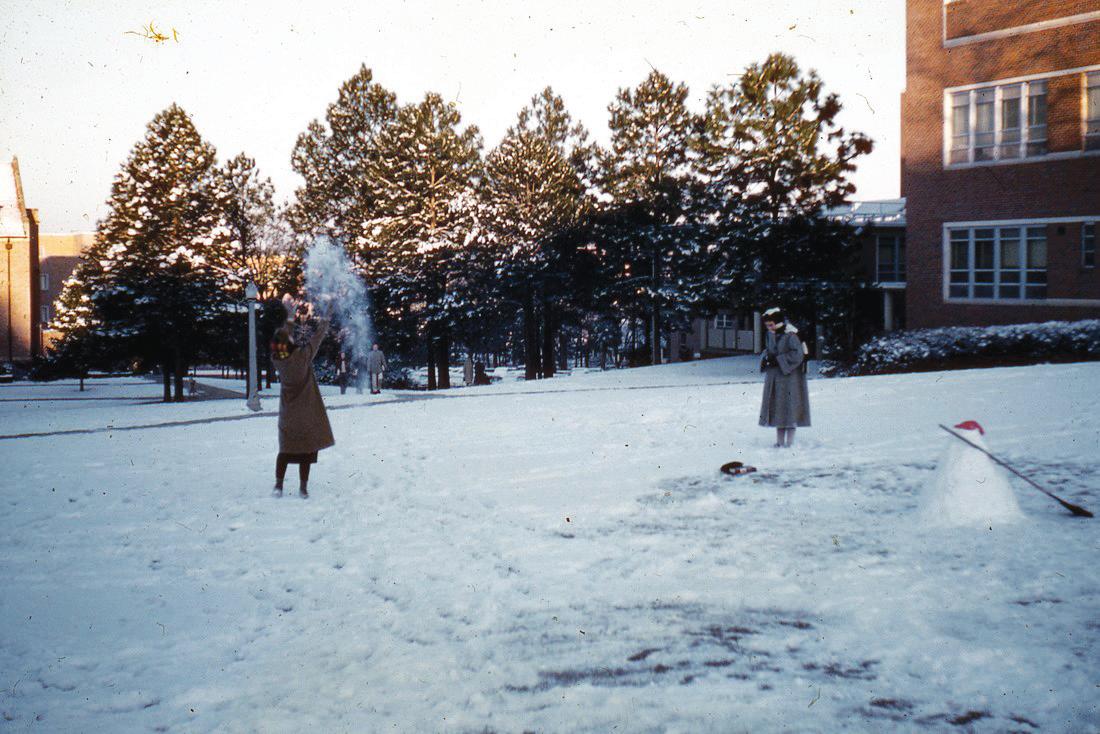
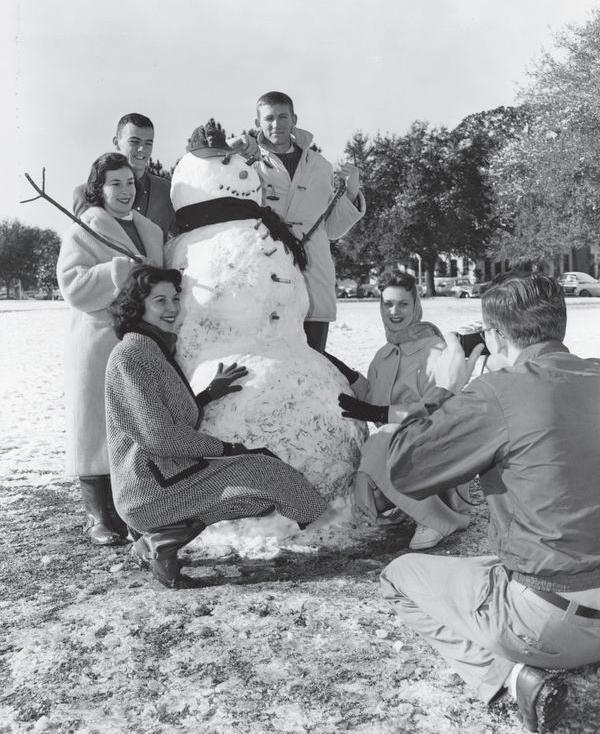
As part of the Sunshine State, Tallahassee has a lot of warm and sunny days. Still, on rare occasions, it dips below freezing and turns campus into a winter wonderland. Fountains freeze, students bundle up and sometimes even a light dusting of snow blankets the brick buildings across the university. On cold days like these, one can’t help but chuckle at the different wardrobe choices that in-state and out-of-state students sport. In-state students can be seen hurrying across campus wrapped up in whatever hodge-podge of sweaters and jackets they manage to find in their closets — while you might see a midwestern transplant braving the 40-degree weather in a t-shirt and jeans. Regardless of where FSU students hail from, one thing they all have in common is knowing how to have fun. In 1958, the campus saw one of its largest snowfalls. Students engaged in snowball fights, built snowmen and even attempted to sled on Landis Green. In the years since, snow has been a rarity — but it is not uncommon to catch a glimpse of icicles adorning the fountains across campus.

In partnership with the Seminole Tribe of Florida, a new study center has been created at Florida State University that serves as a conceptual hub for Native American and Indigenous research and artistic practice to promote educational initiatives and collaborative scholarship.
The Native American and Indigenous Studies Center (NAIS) promotes and coordinates consultations with tribal nations and community leaders, educational efforts inside and outside of the classroom and collaborative scholarship more broadly.
“My vision is that the center will be the intellectual and cultural home for the university’s outreach with the Seminole Tribe of Florida and other Native American tribes in the South and a national leader for collaborative research and programming,” said Andrew Frank, the center’s inaugural director and the Allen Morris Professor of History.
FSU has called itself the “Seminoles” since becoming a coeducational school in 1947. While the relationship includes the use of the Tribe’s name and symbols in the university’s athletic

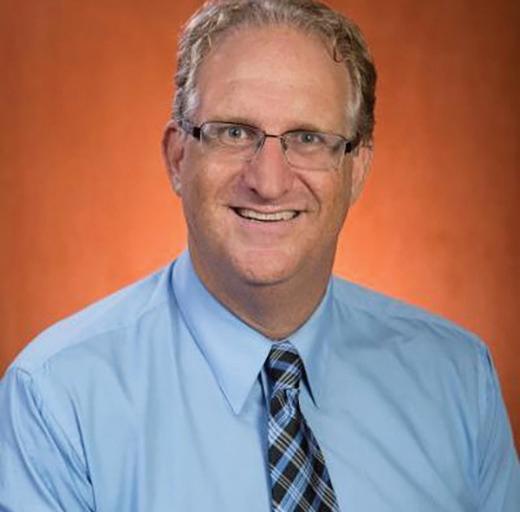
department, the new center is a part of FSU’s larger commitment to collaborate with the Seminole Tribe of Florida as intellectual partners.
With support from the Office of the Provost, faculty members like Frank joined a planning committee dedicated to the center’s development.
“Creating this center and expanding our scholarly work in Native American and Indigenous studies advances our research mission and strengthens our unique partnership with the Seminole Tribe of Florida,” said Jim Clark, provost and executive vice president for Academic Affairs. “Many have dedicated their time and care to this exciting new endeavor, and I’m grateful for their efforts.”
The center also will extend its focus to collaborations with Native and Indigenous groups outside of the Seminole Tribe of Florida. Constructive conversations with representatives from groups such as the Muscogee Nation, Miccosukee Tribe of Indians of Florida and Choctaw Nation moves the center closer toward its goal of global indigeneity.
“We have a special obligation to the Tribe and many community members are interested in the center because we are ‘Seminoles,’ but the center goes beyond more than Seminole outreach,” Frank said.
Although Florida State University and the Seminole Tribe of Florida have a longstanding, institutional partnership, Frank hopes that the center will strengthen the intellectual collaboration between the partners.
“The center is committed to aligning the questions and concerns of the modern Seminole Tribe with the expertise we have at the university, and I think that’s a win for both communities,” Frank said.
The NAIS Center will cater its curriculum and programming around graduate and undergraduate students interested in Native American and Indigenous cultures and the nature of the university’s partnership with the Seminole Tribe of Florida.
Frank said that the joy of building the center is figuring out what students really want.
“It’s an opportunity to help preserve and pass along the knowledge of Native American and Indigenous studies,” Frank said. “We have a lot of students, athletes and nonathletes, who know they wear Seminoles on their chest, their shirt, their hat. They’re curious about the notions of appropriation and partnership, and they very much want answers.”
One way student-athletes and fans are honoring the Seminole Tribe of Florida is through the turquoise uniforms being worn at Athletics games and the new line of Seminole Heritage merchandise. The color turquoise was chosen as it represents harmony, friendship and fellowship in many Native American cultures. A portion of the proceeds from the sale of Seminole Heritage merchandise goes towards supporting the NAIS Center to support programs for Indigenous youth at FSU and public education about the Seminole Tribe of Florida.
In addition to its curriculum, the NAIS Center hosts a monthly lunchtime brown bag seminar featuring the research and artistic practice of graduate students.
Recently, the center hosted the American Society for Ethnohistory annual conference, where scholars of cultural anthropology, history, American Indian studies, archaeology, ecology and linguistics collaborated with modern Indigenous communities and shared new scholarship within Native American and Indigenous studies.
Frank said hosting this preeminent international conference is an example of how the center engages in larger conversations beyond Florida State’s campus, which is an important aspect of the center.
The physical center will soon have a permanent location near the Westcott Building.
LEARN MORE nais.fsu.edu.

When Norm Thagard (B.S. ’65, M.S. ’66) left NASA in 1995 to join the FAMU-FSU College of Engineering, he had one big question for his dean — What is my new mission?
Along with his role as a professor of electrical engineering, Thagard was the college’s director of college relations.
“I asked Dean C.J. “Marty” Chen, ‘What does a director of college relations do? What do you expect me to accomplish?’” said Thagard. “He said he expected me to get kids turned on
↑ Fifth-grade students from Sabal Palm Elementary School in the IMAX theater at the Challenger Learning Center, the K-12 outreach facility of the FAMU-FSU College of Engineering. Students from several schools in Leon County visited the center in 2022 for a screening of Black Panther: Wakanda Forever and a discussion about the importance of learning STEM subjects. Photo courtesy of Challenger Learning Center.
to engineering so we would one day see them as students coming into our college.”
Thagard’s solution: The Challenger Learning Centers, a network of science-education facilities around the country built to inspire students.
Almost three decades since that conversation, and 20 years since the Challenger Learning Center of Tallahassee opened, it’s been mission accomplished.
The center marked its 20th anniversary in December 2023, and a crowd of longtime supporters visited the facility in downtown Tallahassee to celebrate its legacy and hear from some of the people who helped make it a reality.
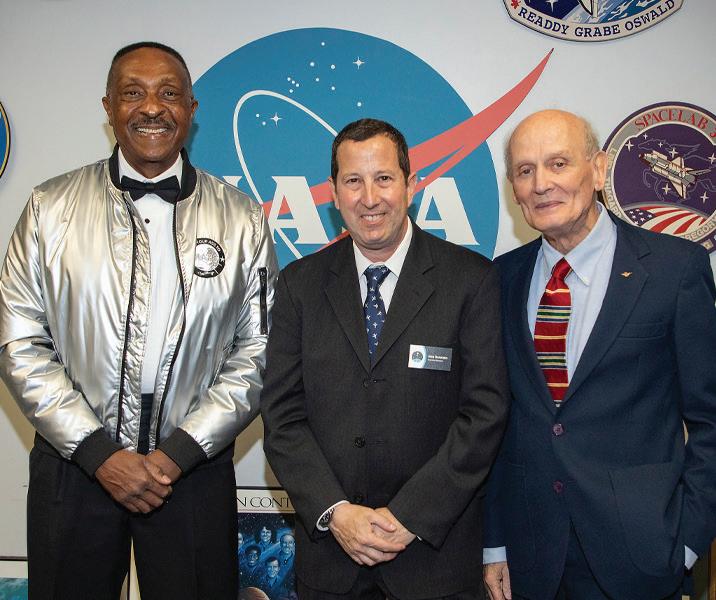
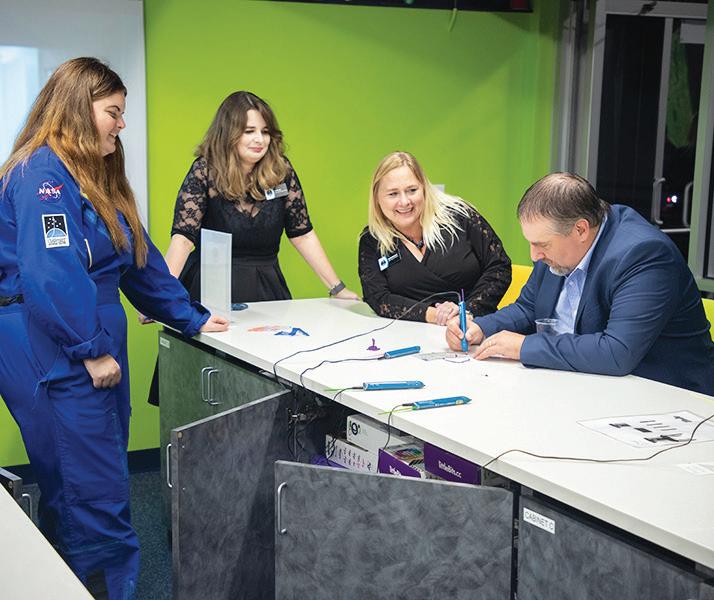

Former NASA astronauts Scott and Thagard were early supporters of the center, which celebrated its 20-year anniversary in 2023. Visitors enjoy activities during the Challenger Learning Center’s 20th anniversary celebration. Marjorie Turnbull, a former member of the Florida Legislature and early supporter of the Challenger Learning Center.
The site is the K-12 outreach facility of the FAMU-FSU College of Engineering, the joint engineering college of Florida A&M University and Florida State University. It hosts thousands of students every year, who visit to see educational videos and demonstrations in the IMAX theater and planetarium, practice teamwork on a space mission simulator and more.
“Our mission has been to inspire students to get excited about math and science, but also exploration in general,” said Director Alan Hanstein. “Whether it’s the Challenger mission, the James Webb Space Telescope, blue whales, butterflies or anything else, we’re going to encourage them to go out and learn more about it. If you think about a middle school student 20 years ago — they’re in their career now. It’s really exciting to think that we’ve made that kind of impact.”
Challenger Centers were born from tragedy. In 1986, the Space Shuttle Challenger broke apart shortly after launch, killing the seven-person crew. The families of those astronauts started
the Challenger Center for Space Science Education to honor their loved ones and carry on their endeavors. Today, there are Challenger Learning Centers across the U.S. as well as international centers, all a living memorial to the Challenger crew.
The Tallahassee center has the same vision — inspire the next generation of scientists and engineers who could help plan the space missions of the future.
“At that time, and it’s still true today, we didn’t have enough American kids going into STEAM subjects, and we don’t have enough going into aerospace/ aviation specifically,” said Captain Winston Scott (B.M. ’72), a former NASA astronaut who served on the center’s first board. “The beauty of the learning center is that it is hands-on. Students actually simulate doing a space mission and doing experiments in space. We hope that captures the imagination. That’s what it’s all about.”
Today, the center serves about 50,000 students in a 68-county region in Florida, Georgia and Alabama, who visit to practice hands-on teamwork and problem solving.
“The Challenger Center is an integral part of the FAMU-FSU College of Engineering,” said Suvranu De, dean of the joint college. “So many scientists and engineers started on their academic journeys because they were inspired as children. The center is helping to spark that inspiration and carry on the legacy of the Challenger crew, who dedicated their lives to pushing the boundaries of knowledge and discovery.”
As Challenger Center leaders look to the future, they envision an improved facility and robust outreach program that can continue the work of the past two decades, Hanstein said.
At the site in downtown Tallahassee, that means upgrades to the building’s infrastructure and exhibit space, including more hands-on exhibits that guests can use whenever they visit. Challenger staff will also make more outreach visits, bringing the experience of discovery to students who can’t make the trip to the center.
“Our goal is to continue making the learning experience at the center the best it can be for everyone we interact with,” Hanstein said. “During the past 20 years, so many people have helped make the Challenger Center a worthy living memorial to the astronauts of the Challenger mission, and it’s our honor to continue that work.”
LEARN MORE challengertlh.com
On a sunny Saturday afternoon in mid-October, throngs of football fans are descending on Doak Campbell Stadium on the campus of Florida State University.
It is game day, and the FSU football team is set to draw 80,000 fans to the stadium.
Guiding them all toward a safe arrival is a team of local, county and campus police and stadium security. On campus nearby, a group of FSU students from the Disaster Intelligence Analysis Laboratory (DIAL) are monitoring real-time, publicly available data and assisting law enforcement’s effort to ensure a safe and enjoyable game day for all.
Launched in spring 2022, DIAL is housed in FSU’s Emergency Management and Homeland Security (EMHS) program in the College of Social Sciences and Public Policy. DIAL’s mission includes giving students real-world experience supporting public safety services and emergency responders with vital information and reports.
David Merrick, director of EMHS and the Center for Disaster Risk Policy, said there’s not another program like it at another university. “It’s one of a kind,” he said. “It is not just football games. Wildfires, protests, hurricanes, gun violence — are all events these students can support.”
DIAL currently has 15 student volunteers representing a cross-section of majors, from criminology to geography.
“They are here every morning,” Merrick said. “When Hurricane Idalia hit, we used drone technology to help FAMU determine if the roofs of any of their buildings were damaged.”
Located in the Bellamy building, the lab’s circumference is rimmed by computer monitors, while massive flat screens hang from two of its walls, offering real-time data from around the world. Students monitor a host of publicly available sources including weather outlets, social media and web traffic and use industry standard tools like Team Awareness Kit software, GIS and geo-spatial mapping programs. In the corner, helping to support their work sits a supercomputer the students affectionately call “The Kraken.”
Rob McDaniel, teaching professor in EMHS and Senior Fellow at the Center for Disaster Risk Policy, helped launch DIAL and said the experience students gain in the lab is invaluable.
“The room is run by the students,” he said. “They have taken ownership of this; managing the schedule, the deliverables. They are running it and they are crushing it.”
Part of McDaniel’s confidence in the program stems from its insistence on practicing the basics, specifically writing in the finely honed style of emergency reports, such as those used by law enforcement and emergency response agencies.

That skill is refined daily as students scour online resources for reports, maps, charts and graphs before synthesizing and distilling information into a cogent daily report. The report is then distributed to DIAL’s stakeholders, a list that includes more than a dozen agencies and departments across Florida, including FSU and the FSU Police Department.
Doctoral student Kate Reid leads the lab’s students and said such writing prizes clarity — and eliminating uncertainty — in equal measure. The daily report is a group effort. Students write, proof,

edit, re-write and re-edit, Reid said, ensuring clarity of voice and that it meets the needs of DIAL’s stakeholders.
“The report is a completely different way to write than most students, graduate or undergraduate, are used to,” she said. “It helps promote critical thinking, writing concisely and clearly boiling down complicated problems.”
The quality of the report is crucial to maintaining a strong working relationship with stakeholders.
“That credibility and trust we have with them are built on the accuracy of the report,” she said. “The process of building and maintaining that is built every day.”
Suraj Acharya, a senior criminology major from Jacksonville said his writing and technological expertise have grown dramatically. Beyond those benefits and the camaraderie, he enjoys with the DIAL team, Acharya said DIAL addresses a challenge facing many college graduates.
“You can’t get hired without experience,” he said. “So, it’s the same old question how do you gain experience without getting hired?”
McDaniel said he thinks the program goes a long way toward answering that question.
“The work they are doing here is emblematic of what’s out there in the real world and that will help them get a job,” he said.
LEARN MORE em.fsu.edu
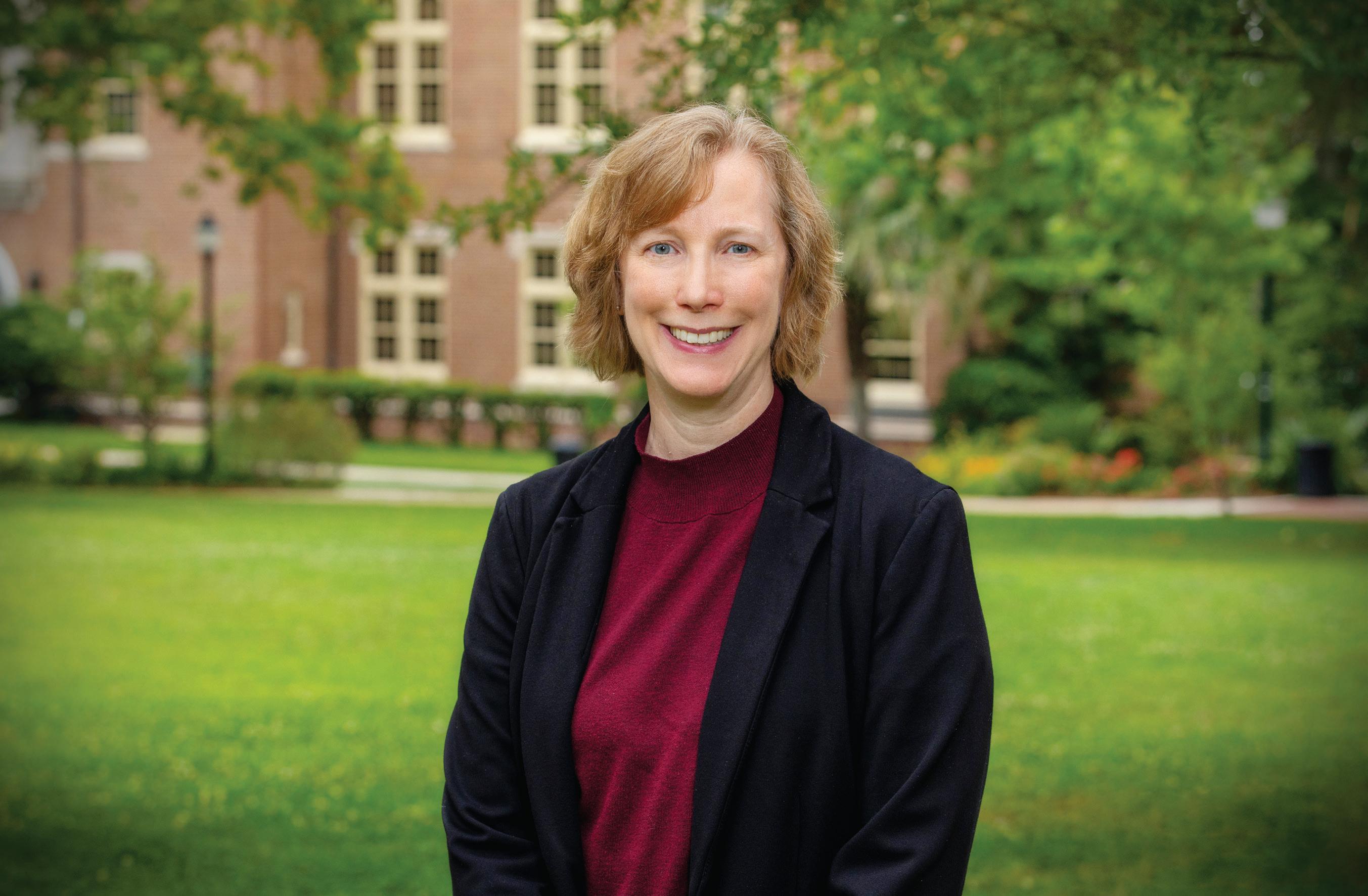
Michelle Kazmer is the dean of the College of Communication and Information and a professor in the School of Information – but she’s also a leading expert on Golden Age crime fiction author Agatha Christie.
Last fall, Kazmer was the first American to give a keynote speech at the Agatha Christie and Golden Age of Crime international conference, a gathering of academics in Exeter, U.K.
The annual event, which started as one doctoral student holding a conference related to his dissertation, has grown into a crossdiscipline international conference. Almost 10 years ago, Jamie Bernthal held the first conference when he was a University of Exeter doctoral student writing a dissertation about Agatha Christie.
Since then, scholars from across the globe have attended the conference, bringing their contributions on how Christie’s work relates to their respective fields of study; linguists, lawyers and archeologists were among those in attendance this year.
“I have this treasured community of scholarly colleagues,” Kazmer said. “Everybody has something to offer and take away.”
Kazmer’s 45-minute keynote, “Somerset House, Selfridges and the Castanets of Bronze: Information Systems in the Works of Agatha Christie,” focused on information systems used by Christie in her works. These systems include the telephone, telegraph and postal systems, but also systems of information such as publications and railroad timetables.
Some scholars argue that it’s difficult to write modern crime fiction simply because of the accessibility of modern information systems available to people. Kazmer’s keynote points to the large number of formalized information systems available during Golden Age crime fiction — to the writers, readers and characters — that manifest in Christie’s work.
“Detection is an information behavior,” Kazmer said. “You are seeking information, figuring out what to keep and what to get rid of, organizing what you keep and then drawing a conclusion. In the case of these stories, the detectives use information to determine who committed the crime and why.”
The conference emphasizes the relevance of Christie’s works to academia, as well as her lasting impact in modern society and media.
“Most of the things we think of as typical tropes in detective fiction, Agatha either did it first or did it best,” Kazmer said. “She is eminently readable and re-readable, and her work has been translated into more than 100 languages and adapted into every communication and entertainment medium from stage plays to video games. New audiences are continually discovering and loving her work.”
It’s because of this that Christie’s works endure in contemporary media. Kazmer discovered Christie’s books at her public library when she was just 12 years old. She said that Christie’s works provide entertainment and comfort while helping shape society’s views of justice, evil, evidence, morality and crime.
“We’re studying how popular crime fiction is really shaping how people view their role in humanity, and that’s really important,” Kazmer said. “FSU and my colleagues acknowledging the importance of this work and supporting my contributions allows me to travel to these conferences and engage in these discussions.”
LEARN MORE cci.fsu.edu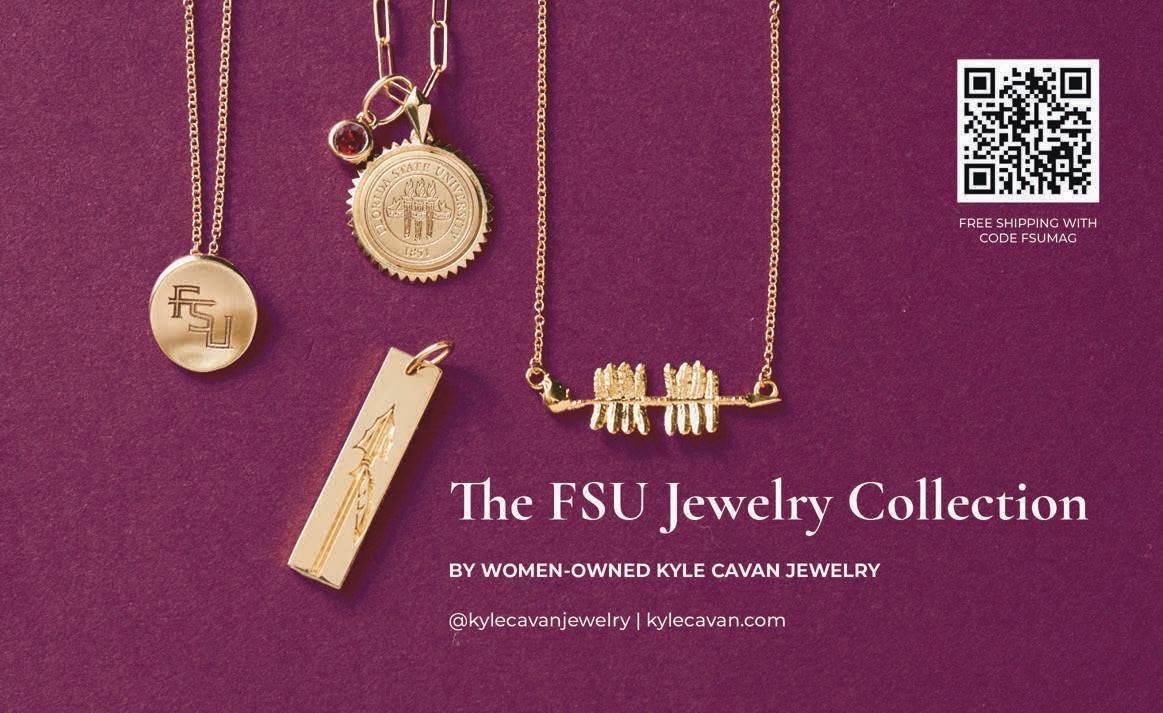
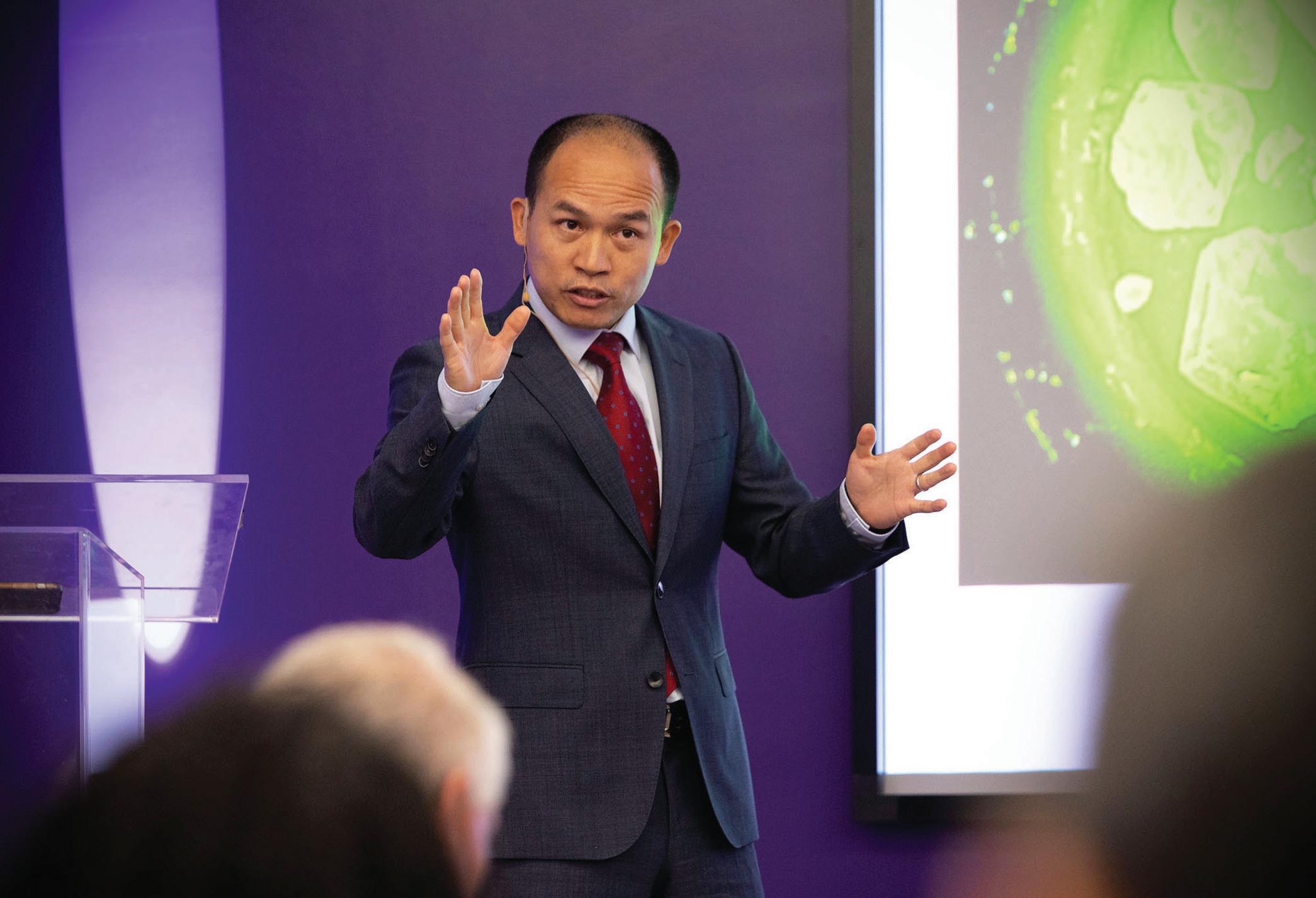
Five Researchers Awarded $100,000 for
In a remarkable showcase of innovation, five Florida State University researchers walked away with a combined $100,000 in funding for new projects that show commercial value at the Discovery Challenge event last October.
Discovery Challenge was a high-energy event that allowed these five faculty members to present their research in front of three judges with experience in venture capital. The event, held at the National High Magnetic Field Laboratory, was part of FSU Discovery Days, a week that celebrates FSU research, creativity and innovation.
“It’s super exciting to see our faculty who are making discoveries and innovations every day, and to see just a few of those presented,” said FSU President Richard McCullough. “I am so excited about what the future holds for patents and startups for Florida State University. There is almost nothing better than making a discovery in the lab, publishing it, but then also starting to think about how it can impact society and make a difference in the world.”
Associate Professor Prashant Singh took the top prize of $50,000 for a project aimed at improving food safety, followed by Assistant Professor Rebekah Sweat (Ph.D. ’15) who received second prize of $25,000 as well as the crowd favorite award of $10,000. Runners-up — Biwu Ma, Hui Wang and Judy Delp — received $5,000 each.
The presentations featured a range of projects spanning fields of 3D printing technology, medical imaging, health care, materials science and food safety. The projects demonstrated the potential for a positive impact on various industries and society as a whole, leaving the judges with difficult decisions, event organizers said.
The three judges for the event were Amy Recht, David Lane and Chris Rumana, who have experience in venture capital funding. Presenters had seven minutes to pitch their project for a chance at funding, with five minutes for judges’ questions after.
About the featured projects:
• Singh, an associate professor in the College of Education, Health, and Human Sciences, won first place for his project to develop simple rapid diagnostic tests to improve food safety, specifically for the beef industry.
• Sweat, an assistant professor in the FAMU-FSU College of Engineering, who took second place and crowd favorite, presented a project focused on addressing the lack of diagnostic tools for materials in extreme environments.
• Wang, an associate professor in the FAMUFSU College of Engineering, delved into 3D-printing technology for personal protective equipment. He outlined the critical issue of low productivity due to high printing speeds leading to increased defects.
• Ma, a professor in the Department of Chemistry and Biochemistry in the College of Arts and Sciences, presented a project focused on improving medical imaging technology.
• Delp, a professor from the Department of Biomedical Sciences at the College of Medicine, addressed the issue of peripheral artery disease (PAD).




FSU Vice President for Research Stacey Patterson said this event and these projects help build excitement around the research, innovation and discovery happening right here at FSU.
“There is so much potential here: the pitches, the faculty, the way that they were talking about their science in a new way, thinking about how they are going to market that and let those technologies change the world,” Patterson said. “We gave away $100,000 in prizes to help move those technologies to market. This is the first step for these faculty to really start thinking about what their technologies can mean in the world and this prize money gives them seed funding to help them think about it more and more time and resources to be able to do that.”
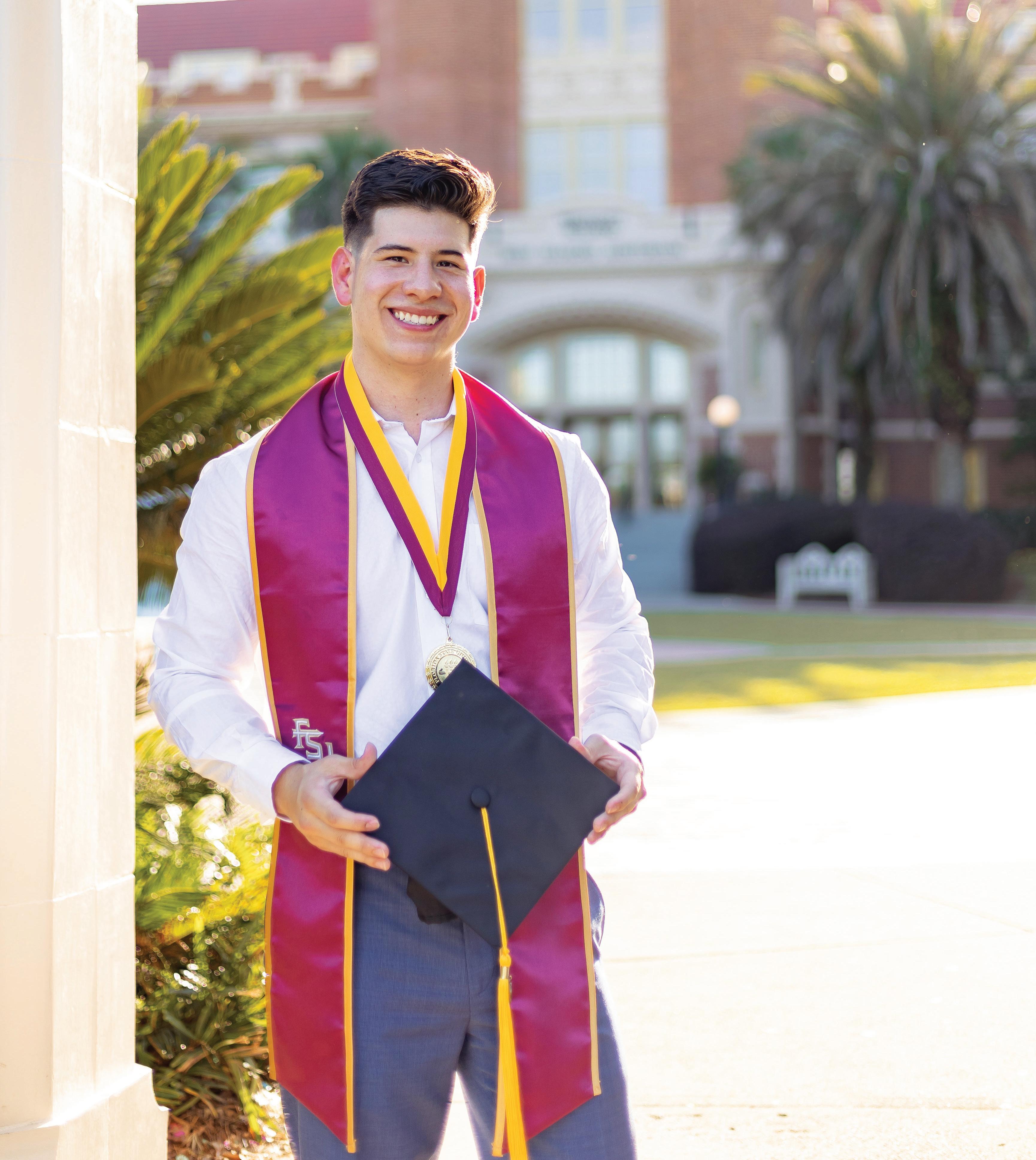
Daniel Zuniga (B.S. ’23), a recent Florida State University graduate who aims to practice medicine in underserved communities around the globe, has earned the prestigious accomplishment of being named a Rhodes Scholar finalist.
Zuniga interviewed for the world’s oldest and most celebrated international fellowship award, following a highly rigorous, months-long application process.
“Being selected as a Rhodes Scholarship finalist means that the work that I’ve done is recognized and is valued by people outside of my community,” Zuniga said.
While he was not one of the 32 U.S. college students selected for the Rhodes Scholarship in 2023, Zuniga said the honor was the culmination of all the work he had an opportunity to do as a scholar, a researcher, mentor and volunteer during his FSU career.
“Daniel really epitomizes the character of the undergraduate students that we have here at Florida State University,” said Craig Filar, associate dean for Undergraduate Studies and director of the Office of National Fellowships. “He is intellectually curious, and he is kind and compassionate and wants to give back to society. He’s very thoughtful in a very strategic way about how to find problems, solve problems and institute solutions to these problems. We really couldn’t ask for a better representative of our phenomenal student body than Daniel Zuniga.”
As a teenager, Zuniga moved with his family from Bucaramanga, Colombia, to Palm Beach Gardens, Florida. He said being named a Rhodes Scholar finalist is especially meaningful because of his personal experience as an immigrant,
including the challenges of learning English as a second language.
“It’s a long distance that I’ve had the chance to walk, and I’ve done a lot of personal growth,” said Zuniga, who graduated summa cum laude with a bachelor’s degree in cell and molecular neuroscience last May. “I appreciate having the opportunity to be a student in the United States.”
Zuniga plans to train as a physician and work with people who have challenges to accessing health care, such as those who are uninsured or from rural areas.
Growing up in Colombia, Zuniga saw his mother and father — who were both physicians at the time — caring for patients from an early age. When he was 13, he asked if he could go with them to work, sparking his interest in medicine.
Zuniga’s experiences have inspired him to be a physician who can connect, motivate and influence patients’ lives outside of a clinical setting. He also has an interest in bringing scientific research and biomedical innovation to underserved communities, especially outside of the U.S. where social inequality has a profound impact on health care.
At Florida State, Zuniga took full advantage of attending a top public research university, participating in research projects from synthetic biology, space medicine and neuroscience to education and population health. He continues to work with the Global Health Collaborative Project at the FSU College of Medicine, collaborating with Honduran physicians to gather and analyze data about gastrointestinal diseases in rural Honduras.
Zuniga also sought out service opportunities that would prepare him as a
leader in global health, such as working as a learning assistant at FSU and volunteering with USSTRIDE (Undergraduate Science Students Together Reaching Instructional Diversity and Excellence), part of the College of Medicine’s outreach and precollege programming.
“(Being a Rhodes finalist) is not only about my journey,” he said. “It’s about the fact that we don’t have a lot of representation of people that come from my background in a medical setting or the scientific community.”
Zuniga is grateful for the support and advice of his professors as well as administrators in the Office of National Fellowships who advised him in seeking out scholarship opportunities like the Rhodes.
“I learned about who I am as well and where I want to go,” he said. “The community at FSU is outstanding.”
Florida State has had a total of five Rhodes Scholars: Frederick William Buchholtz, 1905; Caroline Alexander, 1976; Garrett Johnson, 2006; Joe O’Shea, 2008; and Myron Rolle, 2009. In addition, FSU had Rhodes Scholar finalists in 2009, 2011, 2012, 2017 and 2018.
Rhodes Scholarships are fully funded, full time, postgraduate awards that enable talented young people from around the world to study at the University of Oxford. Created in 1902, they are the oldest and among the most distinguished international fellowship awards in the world. Scholars are selected based on academic achievements, character, leadership qualities and commitment to others.
LEARN MORE onf.fsu.edu
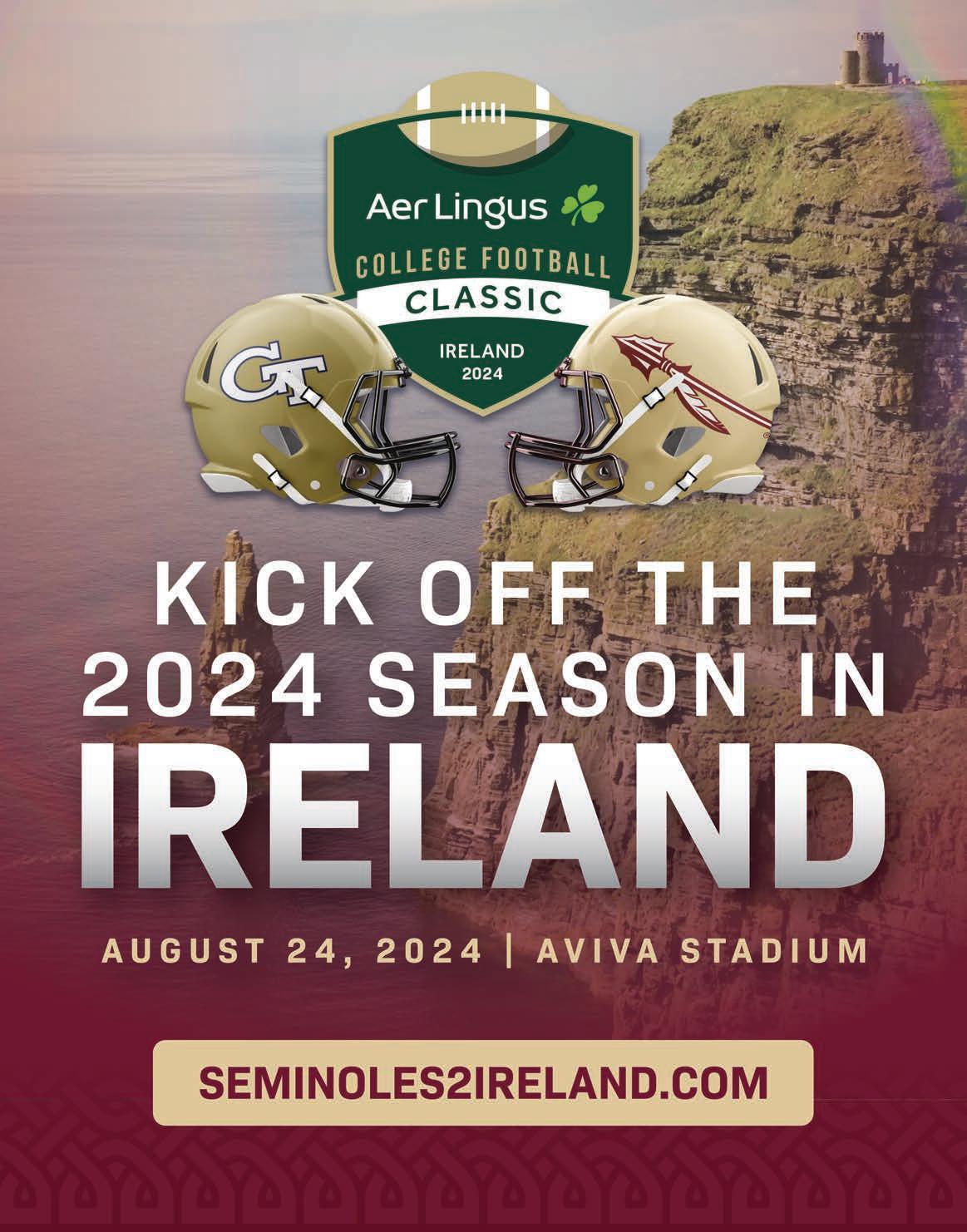
When the Florida State football team travels to Ireland this August to take on Georgia Tech in Dublin, the trip isn’t just about a football game — it’s about deepening connections between the university, the State of Florida and Ireland.
The Florida State Seminoles will face Georgia Tech on Saturday, Aug. 24, 2024, at the Aviva Stadium in Dublin, Ireland.
Last fall, a delegation from Ireland led by the Consul General of Ireland in Miami and the Lord Mayor of Dublin visited Florida State University to check out campus and discuss preparations for FSU’s appearance in the Aer Lingus College Football Classic.
The delegation included staff and leadership from the Aer Lingus College Football Steering Committee, Aer Lingus Airlines, multiple Irish corporate CEOs and executive leaders, Dublin local government administrators and Irish National Tourism leadership officials. The game is part of a larger mission to connect Ireland and the U.S.
“This visit reflects enduring friendship and the deep ties that bind our countries,” said FSU President Richard McCullough. “It’s also a testament to the power of sport and the way it brings people together, transcends borders and fosters understanding. This journey is a gateway to a world of possibilities, with the potential for collaboration on research projects, cultural exchanges and business opportunities.”
In 2022, Consulate General Sarah Kavanagh established the inaugural Consulate General of Ireland in Miami,
which represents Ireland in Florida, Alabama, Mississippi, Puerto Rico and the U.S. Virgin Islands. She noted the significance of this game to bolstering the relationship between Florida and Ireland.
“This game is more than a game,” Kavanagh said. “It’s going to be hugely important for Ireland and Florida’s relationship together. We’re working to strengthen our economic relationship, our political relationships, our cultural relationships and our people-to-people relationships and the game this year is going to be a fantastic microcosm of all that work.”
To kick off their five-day visit, the delegation visited the FSU Seminoles football practice to speak to Head Coach Mike Norvell. The visit was followed by a luncheon hosted by President Richard McCullough and First Lady Jai Vartikar.
During the second half of their day, the delegation was treated to a tour of FSU’s campus on their way to visit the Florida Capitol. They were joined by The Right Honourable Nigel Evans, member of Parliament for the Ribble Valley and deputy speaker of the House of Commons, who was visiting FSU as a guest lecturer and served on a moderated panel discussion about internship opportunities for students in British Parliament.
The Aer Lingus College Football Steering Committee had a meeting on campus followed by a luncheon with FSU leadership and deans at the Heritage Museum in Dodd Hall. The luncheon served as an opportunity to build connections and share ideas, as well as to
→ The Aer Lingus College Football Steering Committee met on campus to discuss business and operations ahead of the 2024 match between the Florida State Seminoles and the Georgia Tech Yellow Jackets.
highlight FSU’s values and commitments.
“This event is much more than a football game — it connects two nations and cultures with rich histories of resilience, innovation and collaboration,” said Provost Jim Clark.
The delegation then met with James M. Seneff Scholars from the College of Business, which was an opportunity to further develop connections between Ireland and FSU on a student level. The panel was selected from an elite honors program that helps students gain experience and knowledge through educational activities, volunteer experiences and networking activities.
On Saturday, the Irish Delegation had the opportunity to watch the Seminoles win in Doak S. Campbell Stadium.
“From what we’ve seen from the FSU community, we’re hoping the 2024 game just takes it up another notch. It’s such a privilege and an honor to be gameday zero of college football,” said Daithi De Roiste, the Lord Mayor of Dublin, Ireland.
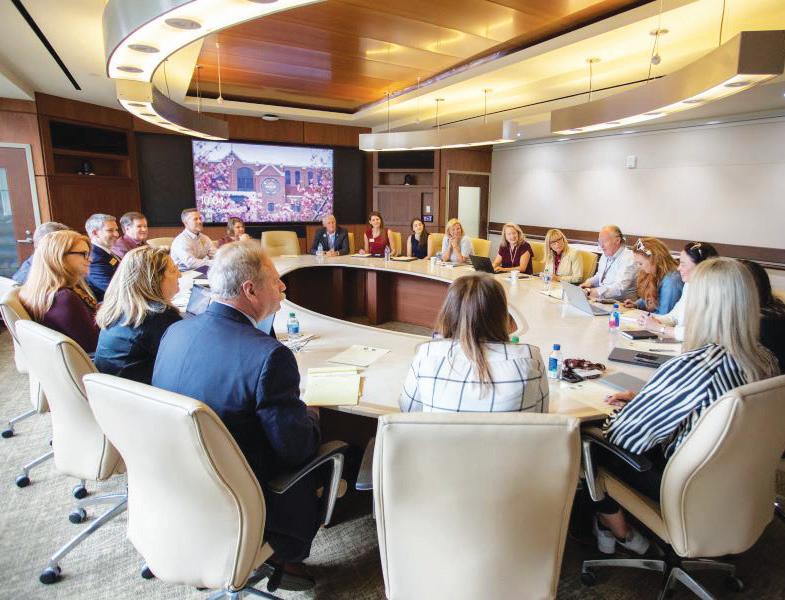
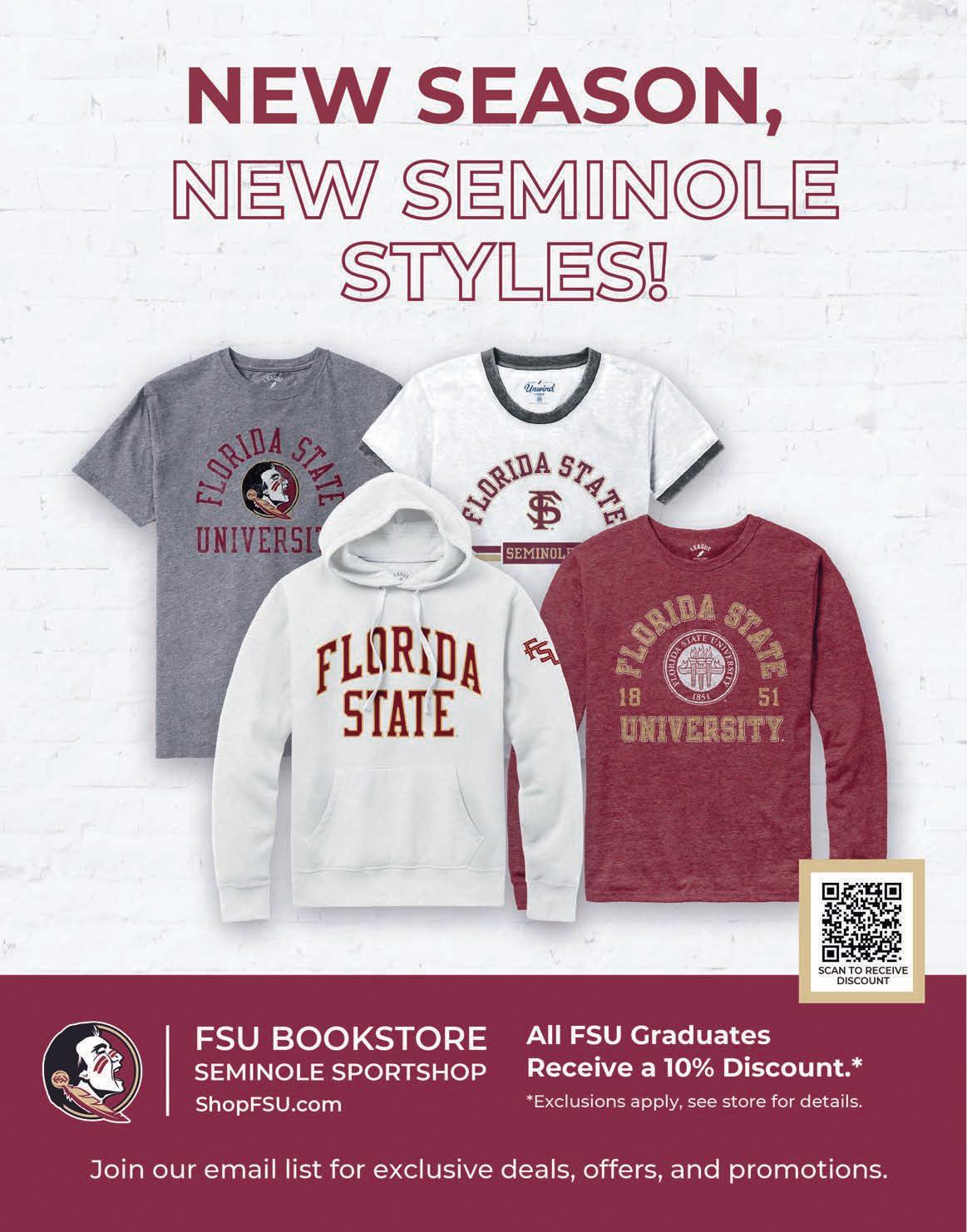
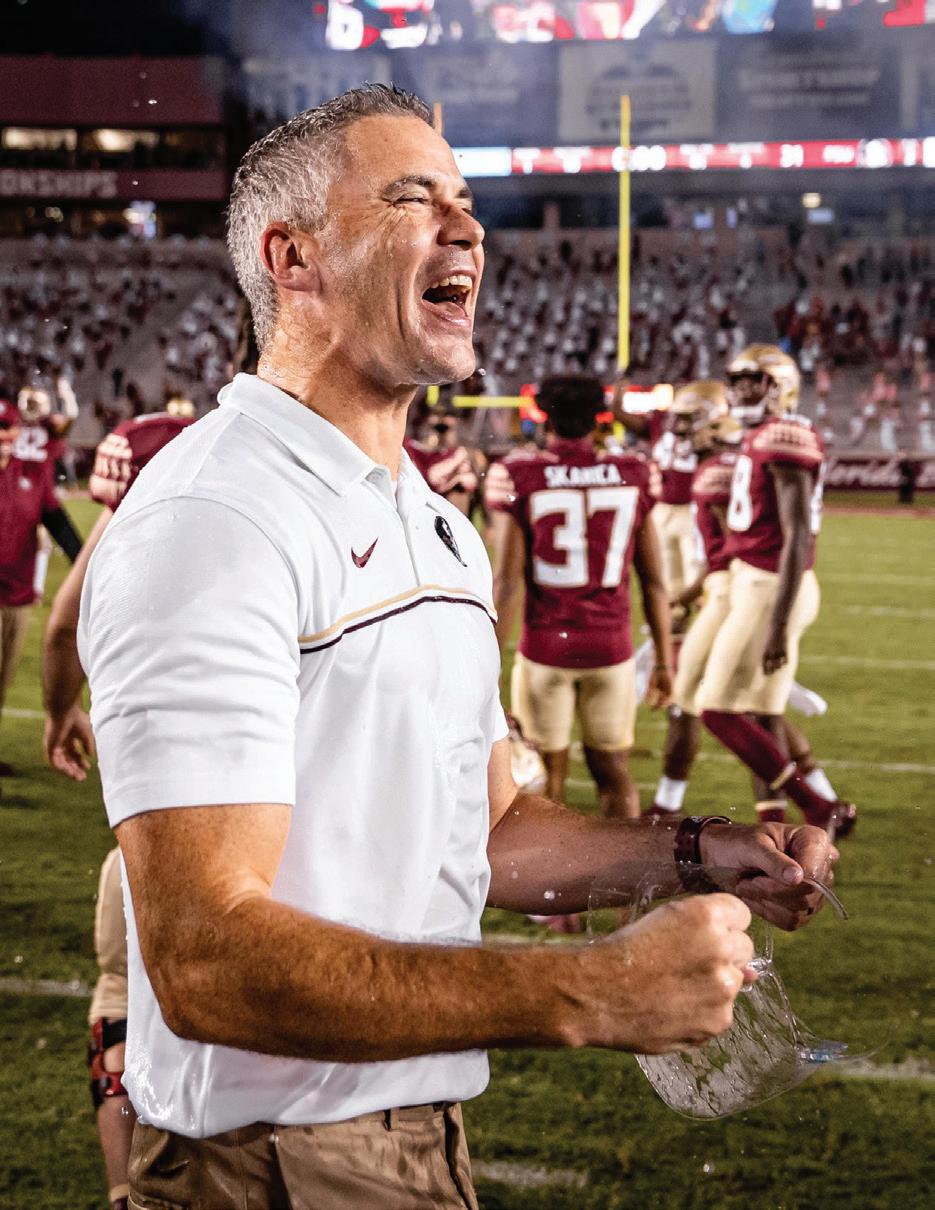
Florida State Football had an impressive season with its seventh undefeated regular season in program history, an ACC Championship Game win over No. 14 Louisville and a No. 4 ranking in the final regular season Associated Press poll before an appearance in the Capital One Orange Bowl.
Coach Mike Norvell had an impressive season as well. He became the eighth coach to win both the Dodd Trophy and Bear Bryant Award in the same season, earning each national Coach of the Year honor and being voted the 2023 ACC Coach of the Year and the AFCA Region 1 Coach of the Year. He was one of five finalists for the George Munger Coach of the Year Award presented by the Maxwell Football Club and one of 12 for the Eddie Robinson Coach of the Year Award.
In addition, Florida State quarterback Jordan Travis, FSU’s all-time leader in total offense and touchdowns, was voted the ACC’s Player of the Year and Offensive Player of the Year.
Looking forward, an exciting 2024 football season awaits. The Seminoles kick off the 2024 season against Georgia Tech on Aug. 24, 2024, at Aviva Stadium in Dublin, Ireland. @FSUFootball
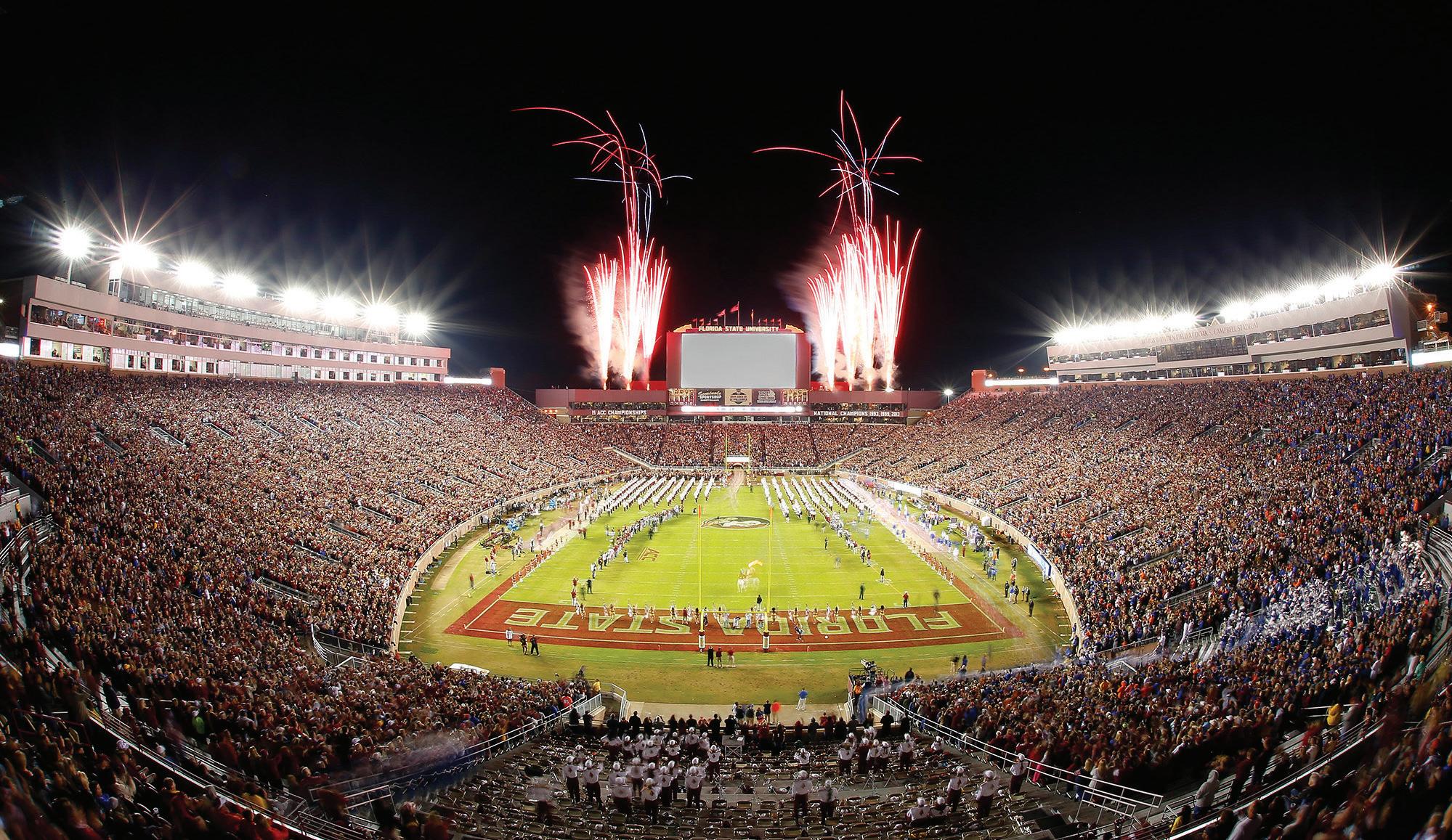
Top-ranked Florida State Soccer won 5-1 over No. 2 Stanford in front of a packed crowd at WakeMed Soccer Park in Cary, North Carolina, at the College Cup National Championship.

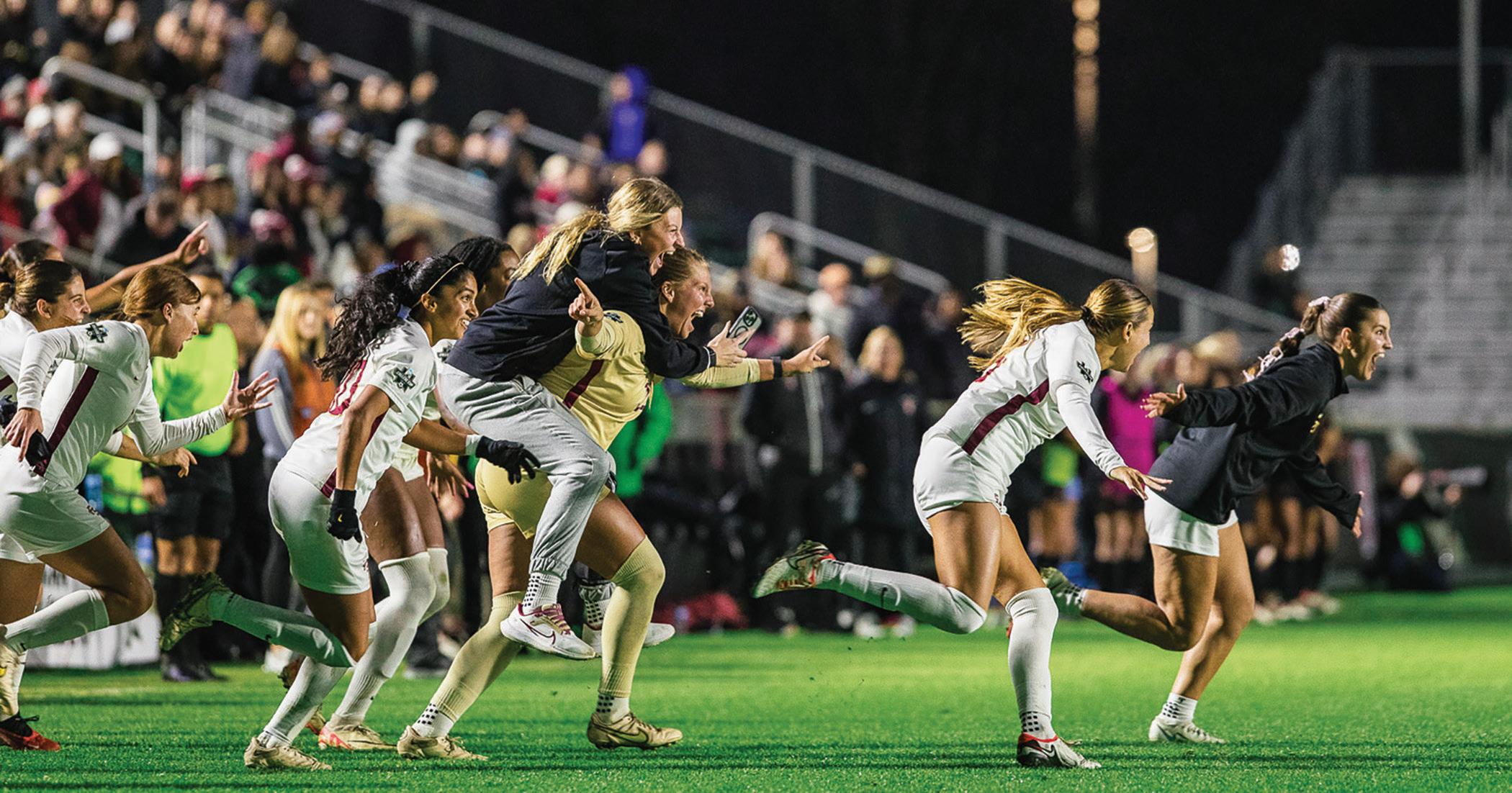
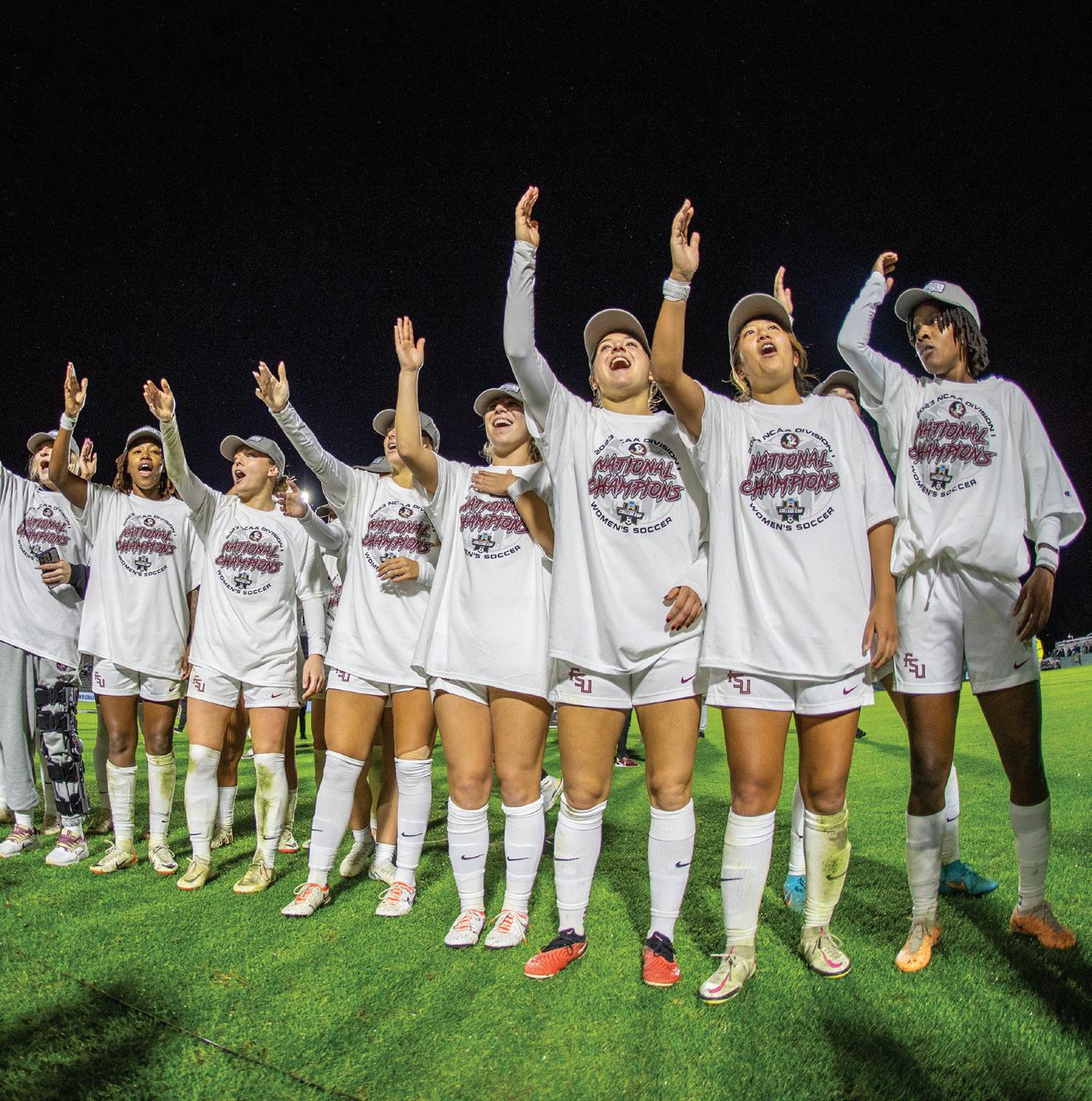

The Seminoles have won all four of their NCAA Soccer titles since 2014 — winning in 2014, 2018, 2021 and 2023 — four championships in a 10-year run. This championship win caps Florida State’s first undefeated season in program history and secures Florida State Athletics’ 19th national title, with soccer’s fourth being the most of any FSU program.
Players and alumni of the program are also bringing home accolades, with FSU forward Onyi Echegini securing FSU’s fourth MAC Hermann Trophy, the third-most of any program behind North Carolina and Stanford. Program alumni Leilanni Nesbeth (B.S. ’22), Lauren Flynn (B.S. ’23) and Cristina Roque (B.S. ’23) were selected in the 2024 National Women’s Soccer League Draft. This is the second consecutive season that FSU has had three or more picks in the NWSL Draft.
@nolesoccer @FSUSoccer
LEARN MORE Seminoles.com
GIVE TODAY gonol.es/Give2Athletics
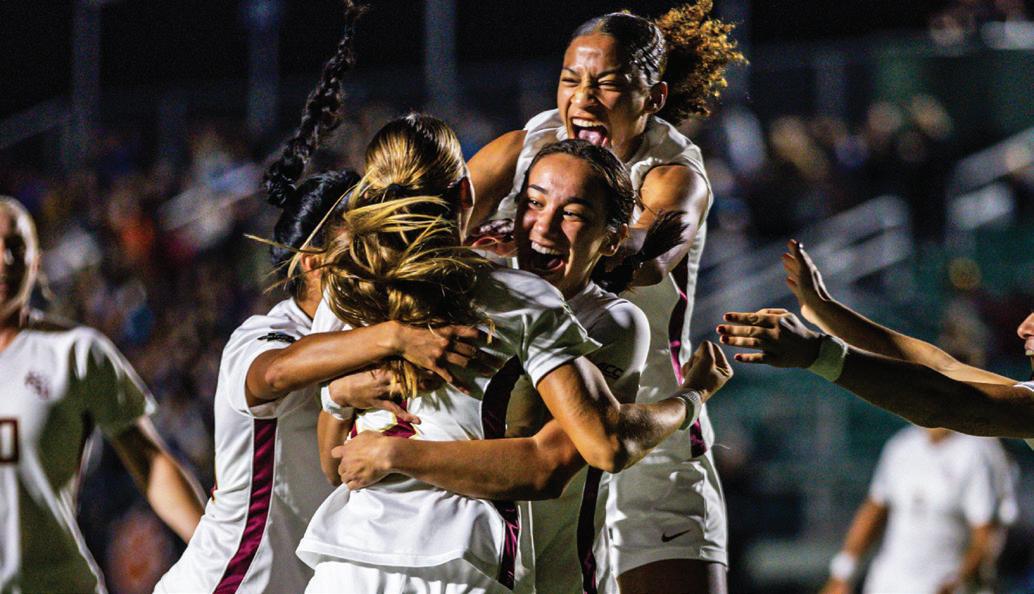



Pursuing greatness in sports inherently risks failure, but there are no alternative paths to success at the highest level. This is precisely what was on Brian Pensky’s mind in March 2022 when he was approached to take over one of the top women’s college soccer programs.
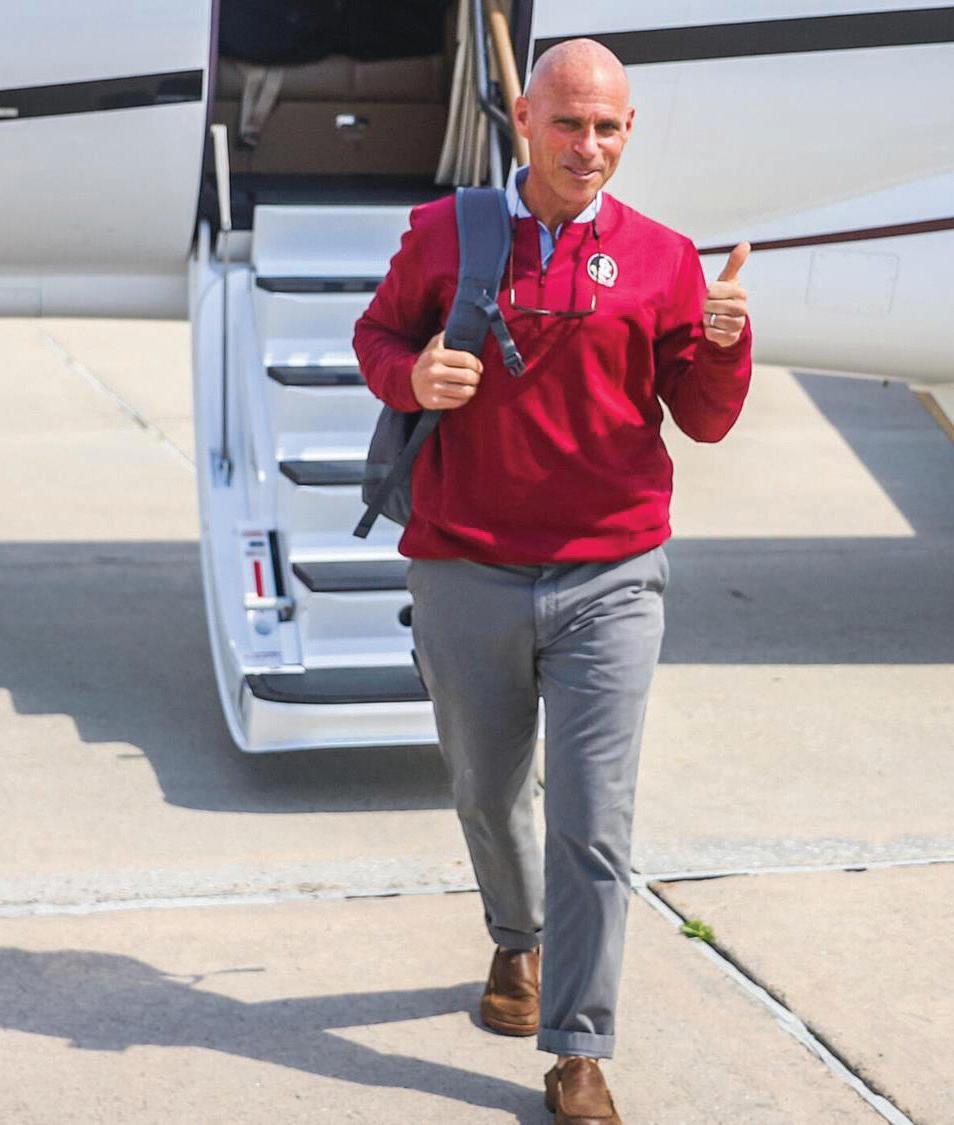
→ The FSU women’s soccer team celebrated their national title by lighting the Unconquered spear, which is reserved for FSU Football home games, national championships and other special occasions.
At the time, the Seminoles had been one of the best teams in the nation nearly every season for the better part of two decades and were coming off a National Championship. And Pensky? He was enjoying what could be considered a comfortable balance of expectations and success. He was the head coach at the University of Tennessee, having just led the Volunteers to the winningest season in program history.
Initially, Pensky wasn’t interested in leaving Knoxville for a new role with greater expectations. However, the more he thought about it, the more he realized he wanted the challenge to succeed at the highest level. Ultimately, he chose to take on the opportunity of a lifetime, embracing all the pressure and lofty standards that came with it.
“This program checked every box,” Pensky said. “I didn’t fear the risk, and I didn’t think about failing. I just worked.”
In his first season, Pensky took the Seminoles back to the College Cup for the 13th time in
program history with a 17-3-3 record, outscoring opponents 64-20 with 11 shutouts. For the third time in program history, the Noles won both the ACC Tournament Championship and the ACC Regular Season Championship.
FSU was selected as the number one overall seed in the 2022 NCAA Tournament for the 11th time in school history and shut out three of its first four opponents in the NCAA Tournament on the way to the College Cup. A challenging 3-1 loss in the quarterfinals to North Carolina served as a bitter end to what was otherwise an impressive season.
While the 2022 season would be considered a success at most schools, Pensky understood that the team fell short of the program’s lofty expectations.
“The standard here,” he said. “is winning a national championship.”
The team got off to a fast 10-0-1 start in 2023, hammering their first 11 opponents by 34 to 8. The top-ranked Noles hosted No. 11 Notre Dame on
October 12 in a game Pensky knew would serve as a barometer for players and the coaches.
“Even though we were ranked No. 1 at the time, our team wondered how truly good we were,” Pensky said. “Were we capable of being great?”
The Noles’ 4-1 victory left no doubt in anyone’s mind about the answer to that question.
“We smashed ’em,” Pensky recalled. “We out possessed ’em, out shot ’em and defended at a very high level. After that game, we were able to couple the talent and the determination with a belief. And that belief gave our players extreme confidence.”
That confidence allowed the team to put up gaudy numbers en route to a historic season. With the nation’s best offense, the Seminoles averaged 3.18 goals per game and outscored opponents 75-14, including a 21-1 differential in the NCAA Tournament. FSU finished its dominant postseason run with a 5-1
defeat of No. 2 Stanford in the title game. That victory capped off the greatest season in program history.
“I still don’t think it’s fully hit me,” he said. “The greatest emotion that night and the weeks after was relief that I didn’t let our team down, our players down.”
Off the field, Pensky says he appreciates that, despite being a large state university with national prominence, the environment in Tallahassee “feels like a real small family.”
“I’ve never been said hello to so many times in my life,” he said. “I don’t necessarily love the attention, but I love the fact that people care.”
Pensky’s first championship gives the university its 19th national title, with soccer’s fourth being the most of any FSU program.
“I know Florida State is a football school. However, there is a real element that feels like it’s also a soccer school,” Pensky said. “We sit on that front porch with football as a recognizable program.”
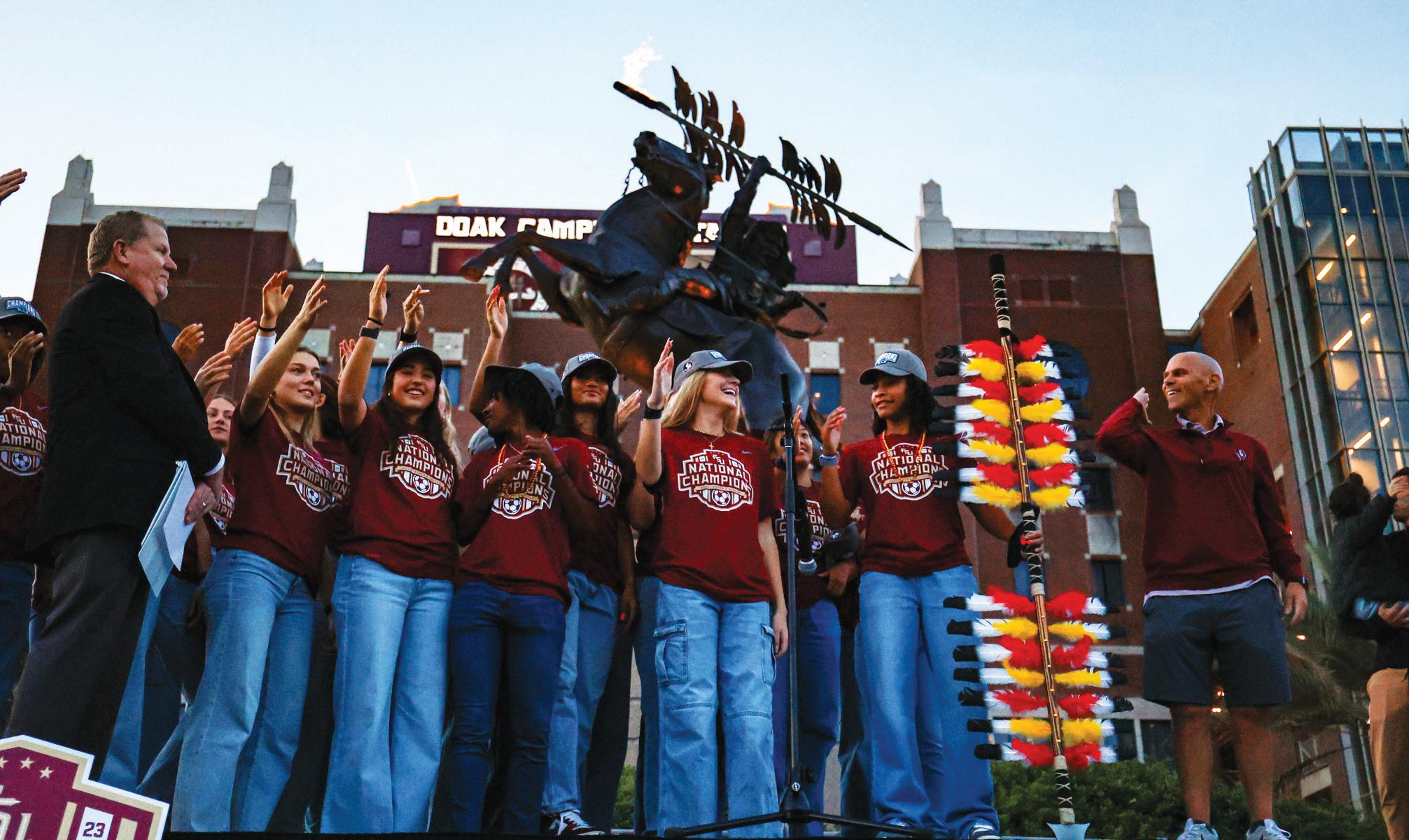
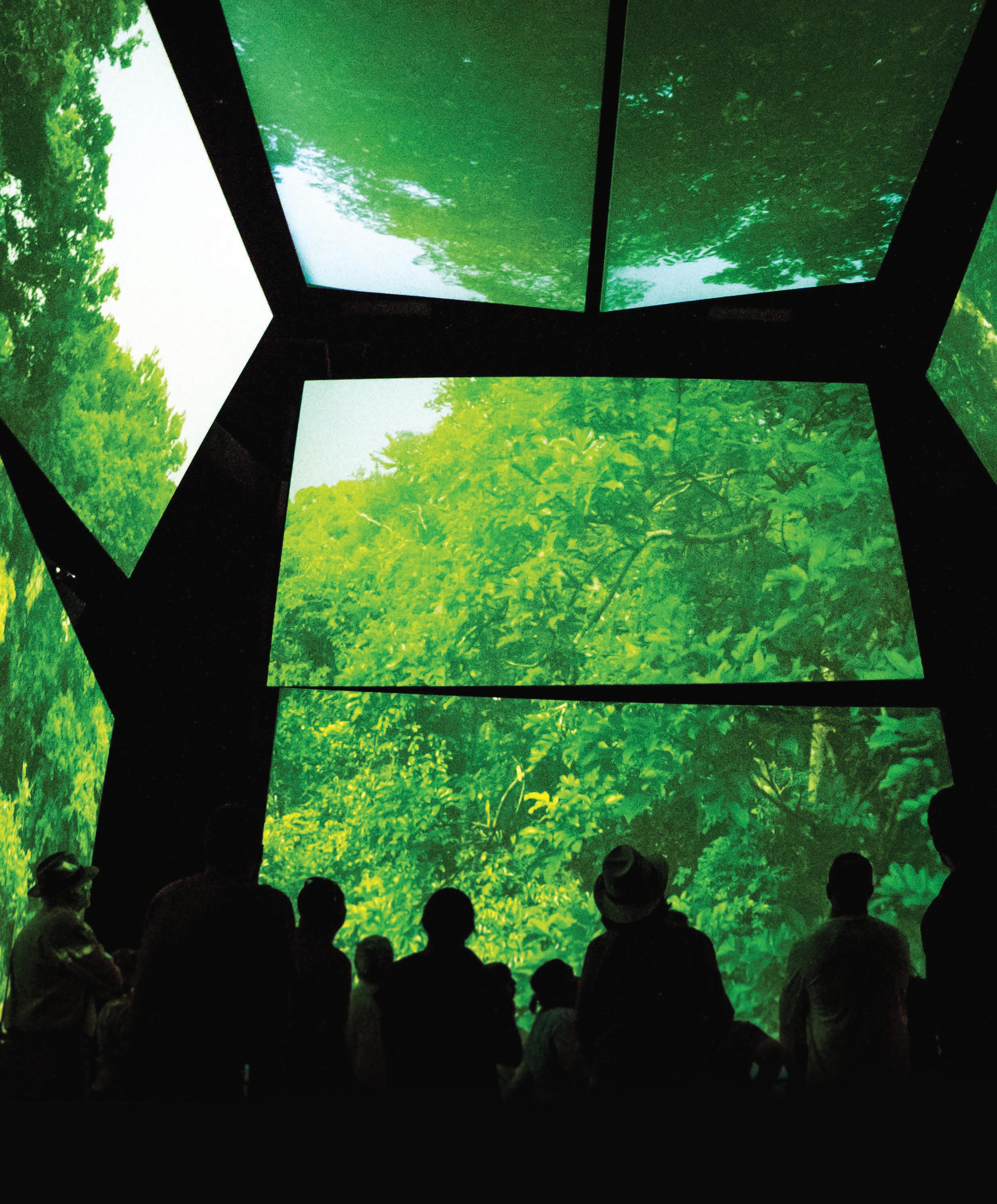
→ FSU-Panama students immerse themselves in the “Panamarama” gallery at the Biomuseo, a museum focused on the natural history of Panama located about 20 minutes from the FSU-Panama campus.


The history of FSU’s Republic of Panama Campus
By Kelsey Klopfenstein (B.A. ’18)Florida State University has a vibrant and fascinating history on the Isthmus of Panama that spans the course of over 60 years.
Originally created in 1957 to serve United States military families stationed in the Panama Canal Zone, FSU-Panama has transformed into a thriving international campus that brings together students from across the Americas and beyond. More than 30,000 U.S. and Latin American students have received a world-class education from FSU-Panama to date.
“You think about the Isthmus of Panama as being the last landmass that developed and linked North America and South America, creating literally a bridge between the two continents,” said FSU Provost Jim Clark, who traveled to FSU-Panama in December and delivered the commencement address to the FSU-Panama Class of 2023.
“I think that's powerful symbolically because it suggests that FSU-Panama has an extraordinary opportunity to build bridges intellectually, commercially, scientifically,” he said. “There's already wonderful research going on by some of our post-docs and faculty in the region, and my eyes have opened to the amazing things that we could do in the future at the Bridge of the Two Americas.”
Today, FSU-Panama is part of the Ciudad del Saber or City of Knowledge, a campus that turned the former U.S. Army Base Fort Clayton into a cluster of academic and research institutions and organizations. The conglomerate of more than 200 buildings is bordered on one side by the Panama Canal’s Miraflores locks, and on the other by Camino de Cruces National Park, a rainforest of incredible beauty and one of the most biologically diverse on the planet.
“It’s an incredible place,” said Carlos Langoni, rector of FSU-Panama, who was hired as an adjunct faculty member at FSU-Panama in 1987 and has served as rector, or president, of FSU-Panama since
→ Lawton Chiles, a U.S. senator from Florida who would go on to serve as governor of Florida, delivered the keynote address at the FSU Panama Canal Zone Branch commencement ceremony in 1972.
Photo courtesy FSU Libraries Special Collections & Archives.
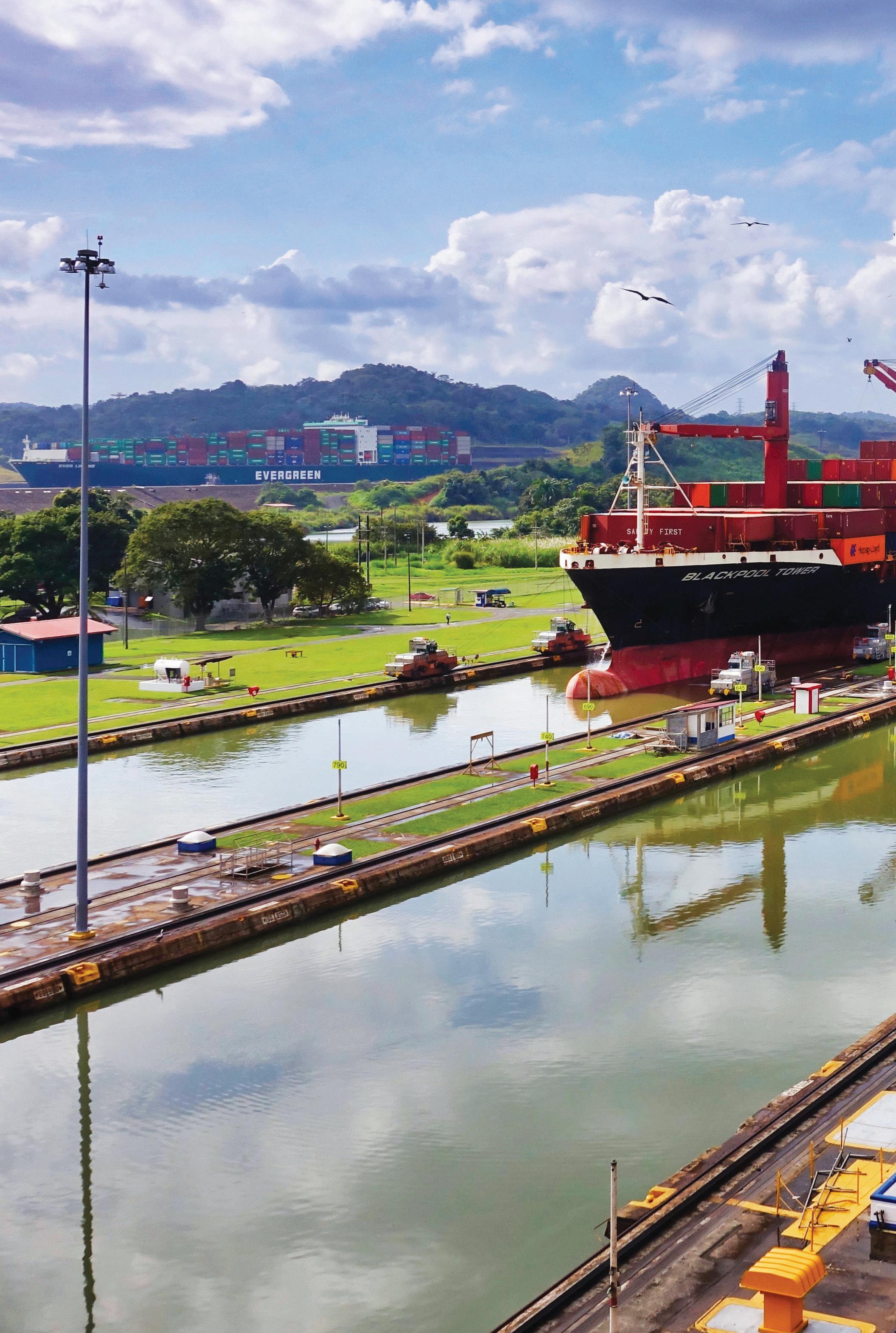

2004. “It’s unusual for a U.S. university to have a presence in a Latin American country. We’re building a bridge for these people that otherwise wouldn’t have access to an American-style education.”
As of fall 2023, 456 students were enrolled at FSU-Panama. At this location, the FSU-Panama library maintains the largest English language collection in the entire country. Students and faculty come together throughout the year through events such as cookouts and sports competitions, including the annual Ocean to Ocean Cayuco Race. Students compete in cayucos, Panamanian four-person racing canoes, from the Caribbean entrance of the Panama Canal to the Pacific side.
“This is a very exciting time for FSU-Panama,” said Louisa Blenman (M.S. ’94, MBA ’12), the associate director of International Programs. “We have long been an outstanding teaching institution, and there is renewed enthusiasm in our well-established branch campus. We have an opportunity to build on the solid foundation of FSU-Panama, drawing on our stellar reputation, enhancing already strong relationships, and establishing new and innovative collaborations among U.S. and Panamanian faculty.”
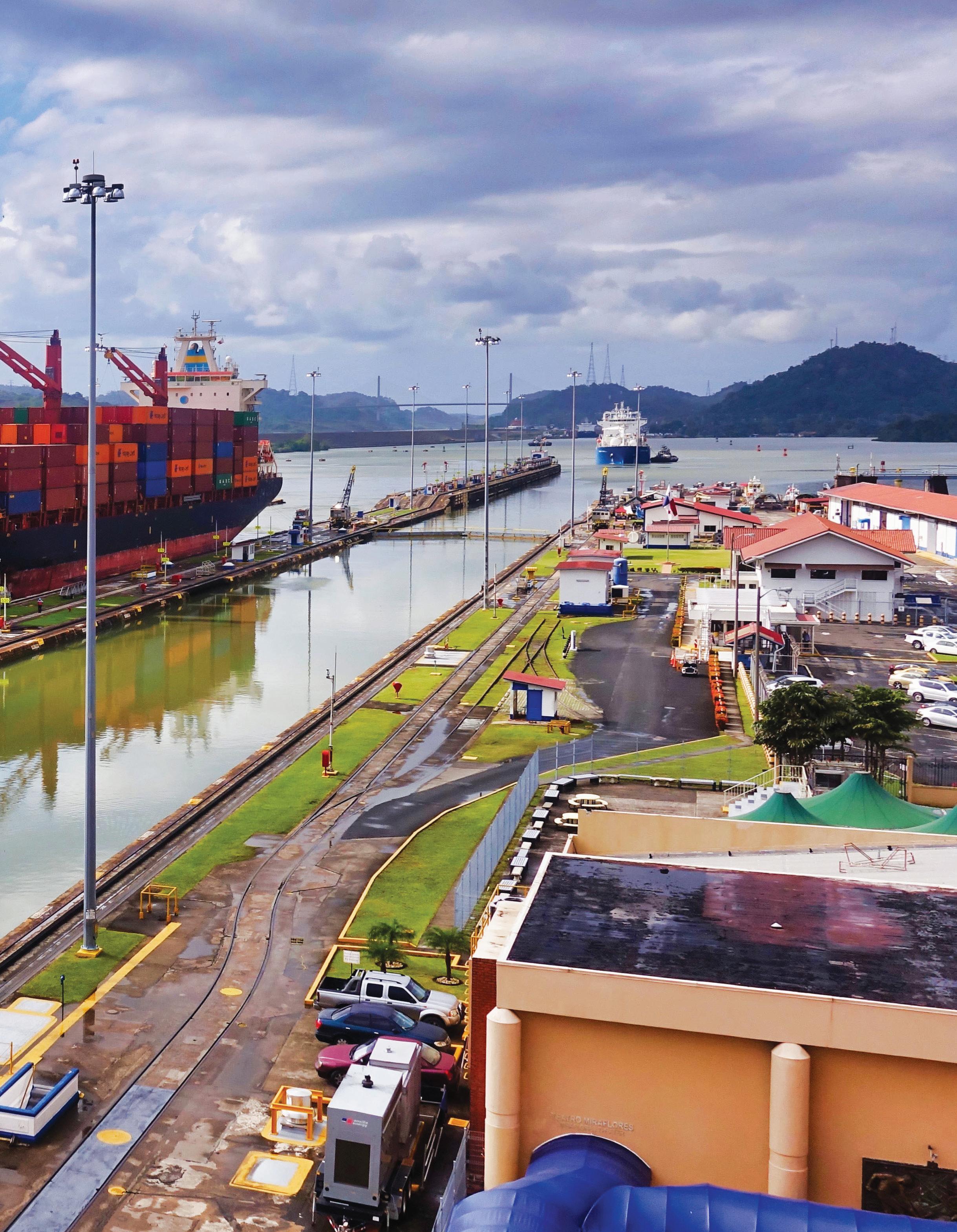
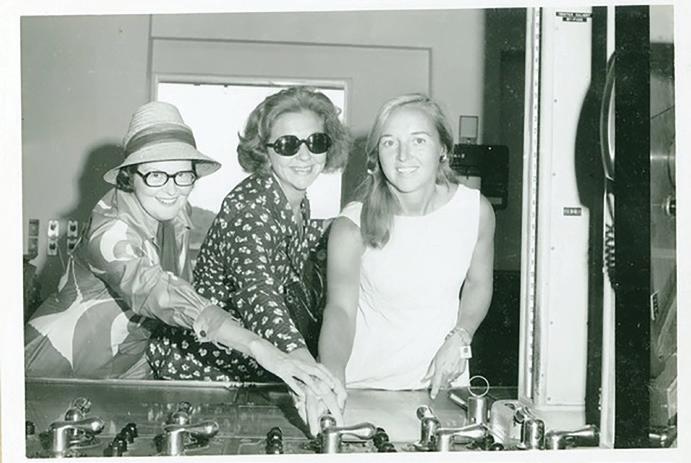
The story of FSU-Panama is doused in rich and incredible history.
Panama is the southernmost country in Central America, a sliver of land connecting two continents. The U.S. developed a fulltime presence there in 1904 after taking over construction of the Panama Canal from the French.
One of the largest and most difficult engineering projects ever undertaken, the Panama Canal is an artificial 51-mile waterway that connects the Atlantic Ocean with the Pacific Ocean by cutting across the Isthmus of Panama.
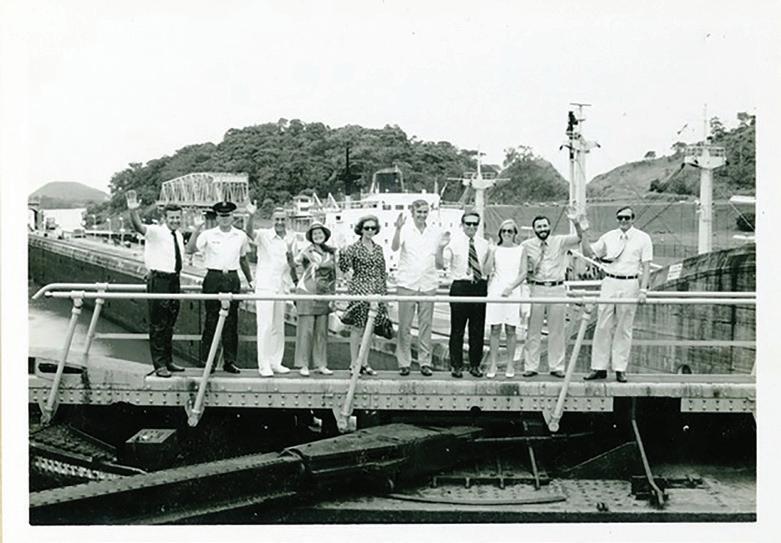
After World War II, the U.S. Army wanted to provide an undergraduate education to “Zonians,” U.S. Department of Defense personnel and their families living in the Panama Canal Zone, an official U.S. territory parallel to the Canal. This led to a contractual agreement that established the FSU Panama Canal Branch in January 1957.
During its first decade, the FSU Panama Canal Zone Branch only offered a menu of courses, and students were required to finish at the university’s main campus in Tallahassee. In 1967, FSU-Panama became a degree-granting branch of the university with majors in English, inter-American studies, international affairs, social science and Spanish. Air Force Sgt. Wilbur Ensey
← Inset: In 1972, a delegation from Florida State University visited the FSU Panama Canal Zone Branch in the Republic of Panama and took a tour of the Panama Canal. The delegation included thenFSU President J. Stanley Marshall, his wife, Shirley Marshall and Robert Coyne, then-director of FSU College Programs (now FSU International Programs). U.S. Senator Lawton Chiles was also on the trip and served as the keynote speaker at the 1972 FSU Panama Canal Zone Branch commencement ceremony.
Photos courtesy of FSU Libraries Special Collections & Archives.
became the first graduate of FSU-Panama when he received his diploma June 6, 1968.
The second-oldest university in the country, FSU-Panama initially only opened to U.S. citizens since classes took place inside U.S. military facilities. This changed after the Flag Incident in 1964, when a riot broke out between Panamanian students, Canal Zone officers and residents after a Panamanian flag was torn. About 22 Panamanians and four U.S. soldiers were killed during the conflict.
To improve relations between Panamanians and U.S. citizens, the FSU Canal Zone Branch opened its doors to non-U.S. students in 1967.
“If American and Panamanian students sit next to each other in a classroom they will see that they are not bad people after all, and good personal relationships are likely to grow,” said Robert Coyne, former director of FSU College Programs (now FSU International Programs), on how to improve relations between Panamanians and U.S. citizens.
Fast forward to today, over half of FSUPanama's diverse student body is Panamanian or from elsewhere in Latin America.
“Over the years, Florida State has provided the opportunity for a multitude of Latin American and Caribbean students, including Panamanians, to have a U.S. education experience through FSU,” said Jim Pitts, director of FSU International Programs. “Many of those students have gone on to positions of influence in Panama and the program has contributed to international relations between Florida and Latin America.”
The FSU-Panama campus also gives students from the main Tallahassee campus the opportunity to study abroad in the Republic of Panama. In 2000, the first group of students from International Programs arrived to study in Panama. Since then, 842 students have studied abroad at the campus.
In 1972, then-FSU President Stanley Marshall traveled with a delegation including then-U.S. Sen. Lawton Chiles to the FSU Panama Canal
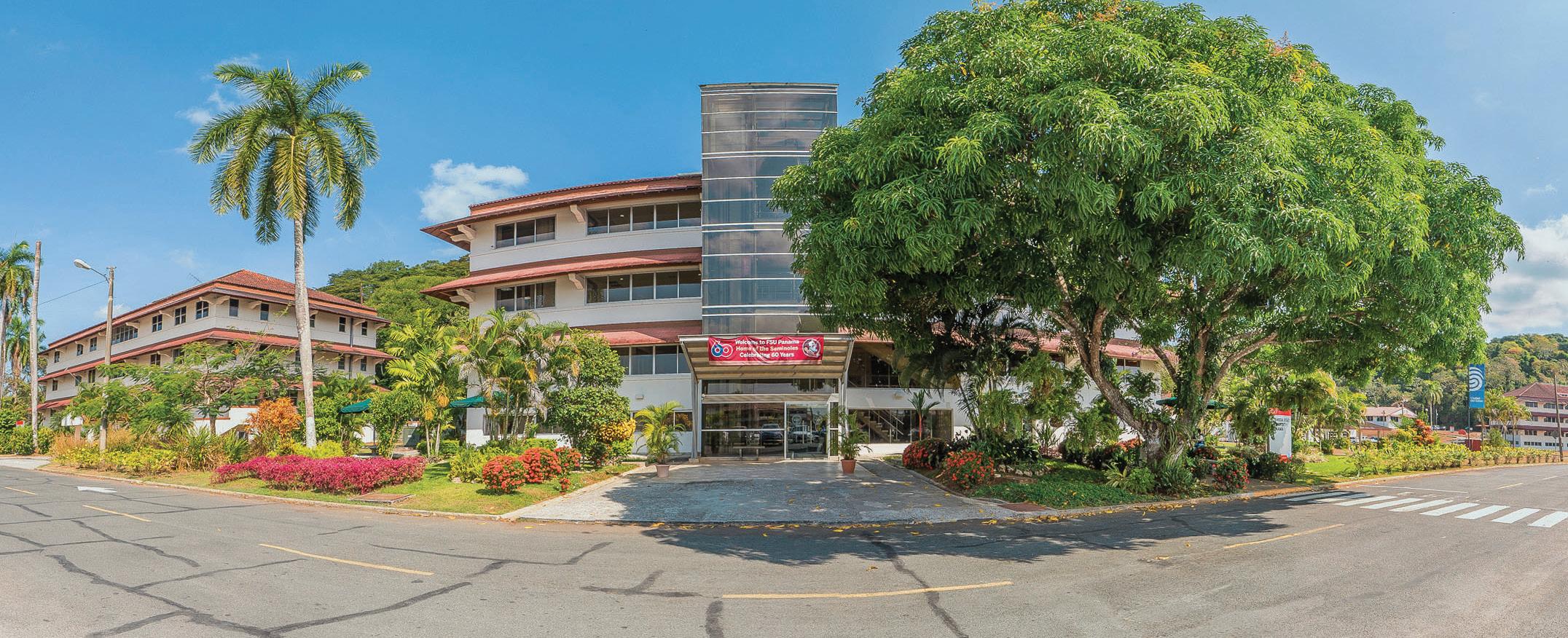
↑ FSU-Panama moved to its current location in the City of Knowledge in 2009. Its library hosts the country’s most extensive English language collection.
Photos courtesy FSU-Panama, Pedro Ahues.
Zone Branch. The group attended FSUPanama’s commencement ceremony, where Chiles, who later became Florida’s governor, was the main speaker.
Bertha Brown, the first student of the FSU Canal Zone Branch to graduate magna cum laude, delivered the valedictorian speech at that 1972 ceremony. Brown earned her degree in social sciences in 12 years while mostly working full-time. She went on to have a 23-year career in the Canal Zone.
In 1977, the U.S. signed the Torrijos-Carter Treaties that would give the Republic of Panama control of the Canal after 1999. On Dec. 31, 1999, the U.S. relinquished control of the Panama Canal and all areas in the former Panama Canal Zone.
“When the control of the Panama Canal was returned to Panama in 2000, FSU made a conscious decision to stay in the area so
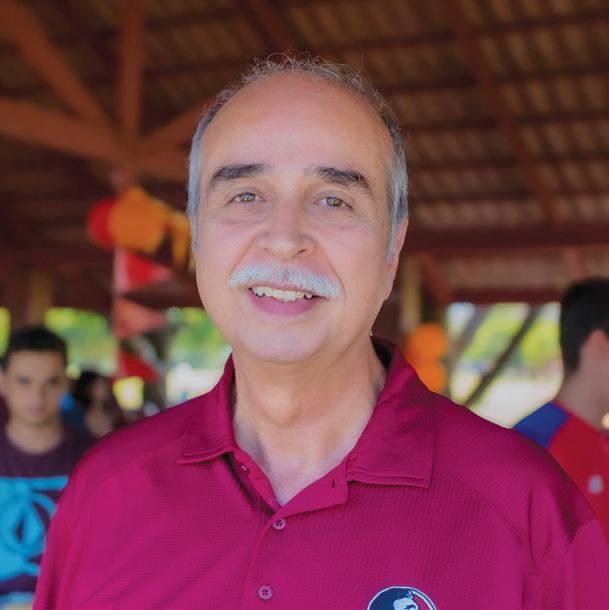
that we could continue our relationship with Panama,” Pitts said. “We see the campus as a gateway for Latin American and Caribbean students to come to Florida State University, either by completing a program at FSUPanama, or participating in the 2+2 program in Panama and Tallahassee.”
The “2+2” scholarship program allows students of a Latin American or Caribbean country enrolled at FSU-Panama to take up to two years of undergraduate studies at FSU’s main campus in Tallahassee for the price of in-state tuition. Since it was established in 2001, 1,236 students have taken advantage of this opportunity, which saves them an estimated $15,000 annually.
With the transfer of power, the U.S. military also transferred nearly 370,000 acres and some 7,000 buildings to the Panamanian government. This acquisition spearheaded an initiative that transformed the former U.S. Army base Fort Clayton
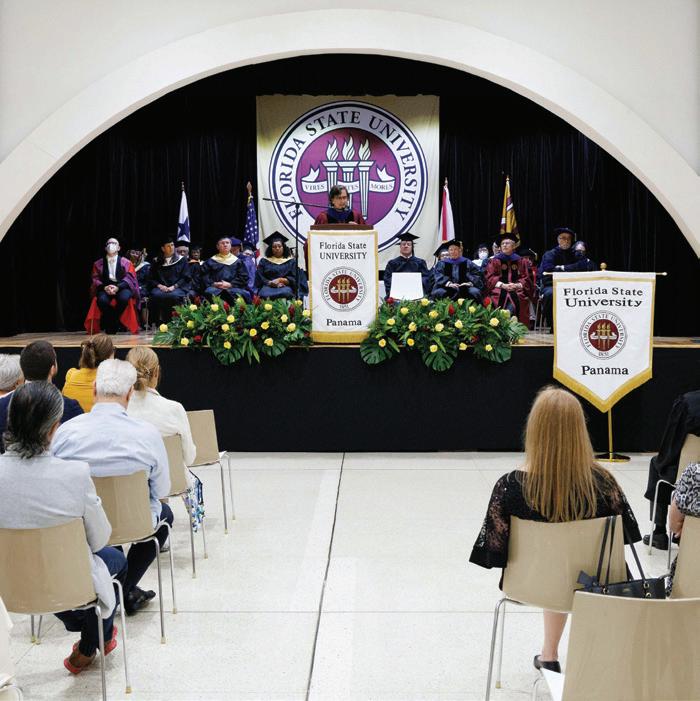
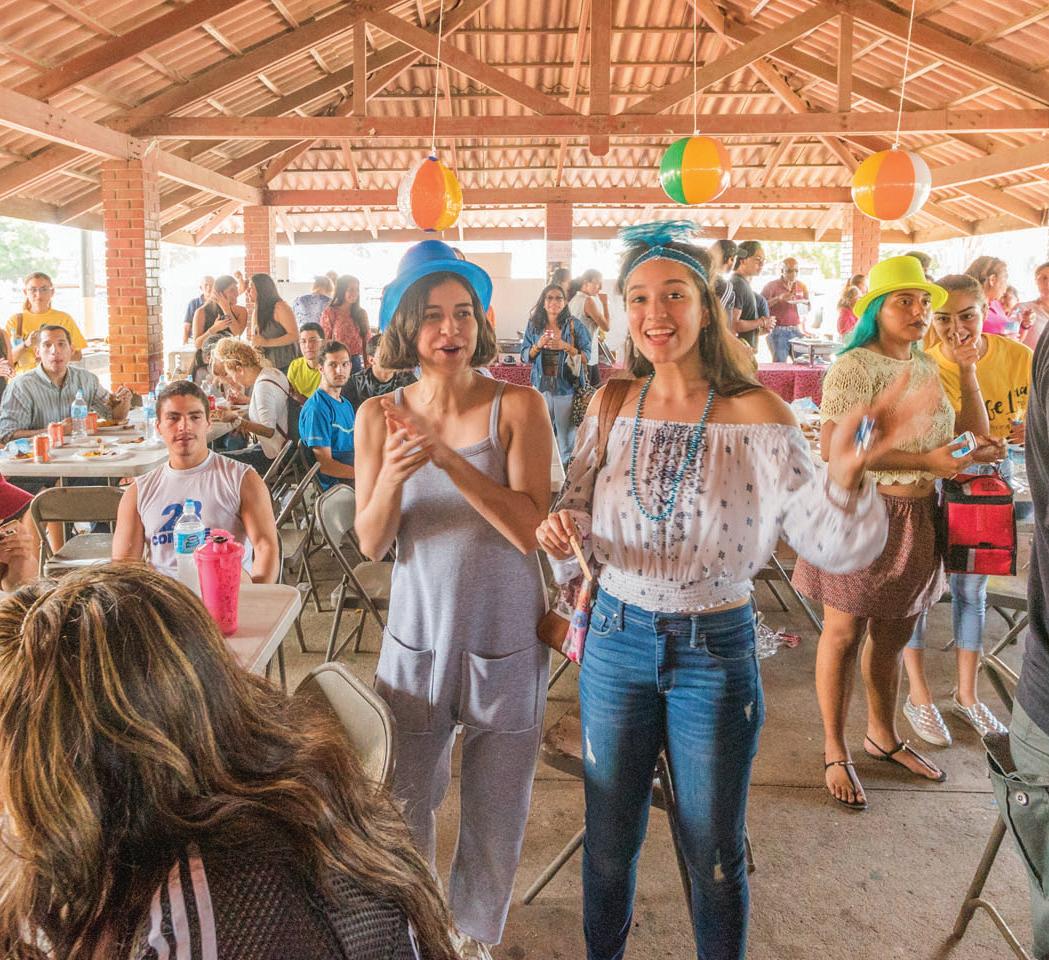
We’re building a bridge for people who otherwise wouldn’t have access to an American education.Carlos Langoni, rector of FSU-Panama
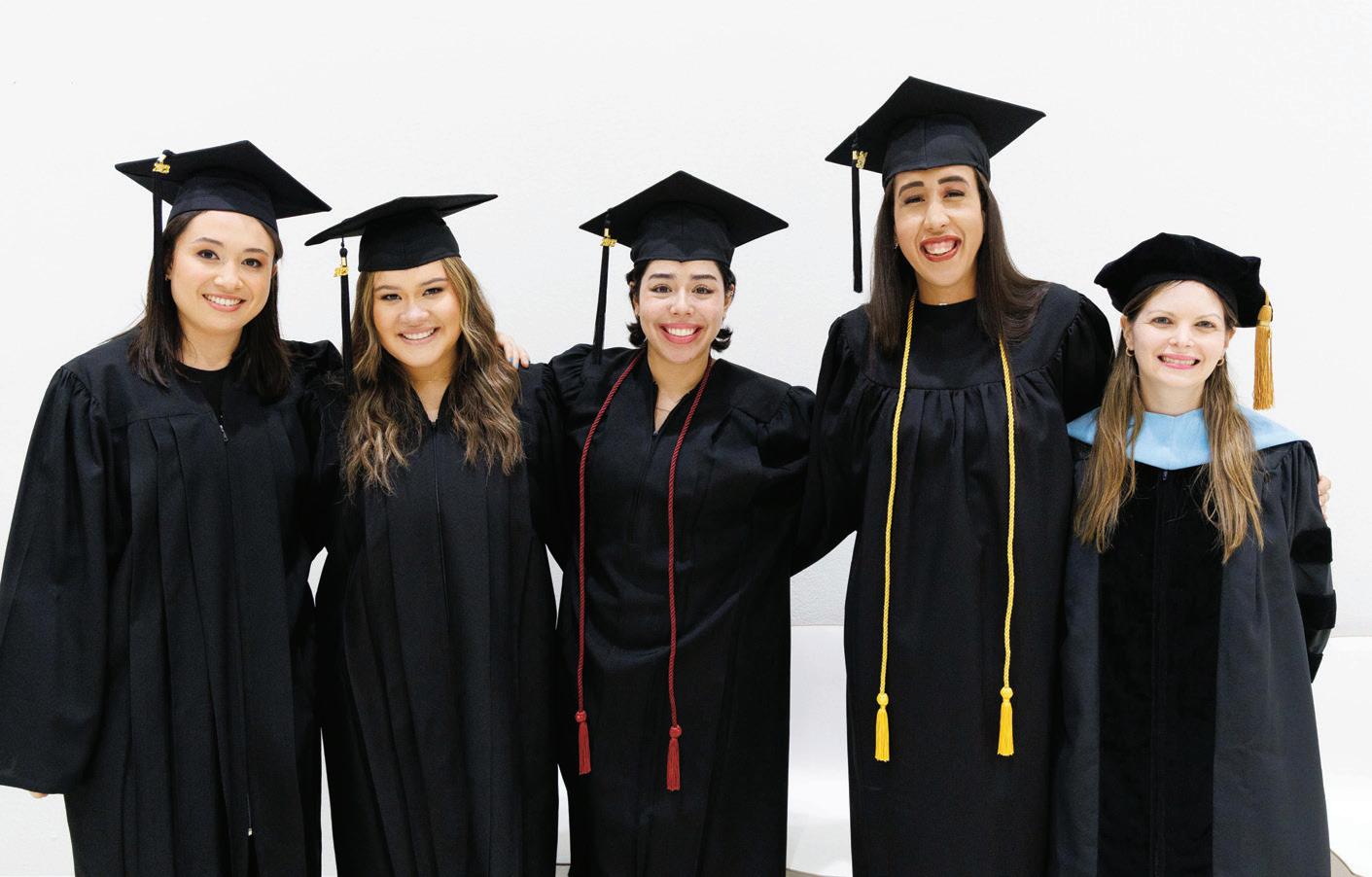

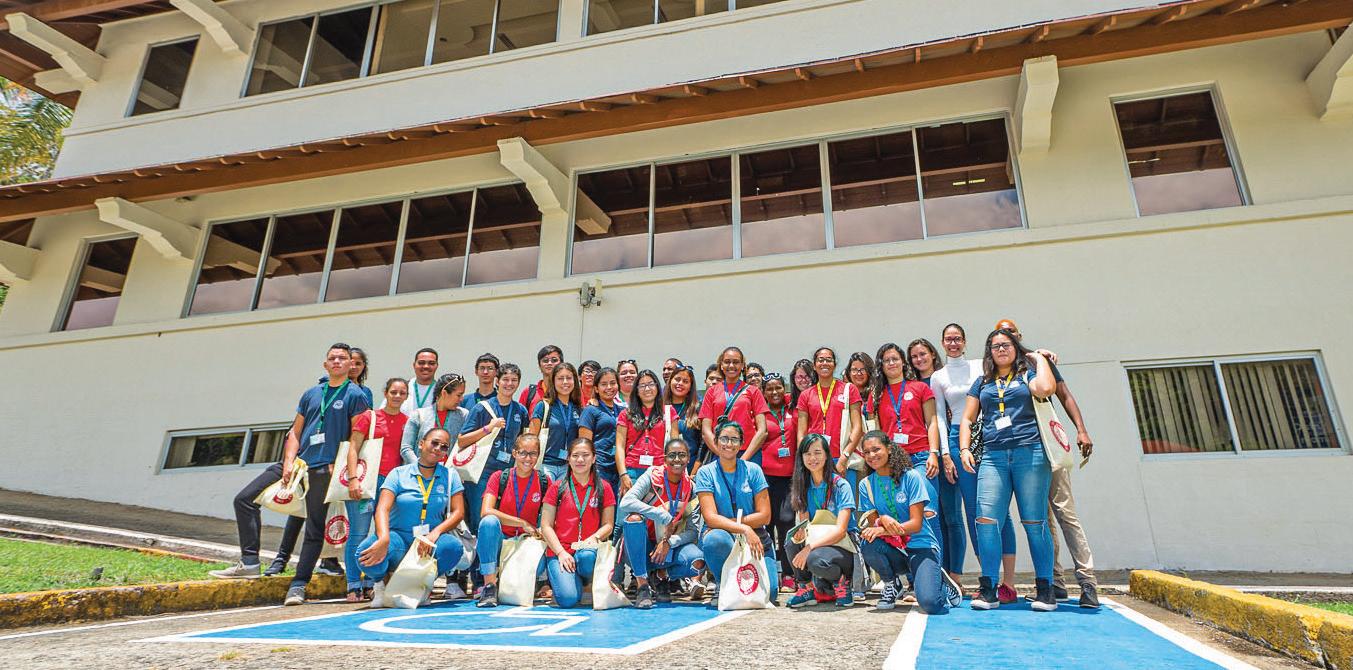
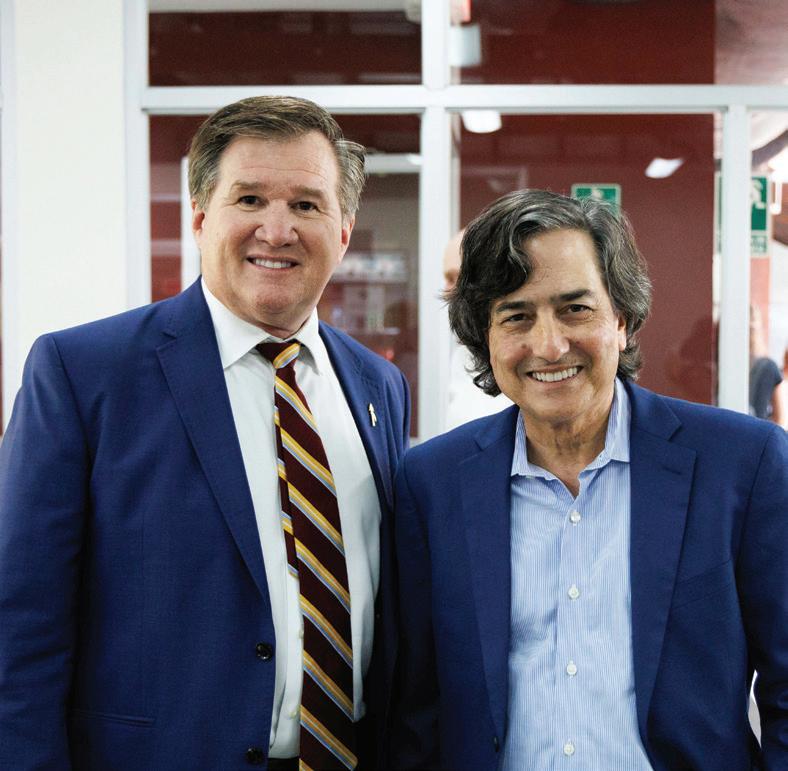
↑ FSU Senior Vice Provost, Chief (Academic) Strategy Officer and Institutional Data Administrator Rick Burnette, with FSU Provost and Executive Vice President for Academic Affairs Jim Clark, during a visit to FSU-Panama in December 2023. Photos courtesy FSUPanama, Pedro Ahues.
into a hub for innovation and education known as the City of Knowledge. The former army base is now a booming international community established for business, academic, scientific and humanistic collaboration.
As a founding member of the City of Knowledge, FSUPanama is located on its campus alongside other affiliates, including UNICEF's regional headquarters, the Red Cross, the U.S. Peace Corps, the United Nations Development Programme regional office for Latin America and the Caribbean, and the World Food Program.
Most students eventually transfer to Tallahassee through the “2+2” scholarship program, but FSU-Panama does offer one master’s degree (international affairs) and five undergraduate degrees (international affairs, computer science, Latin American and Caribbean studies, social science, and environment and society).
“People care here,” said Giselle Maggiorani, a current sophomore at FSU-Panama who will transfer to Tallahassee in fall 2024 as part of the 2+2 program. “They have the best intentions, and they care about doing an amazing job. I feel like I am getting a wonderful education.”
Provost Clark said his trip to FSU-Panama gave him a better understanding of the campus and sparked new ideas for the future.
“What we have to think about over the next decade is Florida State University as a global institution,” Clark said. “We love our place in Tallahassee. But when we think about being distributed throughout the state of Florida, like in our College of Medicine and many other activities in our university, in the same way we must think of ourselves as being present in many parts of the world with very diverse cultures, languages and educational traditions. We have a great opportunity right now to think about the future.”
1957
Florida State University establishes the FSU Panama Canal Zone Branch through a contractual agreement with the U.S. Armed Forces to provide an education to its members. Offices were located in what was then the U.S. Army Fort Clayton.
1964
A riot breaks out between Panamanian students, Canal Zone officers and residents after a Panamanian flag is torn. The Flag Incident results in about 22 Panamanians and four U.S. soldiers dead.
1967
The FSU Panama Canal Zone Branch becomes a degree-granting institution, offering majors in English, interAmerican studies, international affairs, social science and Spanish. Permanent residents of the Isthmus of Panama begin enrolling at the campus.
1968
Air Force Sgt. Wilbur Ensey becomes the first graduate of the FSU Panama Canal Zone Branch when he receives his diploma June 6, 1968.
1972
Then-FSU President Stanley Marshall travels to the FSU Canal Zone Branch with a delegation from Florida including U.S. Senator Lawton Chiles. Bertha Brown becomes the first student to graduate magna cum laude from the FSU Panama Canal Zone Branch. Chiles delivered the commencement address.
1977
U.S. signs the Torrijos-Carter Treaties that would give the Republic of Panama control of the Canal after 1999.
FSU-Panama bestows an honorary doctorate of laws to then-President of Panama Ricardo de la Espriella.
U.S. invades the Republic of Panama and ousts military dictator Gen. Manuel Noriega. FSU-Panama begins offering a computer science program.
The government of Panama grants Robert Coyne, then-director of FSU College Programs (now FSU International Programs), the “Order of Vasco Nunez de Balboa.” This is the country’s highest award for distinguished services in arts and education, and therefore recognizes FSU’s contributions to the education of Panama’s citizens.
U.S. officially turns control of the Canal over to the Republic of Panama. Leaving nearly 370,000 acres and some 7,000 buildings previously owned by the U.S. government vacant, the City of Knowledge (Ciudad del Saber) was established that same year to turn the former U.S. Army Base Fort Clayton into a hub for innovation and education.
FSU-Panama is a founding member of the City of Knowledge.
First group of students arrives to study abroad at FSU-Panama through FSU International Programs.
FSU-Panama establishes the 2+2 scholarship program, which allows students of a Latin American or Caribbean country enrolled at FSUPanama to take up to two years of undergraduate studies at FSU’s main campus in Tallahassee for the
price of in-state tuition. FSU-Panama also begins offering an environmental studies degree program.
The FSU-Panama Foundation is formally constituted.
2009
FSU-Panama moves to its current location in the City of Knowledge.
2014
FSU-Panama is formally authorized to offer a master’s degree in international affairs.
2017
FSU-Panama celebrates 60 years of a continued presence on the Isthmus of Panama.
2023
FSU Provost and Executive Vice President for Academic Affairs Jim Clark delivers the commencement address at FSU-Panama’s graduation ceremony in December.
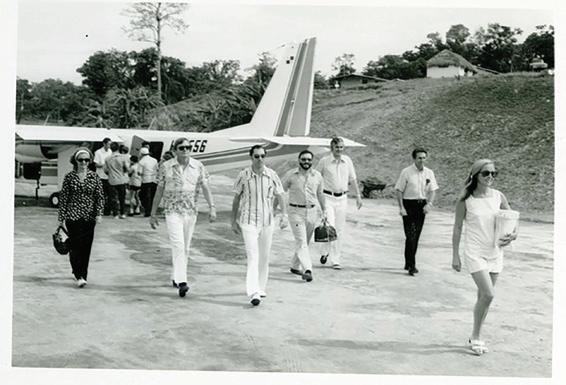

↑ A delegation from Florida State University steps off the plane during a visit to the FSU Panama Canal Zone Branch in 1972. The delegation, which included then-FSU President J. Stanley Marshall, his wife, Shirley Marshall, Robert Coyne, then-director of FSU College Programs (now FSU International Programs), and U.S. Senator Lawton Chiles, visited facilities and took a tour of the Panama Canal during their visit. Photos courtesy FSU Libraries Special Collections and Archives.
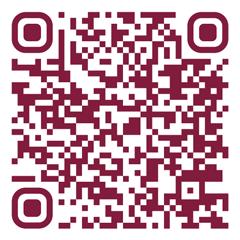
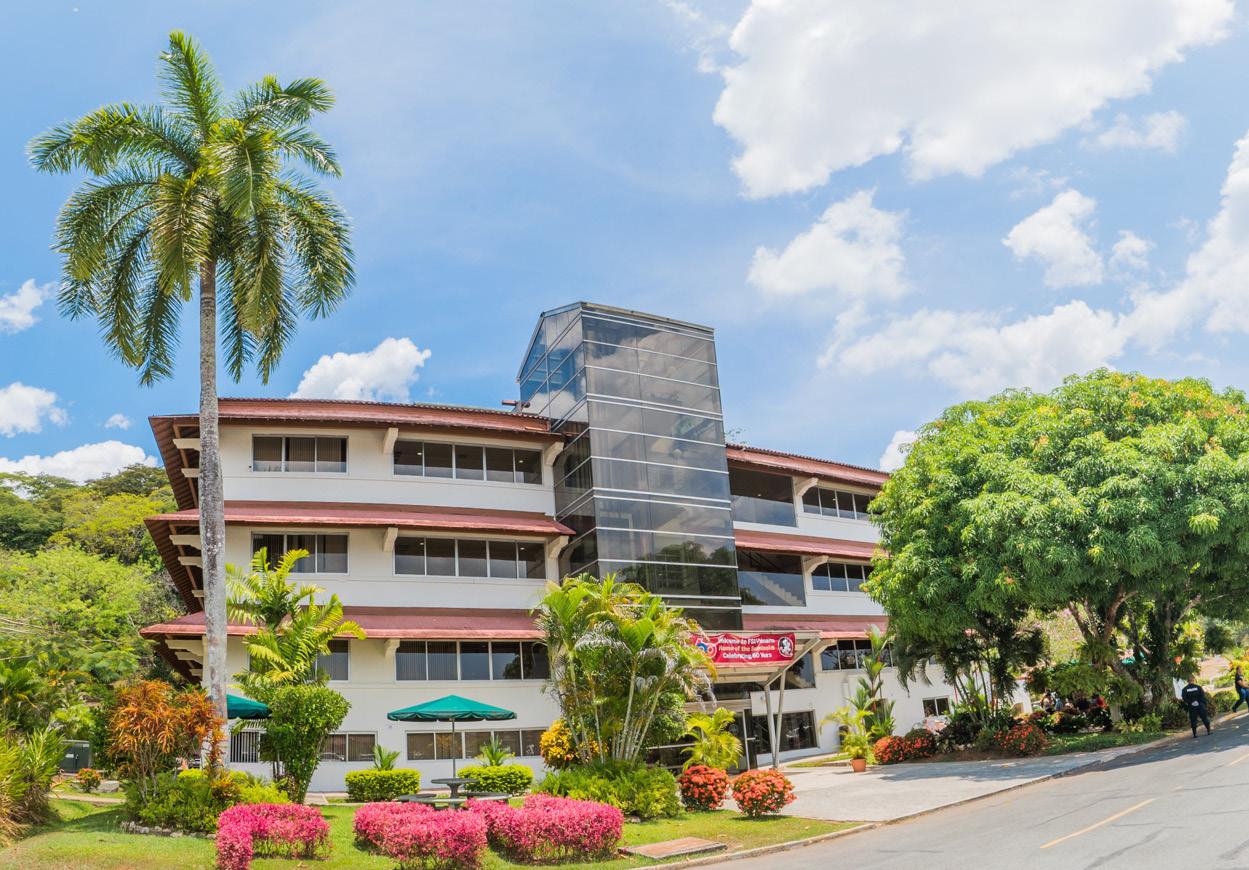
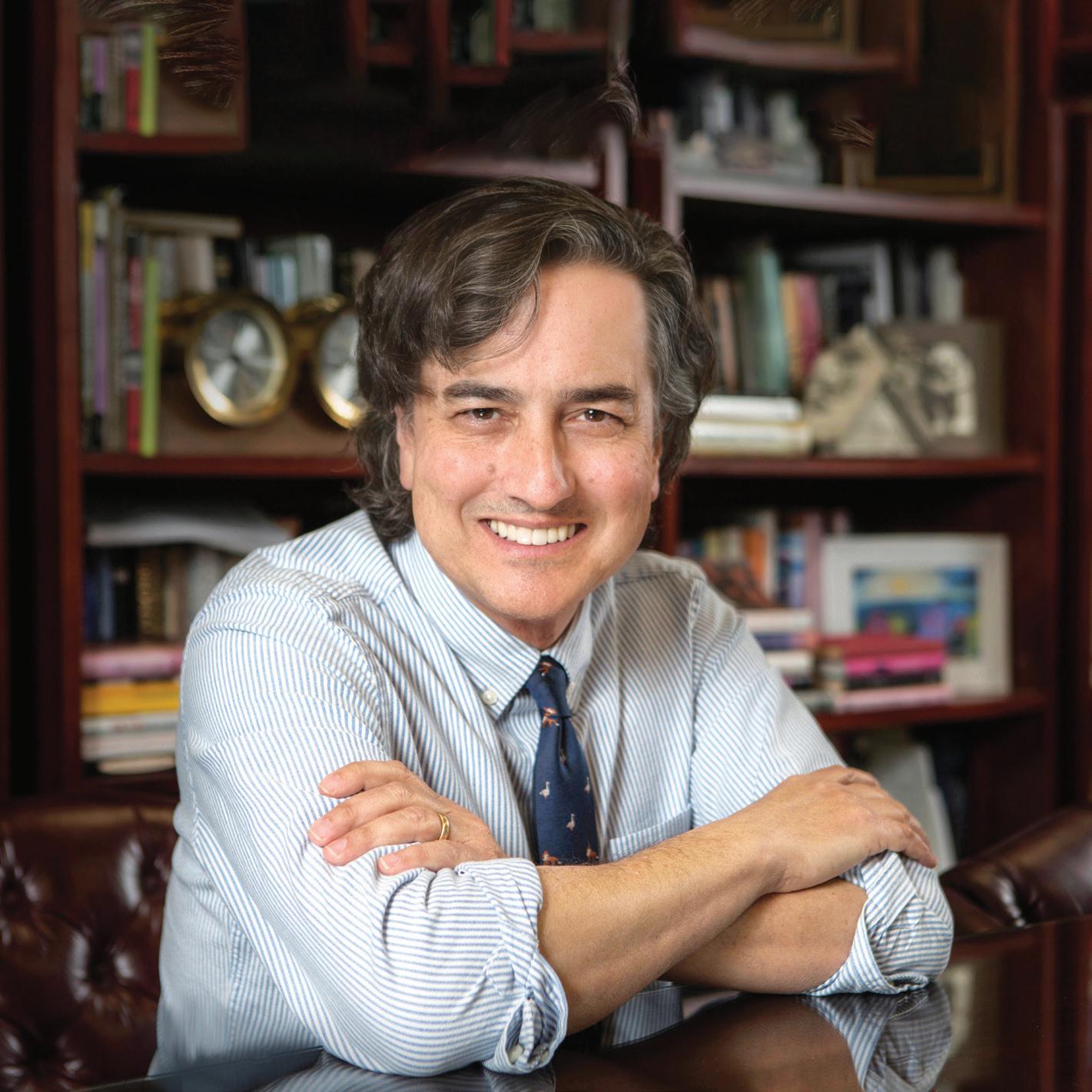
Dr. James Clark is the provost and executive vice president of Florida State University, overseeing all academic and academic service units. Prior to his role as provost, Clark served as dean of the College of Social Work, where he managed academic affairs and research initiatives and developed a strong institute and center system. During 21 years at the University of Kentucky, Clark co-founded the Center on Trauma and Children, a nationally recognized clinical research center, before moving to the University of Cincinnati in 2012 to lead their School of Social Work. Clark has published in the areas of evidence-based behavioral health, forensic mental health, child and adolescent traumatic stress, criminal justice, ethics and accountability and psychobiography and the study of lives.

1
WHAT ATTRACTED YOU TO FLORIDA STATE WHEN YOU MOVED HERE FROM THE UNIVERSITY OF CINCINNATI IN 2015? I did not know much about FSU when I was recruited in 2015, but it became clear that it was a university hungry to become a nationally preeminent university. That ambition and the opportunity to work with then-President John Thrasher, Provost Sally McRorie, the faculty and staff at the College of Social Work and my fellow deans were strong reasons to join FSU.
2
NOT EVERYBODY KNOWS WHAT THE JOB OF PROVOST ENTAILS. WHAT ARE YOUR MAJOR RESPONSIBILITIES?
The provost and executive vice president for academic affairs is the No. 2 position, reporting directly to the president. I work closely with President Richard McCullough and the cabinet on major initiatives. I am responsible for the success of our 17 colleges, 20 deans, 1,900 faculty and over 200 degree programs. Of course, I have an amazing team that makes this all possible! The Office of the Provost also leads FSU’s information technology, distance learning, international programs, centers and institutes, The Ringling Museum, graduate education, accreditation, strategic planning, admissions and student success programs. Academic Affairs manages an annual budget of approximately $1.2 billion, so we work closely with leaders across campus and President McCullough to target those dollars strategically.
3
HOW DID YOUR PREVIOUS EXPERIENCE AS A DEAN PREPARE YOU FOR THE JOB OF PROVOST?
My time as the dean of the College of Social Work was wonderful preparation for this role, as it required me to learn an enormous amount about FSU programs, constituents, faculty, students and central administration. I also met hundreds of alumni and friends in Florida and across the nation while fundraising. And, importantly, I got to know fellow deans who taught me a lot about their colleges and institutions. The deans here are an unusually friendly group who welcomed and taught me a great deal about effective academic leadership. I also appreciated watching Provost McRorie and President Thrasher lead during that time — their intelligence and commitment to FSU were extraordinary.
4
My central work involves aligning with leaders across campus to help reach President McCullough’s goals to propel FSU as a global university respected for all dimensions of higher education— humanities, arts, social sciences, STEM disciplines, and professions. This means understanding the entire campus infrastructure and making it easier to retain and hire great faculty, students and staff. People make all the difference, so everything we do must increase the likelihood that the best people in the world want to be part of our team. We had a very strong hiring year in 2023, and I’m thrilled that so many excellent people want to work at FSU. I’m also excited about FSU’s commitment to build a premier academic health center — FSU Health — which can transform health care across North Florida. Our recent Triumph Gulf Coast Foundation award of $98 million means FSU is now a key player in the economic development of the Panhandle for the next 50 years, especially in advanced materials manufacturing. The year 2024 is also the time to reaccredit the university. Our amazing team, led by Dr. Ruth Storm, associate provost and associate vice president for academic affairs, is taking an in-depth look at all aspects of FSU, allowing us to invest intentionally to maintain excellence and significantly improve areas requiring attention. These challenges and opportunities require close work with all the Westcott leadership and leaders across campus. I believe the desire for collaboration, alignment and teamwork has never been more intense than now. Senior Vice Provost Rick Burnette is leading several crucial strategic planning initiatives, which will dovetail with similar planning that Vice President for Research Stacey Patterson is conducting, so alignment across our divisions is one of the most exciting developments occurring with President McCullough’s guidance.
5
YOU GOT YOUR BACHELOR’S DEGREE FROM SIENA COLLEGE. WHEN YOU MAKE DECISIONS THAT AFFECT STUDENTS NOW, DO YOU EVER THINK ABOUT YOUR EXPERIENCE AS AN UNDERGRAD? I deeply appreciate my undergraduate experience at Siena College. My professors were great scholars who loved teaching, and I was lucky to participate in Siena’s traditional liberal arts approach, which was the trademark of a Franciscan education. Siena gave me a deep love for life-long learning and taught me to revere higher education that helps students become rigorous, analytic thinkers who embrace complexity. I also appreciated the Franciscan credo to prioritize the value of every person and the call to serve others. These are things I think about every day. Later, I sat in on many upperdivision undergraduate courses while doing doctoral work at the University of Chicago. I was deeply impressed by the excellent teaching in those classrooms. I studied how the Chicago culture made that magic happen!
6
HOW IMPORTANT IS FACULTY DEVELOPMENT AND RETENTION TO YOUR ROLE AS PROVOST? The faculty is the “talent” that makes a great university, much like great performers make Broadway possible or how great athletes make sports so galvanizing. Much of my time is spent partnering with our deans and faculty, who are recruiting, retaining and developing faculty. FSU invests millions of dollars in faculty, so we need to provide them with opportunities and tools to succeed in teaching, research and service. Most of my budget goes to faculty for salaries and support for their work, and President McCullough has invested the lion’s share of state revenues in faculty development. Vice President for Faculty Development and Advancement Janet Kistner has done fine work in this area for many years, including developing programs to advance talented faculty into leadership positions across campus.
7
TALK TO US ABOUT YOUR INVOLVEMENT IN THE NATIVE AMERICAN STUDIES CENTER?
Assistant Provost Jay Terry, College of Arts and Sciences
Dean Sam Huckaba and History Professor Andrew Frank have led the design and financing of the new Native American and Indigenous Studies Center (NAIS). My decades of work in Appalachia (West Virginia and Kentucky) taught me that local people must be involved in the design phase of a center like NAIS, so we are honored that the Seminole Tribe of Florida and other indigenous leaders have become involved in all aspects of this launch. I can confidently say that FSU’s relationship with the Seminole Tribe of Florida grows stronger every day.
8
HOW DO HOPE THE CENTER WILL SHAPE THE STUDENT UNDERSTANDING OF OUR RELATIONSHIP WITH THE SEMINOLE TRIBE OF FLORIDA? The NAIS Center’s presence on campus will significantly enhance FSU students’ and faculty’s appreciation for this relationship. It will serve as a center for faculty and student scholars who desire to work with the Tribe and other indigenous peoples in enlightened and effective ways. I’m very excited about this initiative and, in fact, about many other community-based projects the Office of the Provost team is working on!
To learn more about NAIS see page 10.
9
LOOKING BACK THROUGH YOUR CAREER, ARE THERE ANY ESPECIALLY MEMORABLE MOMENTS? The older I get, the more surprised I am about twists and turns in my career. I loved doing clinical social work and soon after was drawn to forensic (court-involved) work. I ran a small agency at age 26, and that launched the administration and management dimensions of my work. I loved teaching clinical, research and management courses to masters-level social work students and then helped design and teach in a doctoral program. Co-founding the Center on Trauma and Children with colleagues at UK and then developing it for over 12 years was an amazing learning experience. Working with my brilliant wife, Liz Croney, as she built her company required learning how a successful for-profit company worked in the private sector. I’m especially grateful to FSU for giving me leadership opportunities that forced me to “stretch.” There are so many people I continue to be grateful to because they urged me to grow as a leader and then challenged and supported me. My career is like a room filled with these people without whom none of this could have happened.
10
“Legacy” is a sobering concept, especially since each day is full of fascinating opportunities and problems! I hope future observers will find that I helped FSU meaningfully advance during a complex historical era for higher education in America. I’ve come to love FSU and the people who make it a unique university in its commitment to caring about and for its students, faculty and staff. FSU has an extraordinary organizational culture! We also love our alumni, who challenge and support us in extraordinary ways!
LEARN MORE provost.fsu.edu


Between full-time course loads, part-time jobs and trying to have some fun in between, many of us spent our college years dreaming of becoming a CEO, not actually being one. There are a special few who make these dreams into reality and start businesses while they are students. You may think that these students are just from the Jim Moran College of Entrepreneurship, but no — many non-business or entrepreneurship majors leverage the expertise and support found at the InNOLEvation Center for Student Engagement. The InNOLEvation Center operates out of the College of Entrepreneurship but is available to all students, no matter their major. Students can come to the Center and participate in one of four tracks that correlate to the stage of their burgeoning business: “Discovery” for students who want to learn about entrepreneurship, “Create” for those who have a business idea but don’t know where to start, “Innovate” for students who have a complete business model and need specific assistance and “Ignite” for those with an established business who need coworking space.
The opportunities for education and support are endless. Beyond these tracks, students can participate in the new Blackstone LaunchPad Program or one of the Center’s many competitions, such as the popular InNOLEvation Challenge, which offer life-changing funding and mentorship opportunities for participants.
“Our students learn a lot here,” said Kaitlin Simpson, program manager for the InNOLEvation Center. “We focus a lot on pivoting. We help them figure out all the pieces and we empower them to pivot as they figure things out. Students take that knowledge and mindset with them as they continue in their careers.”
The InNOLEvation Center and the Jim Moran College of Entrepreneurship officially welcomed the Blackstone LaunchPad Program to Florida State University in January 2023. The program is provided through a grant from the Blackstone Charity Foundation, the philanthropic arm of investment firm Blackstone. Though available to all students, the Blackstone LaunchPad Program and grant allow the InNOLEvation Center to direct more education and programming opportunities toward students from diverse backgrounds, particularly through partnerships with other University programs such as the Center for Academic Retention and Enhancement, or CARE.

According to Simpson, the students who come through the Blackstone LaunchPad often come to college facing challenges and barriers that other students at the InNOLEvation Center are not facing. They do not have parents who are entrepreneurs or work in traditional business settings, or they may even be supporting their parents or a sibling financially. These added challenges get in the way of students seeing that starting a business is possible for them.
“Some of our students simply don’t see themselves as entrepreneurs, especially those not in the college [of entrepreneurship],” added Morgan Rodgers, program coordinator for the Blackstone LaunchPad Program. “They are doing hair in their dorm room and say they want to be a barber, but they’re not making the connection between that and
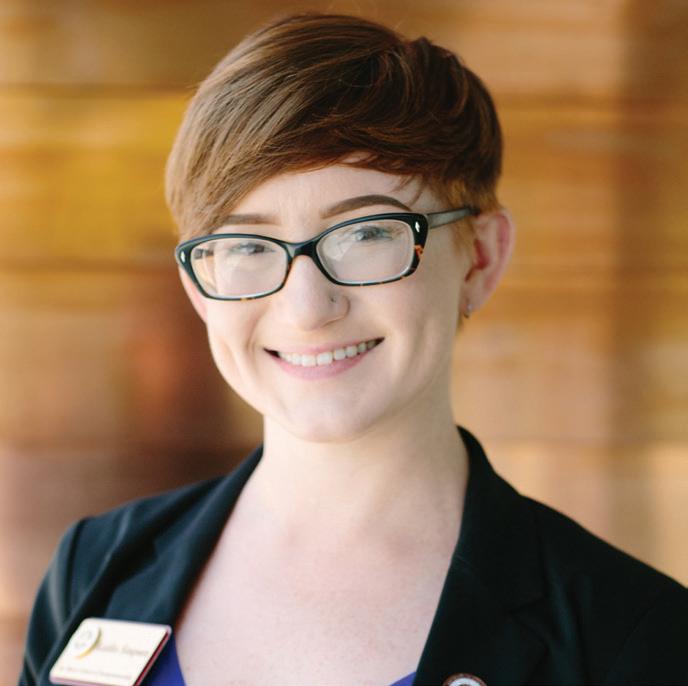
↑ Kaitlin Simpson (B.S. ’11) serves as program manager for FSU’s InNOLEvation Center.
being an entrepreneur. They lack that mindset, financial literacy and other things. That’s where the program comes in.”
The Blackstone LaunchPad and InNOLEvation Center programs offer a variety of programming to teach students everything they need to know to start a business — creating a business plan, validating your business, identifying your target market, fundraising and more. Students can participate in workshops, student organizations

and competitions, but it is up to them to take the initiative with their businesses.
Rodgers says even students who do not win the competitions often come back to the Center excited and looking for more mentoring.
According to some Florida State alumni who have gone on to run longstanding businesses after participating in InNOLEvation Center programming, taking advantage of those learning opportunities is the key to being successful.
John Wilcox (B.S. ’18) was diagnosed with Type 1 diabetes on his 9th birthday in 2005 and knew from then on that he wanted to make a difference in diabetes care. He came to Florida State to study biological
science and participate in the Type 1 Diabetes Research Program, which he started promptly in his first semester. By the time he was a senior in 2018, Wilcox was studying insulin pump failures (a common but potentially dangerous occurrence where a diabetic’s insulin pump does not properly administer the insulin) and was encouraged by his lab leader to explore the entrepreneurial side of medicine.
This came as a surprise to Wilcox, as he never considered going into business. Together with a few biomedical engineering students from the FSU-FAMU College of Engineering, Luis Blanco (B.S. ’18), Nicholas Cooper (B.S. ’17, M.S. ’18) and JC Gray (B.S. ’17), co-created SmartFusion™, a product that can detect if a failure is occurring and alert the patient. They entered the product in the 2018 InNOLEvation
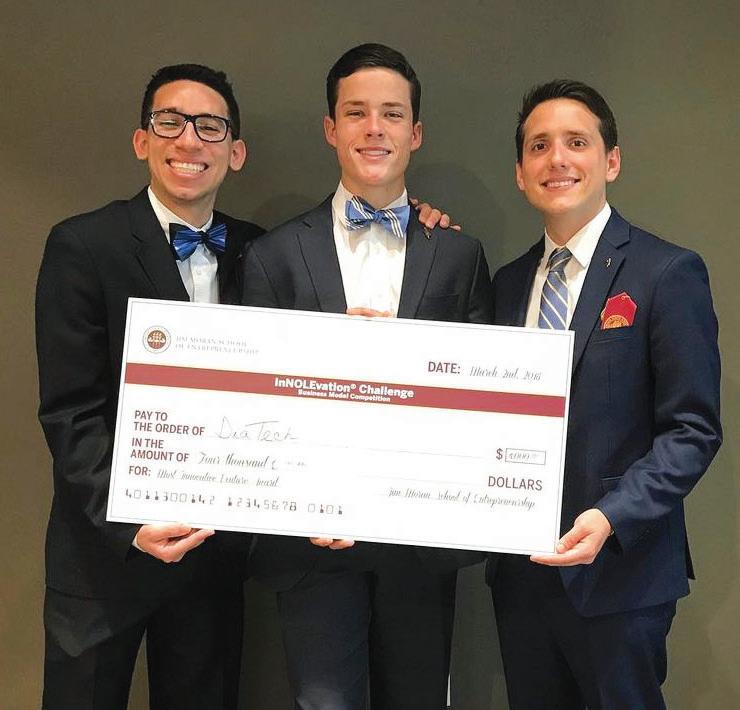
↑ Left to right, Nicholas Cooper (B.S. ’17, M.S. ’18), John Wilcox (B.S. ’18) and Luis Blanco (B.S. '18) won the 2018 InNOLEvation Challenge. ←The Jim Moran College of Entrepreneurship, the nation’s first stand-alone college of entrepreneurship, is housed on South Monroe Street in downtown Tallahassee. Building photo by Colin Hackley Photography.
Challenge and won. In order to accept the $15,000 grand prize, they had to form a business and decide if they were 100% committed right then.
DiaTech Diabetes was born. Today, the company has a team of nine advisors, developers and clinicians working on products across the diabetes care and technology space. After successfully raising start-up funding from investors and graduating from Florida State, Wilcox and the DiaTech team went on to receive a Small Business Innovation Research Phase 1 Grant from the National Institutes of Health in 2021. In 2023 the company received a $1 million award from JDRF to further advance the development of SmartFusion™.
“This journey has been crazy, but the JDRF grant is a full circle moment for me,” said Wilcox. “I grew up fundraising for this
→ NightCap is a beverage cover that helps prevent drinks from getting spiked. It fits into a scrunchie that women can wear on their arm or in their hair.
BEFORE THE CHALLENGE, I SPENT A SEMESTER UTILIZING [THE INNOLEVATION CENTER'S] RESOURCES. I DID TEXTILE TESTING THERE, UTILIZED SPACE TO STUDY AND BE AROUND LIKE-MINDED PEOPLE.
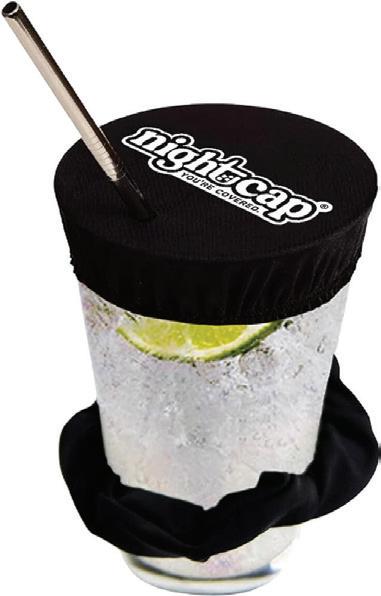
organization and I do marathon fundraising for them now. It’s amazing to finally work with them in a professional capacity.”
Getting to this point would not have been possible without the direct mentorship of dozens of people at FSU and the InNOLEvation Center. He said their actionable advice, from forming a successful strategy to earn FDA approval to being connected to a good patent attorney, was a game changer.
“We had a trial by fire, and I wouldn’t have it any other way. We were good at getting feedback and admitting when we were wrong, and we learned through a lot of constructive criticism,” said Wilcox. “The successful companies are the ones who can accept that criticism and modify their plan based on it.”
Michael Benarde (B.S. ’19, MBA ’21) agrees. He founded NightCap after winning the 2020 InNOLEvation Challenge with a product he invented with his then 16-year-old sister Shirah. Nightcap is a beverage cover to help prevent drink spiking. In August 2020, not long after winning the Challenge in
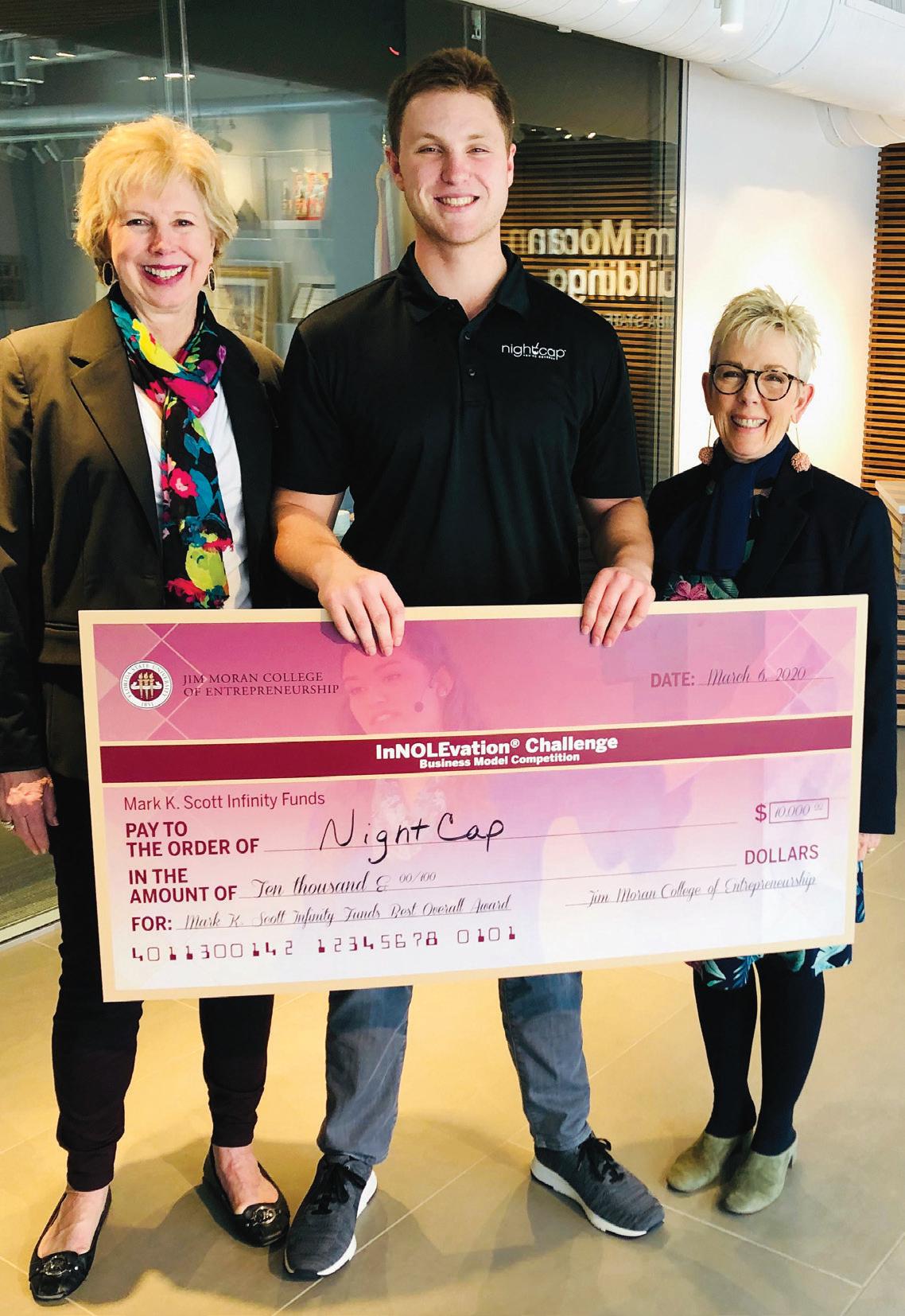
↑ Michael Benarde (B.S. ’19, MBA ’21) accepting the 2020 InNOLEvation Challenge award with Assistant Dean for the Jim Moran Institute for Global Entrepreneurship Wendy Plant and Dean of the Jim Moran College of Entrepreneurship Susan Fiorito.

the spring, he and Shirah filmed an episode of Shark Tank that aired on February 5, 2021. They struck one of the fastest deals in Shark Tank history with Lori Greiner, and the company has grown exponentially since, having sold over 600,000 units in more than 40 countries and partnered with organizations at 150 universities.
Benarde says he could not have done any of it without the opportunities and mentorship the InNOLEvation Center and the Challenge gave him.
“Before the Challenge, I spent a semester utilizing their resources. I did textile testing there, utilized space to study and be around like-minded people,” he said. “The law clinic was the most helpful. They gave me a ton of advice where they could and filed a bunch of paperwork at cost, like my trademark. I couldn’t have afforded it otherwise.”
The biggest thing Benarde says he learned was how to speak in front of people and answer questions in a high-pressure situation, which came in handy on Shark Tank. For Wilcox, it was the importance of building a network of supportive experts who are more knowledgeable and can really help, like those he found across Florida State and at the InNOLEvation Center.
“If you are really interested in exploring a business idea, it’s about having conversations and pitching sessions and ideation sessions with these mentors and hearing what they can offer you. Get into conversation with them as fast as possible,” Wilcox said. “It can be intimidating, if you have a good idea, to take the leap and start a business. But it takes a lot less time to accomplish a goal when you are working with people who know what they’re doing.”
LEARN MORE icse.jmc.fsu.edu

The Alumni Association is happy to offer our own insurance through our trusted partner, Meyer and Associates. Individual travel insurance plans are available to meet various needs and budgets.
LEARN MORE gonol.es/protectyourtrip
The Florida State University Alumni Association invites you to experience culturally rich travel destinations hand-selected with FSU alumni and friends in mind. Our highly respected travel partners take care of our tour planning and logistics, so you can relax and enjoy your trip.
We have selected world-class guided tours with unique itineraries. Each destination offers an opportunity to visit iconic landmarks, sample authentic cuisine and truly experience the local culture with other Noles! We hope you will join us.



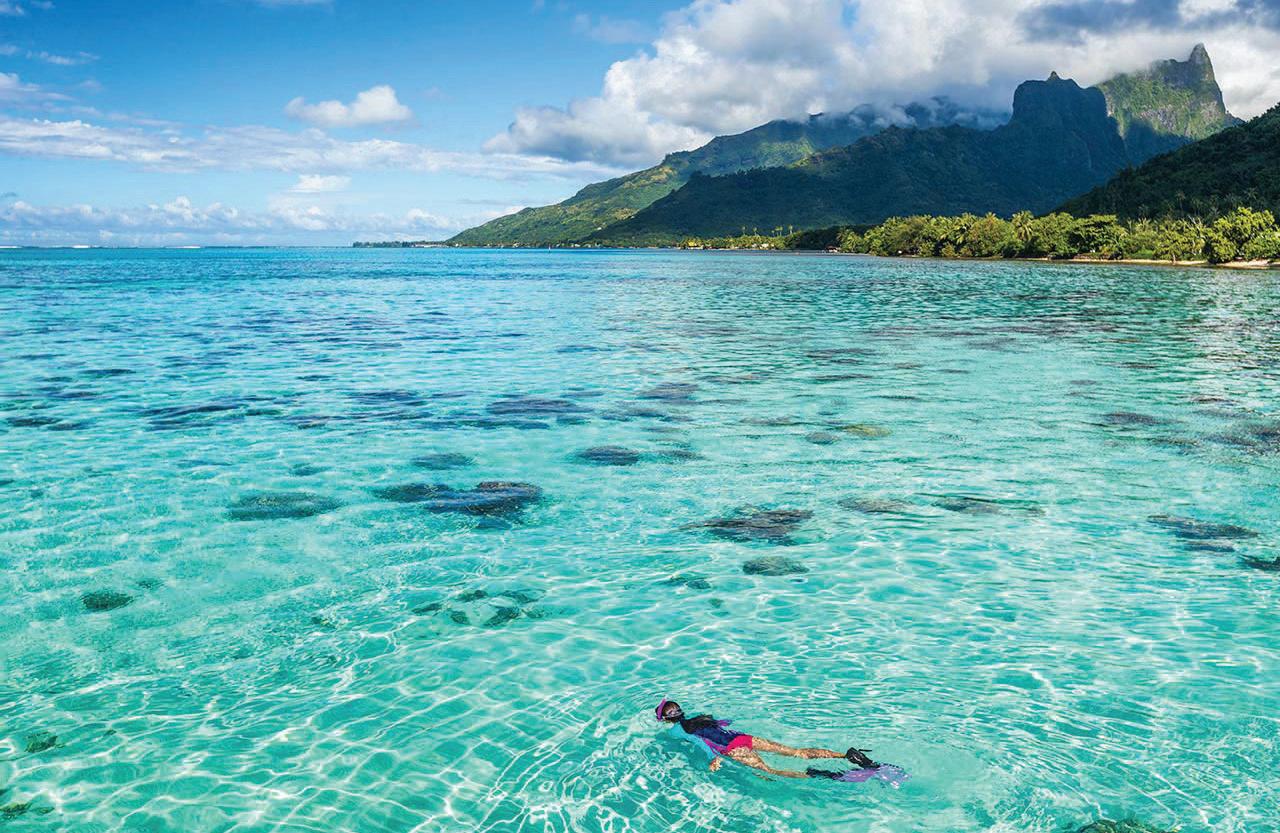
Young Alumni
Essential Europe Grad Trip May 13–30, 2024
Ciao Italy August 31–September 8, 2024
Peru’s Inca Trail
October 5–12, 2024
Memorials of World War II
October 27–November 6, 2024
The Kentucky Derby May 1–5, 2024
The Indianapolis 500 May 24–27, 2024
LUXURY
Southwest National Parks
May 1–9, 2024
Kenya Safari: The Big 5 June 26–July 6, 2024
Discover Southeast Alaska July 26–August 2, 2024
LEARN MORE gonol.es/travelnoles

Engaging in philanthropy is a powerful way for students to explore their values, build community and develop as global citizens. Student philanthropy empowers students to be a part of creating positive social change both now and in the future. We spoke to two student leaders on the importance and impact of student giving on FSU’s campus.
Maddie King
President, Student Alumni Association Criminology Major, College of Criminology and Criminal Justice Class of 2024
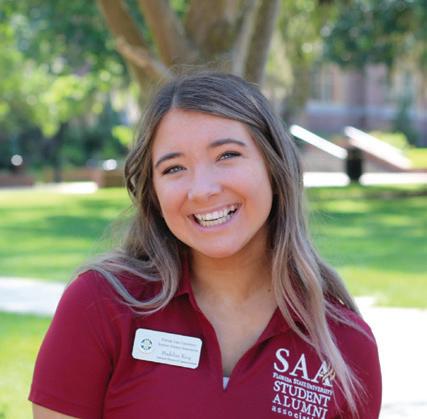
As president of the Student Alumni Association (SAA), Maddie King strives to create a pipeline of engaged students who are passionate about FSU and want to share that love with other students and alumni. “When I attend alumni events, I see how excited people are about FSU and its students. People are always ready to support us, and I want to create a strong group of students who feel the same way,” King said. “Once we have buy-in from students to be active on campus, we will also have the space to show them how necessary their giving is.”
King has always had an affinity for volunteering her time, whether with family, friends, community or student organizations. With her desire to be a voice for students, King believes highlighting how student giving benefits students is the best way to gain consistent support. “We use SAA and its events to build community and a sense of belonging. Once relationships are built, we show [students] what their dollars can do and why they’re important.”
After serving on the SAA executive board, Maddie applied for president with a list of goals. “I hope to inspire a sense of excitement and preparedness, encouraging students to envision their own unique journey while staying connected to the rooted family of this university,” said King. “It’s important to ensure that students, especially those involved with various organizations, understand the difference their giving can make in someone else’s experience. That’s what it’s all about.”
Urielle Laurent
Chair, FSU Student Foundation
Economics Major, College of Business Class of 2025
Urielle Laurent’s role as chair of the Student Foundation has provided her with a unique perspective on giving. “Student giving is extremely important. Even students simply acknowledging that there is a way to give back to the university is something we’ve tried to encourage. Students don’t always know that their gifts impact the university,” Laurent said.
Having served in various student leadership roles focused on philanthropy, Laurent spoke about her motivation to continue this line of work. “The immediate impact is there. I can quickly do something and see the fruits of my labor in real-time. That’s what I like the most.” Urielle discussed several initiatives she’s had a hand in, one of the most significant being changing the culture.
“The culture of Student Foundation was clustered in one specific area of campus, and as soon as I got in [Student Foundation], that was something I wanted to break down immediately. I wanted to have representation from different areas on campus, and now that is reflected on our Board. Now, whenever I speak with freshmen, I can reference students on our Board, and there’s typically at least one person they are familiar with.”
Committed to philanthropy, Laurent now aspires to have a long-term career in private or non-profit spaces.
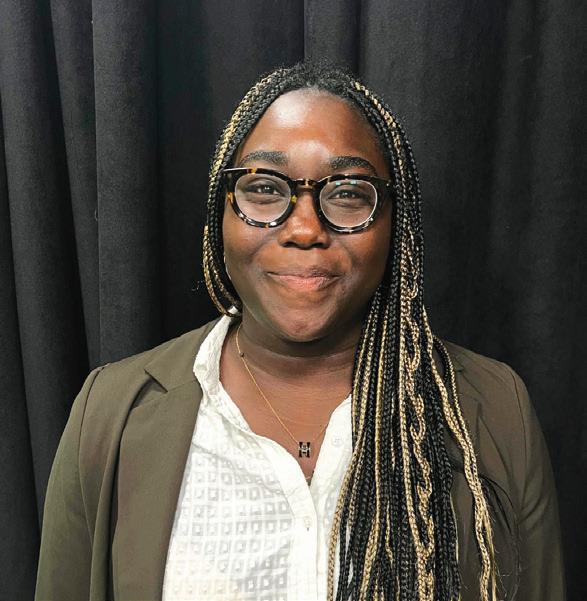
LEARN MORE about the FSU Student Foundation and Student Alumni Association studentfoundation.fsu.edu || alumni.fsu.edu/saa
GIVE TODAY to the Seminoles Forever Fund gonol.es/SupportSeminolesForever
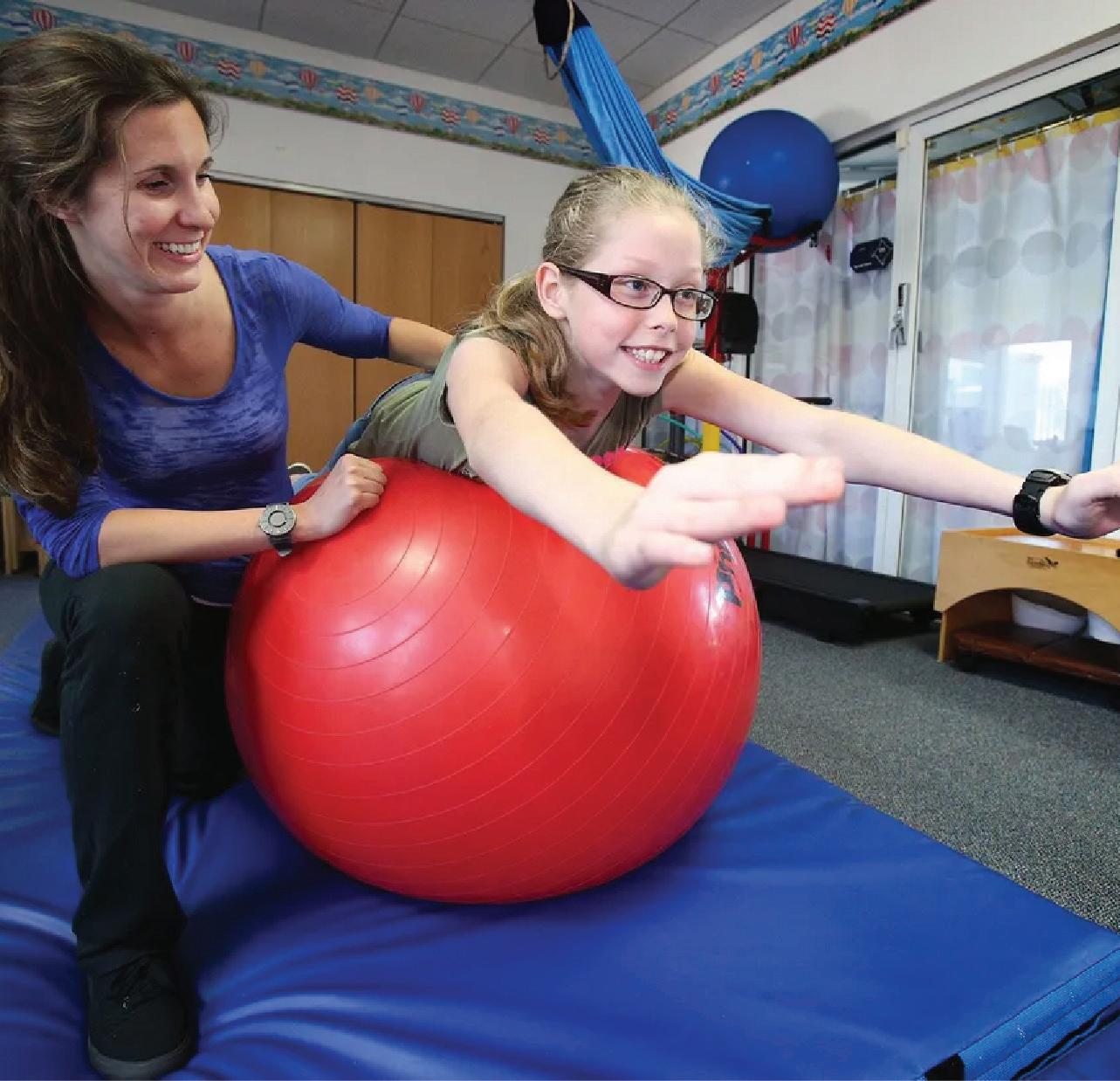
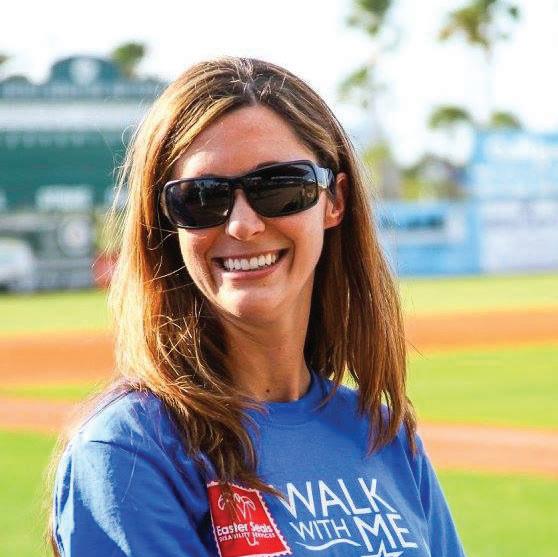
“Life is full of adversity,” says Dr. Emily Townsend-Cobb. “It doesn’t matter if you’re born with a blinding disability, like myself, or if you’ve got other challenges. It’s really important to find the advantage in the adversity you face.”
Townsend-Cobb earned a bachelor’s degree in exercise physiology from the FSU College of Health and Human Sciences in 2012 and became the first blind doctor of physical therapy when she graduated from the University of Colorado School of Medicine in 2015.
Townsend-Cobb is one of only a handful of blind healthcare providers in the country. She has served as a physical therapist at Brooks Rehabilitation in Jacksonville, Florida, for over 10 years, specializing in pediatrics and women’s health.
She has also served as pediatric team lead and center manager of rehabilitation and is a member of Brooks’ Diversity Equity and Inclusion Council. Townsend-Cobb
is also the vice president of Foundation Fighting Blindness, Jacksonville chapter.
Diagnosed with Leber’s Congenital Amaurosis, an inherited eye disease causing her to lose her vision gradually, didn’t stop Townsend-Cobb even as a young girl who played soccer.
For her, that meant persevering and maintaining a positive attitude no matter what and for the university, it meant converting reading and classroom materials into audible and tactile formats.
“It’s really a sighted person’s world,” says TownsendCobb. “All the ways we learn — graphs, diagrams — it’s all visual. That was my biggest struggle overall. But, Florida State faculty and staff, from head professors to TAs, worked really well with me. We even developed a Braille EKG with the disability center so I could read the information needed to complete one of my classes.”
Townsend-Cobb also recalls using K’nex, a rod and connector building system, and Play-Doh to make bio and organic chemistry molecules, among the many ways the university and Student Disability Resource Center helped to make learning more accessible.
Another challenge was navigating people’s perceptions of her disability.
“Vision loss is something that doesn’t have to be a disability, but we live in an inaccessible world, and we live with people with a lot of limiting viewpoints.”
Townsend-Cobb regularly speaks at national rehabilitation conferences, including the American Physical Therapy Association and the American Medical Association, regarding disability justice and advocating for “physicians, nurses, physical therapists, etc. with disabilities so that we can better serve those populations and identify with them.”
“I want someone else not to have to go through what I went through in terms of advocating and breaking down the barriers,” she says. “My goal is to move those over so the next little blind girl can do things without so much stress.”
While at FSU, Townsend-Cobb was also a member of the FSU Marching Chiefs and Tau Beta Sigma music sorority.
In 2022, Townsend-Cobb was recognized by the FSU Alumni Association with the Reubin O’D. Askew Young Alumni Award — the highest honor bestowed upon young alumni.
“Humbling,” Townsend-Cobb says, noting that there was a time when she wasn’t sure if she would be able to work in this profession, and now, she’s not only “doing it and loving it but being recognized for it.”
Townsend credits her success and her continued work in breaking down barriers for the blind and visually impaired community to her family’s endless love and support, technological advances that have leveled the playing field and the support of foundations working to restore sight to millions.
Townsend-Cobb says harnessing one’s adverse situation and turning it into a strength helps them personally and makes the world a better and more interesting place to live.
At home, Townsend-Cobb is a proud wife and mother of two little girls, Elora and Melody, and she enjoys participating in road races and triathlons with her husband, Ryan.
→ Dr. Townsend-Cobb was recognized by the FSU Alumni Association in 2022 with the Reubin O’D. Askew Young Alumni Award, presented by Dazi Lenoir (B.A. ’02, M.S. ’03), then-chair of the Alumni Association Board of Directors.
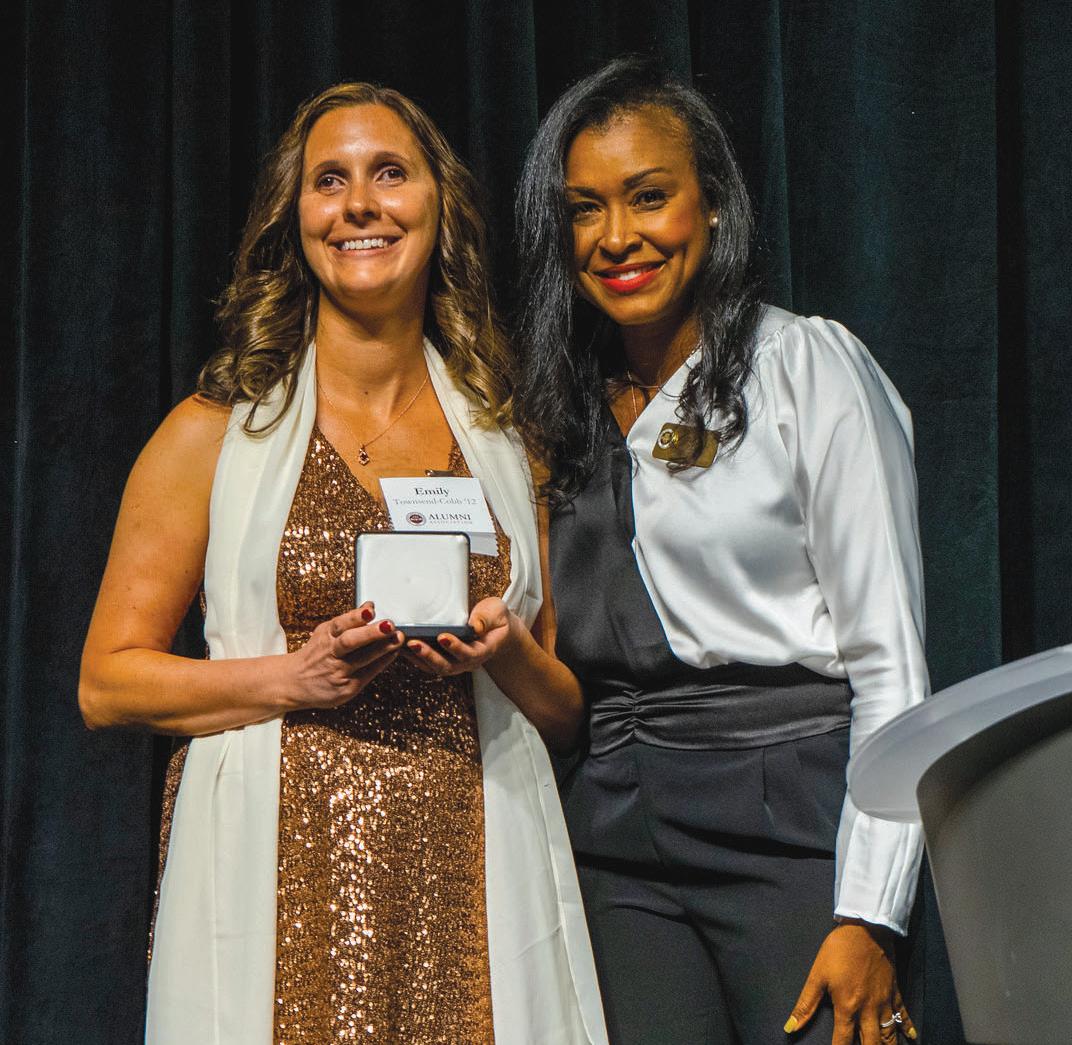
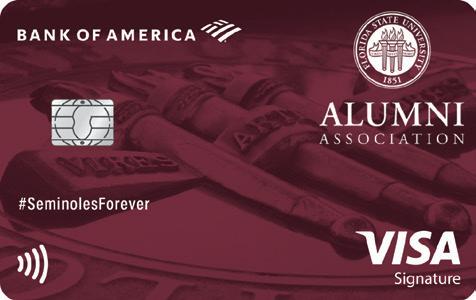

$200 cash back bonus offer*
Carry the only card that helps support Florida State University Alumni Association.
• Get a $200 cash back bonus if you make at least $1,000 in purchases in the first 90 days of account opening*
• Earn cash back on every purchase
• Contactless card – The security of a chip card, with the convenience of a tap
To apply for a credit card, please visit bofa.com/fsua
This offer is unique to this solicitation. Our credit card offers may vary, and this offer may not be available elsewhere. You can take advantage of this offer when you apply now.
Choose 3% cash back in one of six categories, like online shopping
Automatic 2% cash back at grocery stores and wholesale clubs
Unlimited 1% cash back on all other purchases
Earn 3% and 2% cash back on the first $2,500 in combined purchases each quarter in the choice category, and at grocery stores and wholesale clubs, then earn unlimited 1% thereafter.
The Florida State University Alumni Association Customized Cash Rewards credit card For information about the rates, fees, other costs and benefits associated with the use of this card or to apply, please visit bofa.com/fsua Residents of the US and its territories only. See full disclosure for details. *Bonus Cash Rewards Offer. You will qualify for $200 bonus cash rewards if you use your new credit card account to make any combination of purchase transactions totaling at least $1,000 (exclusive of any fees, returns and adjustments) that post to your account within 90 days of the account open date. Cash Advances and Balance Transfers are not purchases and do not apply for purposes of this offer. Limit 1 bonus cash rewards offer per new account. This one-time promotion is limited to customers opening a new account in response to this offer and will not apply to requests to convert existing accounts. Your account must be open with active charging privileges in order to receive this offer. Other advertised promotional bonus cash rewards offers can vary from this promotion and may not be substituted. Allow 8–12 weeks from qualifying for the bonus cash rewards to post to your rewards balance. The value of this reward may constitute taxable income to you. You may be issued an Internal Revenue Service Form 1099 (or other appropriate form) that reflects the value of such reward. Please consult your tax advisor, as neither we, nor our affiliates, provide tax advice.
By opening and/or using these products from Bank of America, you’ll be providing valuable financial support to Florida State University Alumni Association.
This credit card program is issued and administered by Bank of America, N.A. Visa and Visa Signature are registered trademarks of Visa International Service Association, and are used by the issuer pursuant to license from Visa U.S.A. Inc. Bank of America and the Bank of America logo are registered trademarks of Bank of America Corporation.



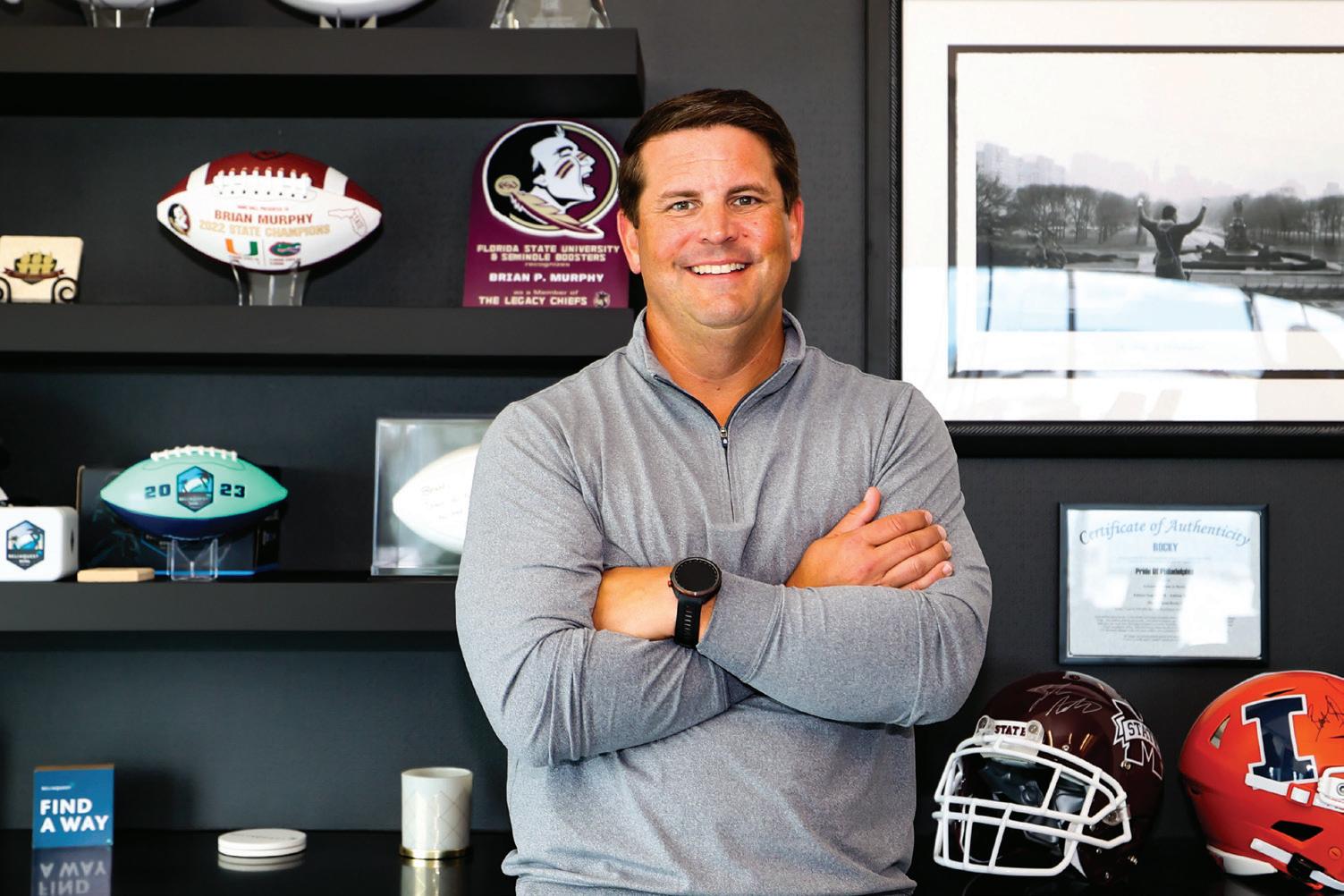
Brian Murphy (B.S. ’00) has never thought of his company, ReliaQuest, as a start-up, and he’s never acted like a start-up founder.
Even when ReliaQuest reached a $1 billion valuation, called “unicorn status,” in 2021, he never thought of himself as a big shot. To him, he’s just a guy from Middleburg, Florida, looking to solve problems for others and chase what is possible, a path to success he saw modeled at Florida State University.
“Everything became a bit more possible when I went to Florida State,” says Murphy. He credits FSU with giving him boundless opportunities and a level playing field that made hard work more critical to success than grades, rankings or other arbitrary measures.
“If you were willing to work hard, especially if you outwork those around you, you could join any club or do anything on campus. Everything I did at Florida State put me in a position to learn how to communicate with and understand people from different backgrounds. That’s nine-tenths of what I do today.”
Murphy is the founder and CEO of ReliaQuest, a Tampa-based cybersecurity technology company that helps large
enterprises manage security risks in their data. They do this by increasing visibility and reducing complexity in the data, namely by automating the process of identifying, investigating and managing threats.
However, when he started the company in 2007, it looked very different from the company he runs today. Murphy founded what he thought would be an information technology (IT) consulting firm. But then, just about one year into his business, the Great Recession of 2008 hit, and the company lost all but one client.
This remaining project was a “sub to a sub to a sub-contract” on military contracts overseas that worked on satellite engineering and securing information assurance. No one on the ReliaQuest team was former military. No one knew anything about satellites or information assurance. But, with a lot of help from Google and other friendly experts, they kept fighting, stayed curious and worked to solve the next big problem ahead.
This mindset kept ReliaQuest afloat through the recession and nine years of running the company without outside funding. It was vital to growing the company into the global enterprise it is today.
The company is growing more than 30 percent year-over-year, which has landed the company a spot on the Seminole 100 list. ReliaQuest boasts over 1,000 employees in offices across the U.S., Europe and Asia, over 700 customers and about 50 patents. The company is clearly thriving, but Murphy focuses on getting “just a bit better” every day instead of chasing a finish line or the next big trend.
When you ask Murphy about success, he does not mention the patents, the offices or even the billion-dollar valuation. “I have never missed a payroll, and I’ve never missed a bill,” he notes instead. “We promote our teammates and hire from within 50 percent of the time. It’s the dollars we donate and the impact we’re making. One of the most impactful moments of my life was showing my parents the offer letter for my very first job. That’s what success is about.”
Murphy’s community involvement extends to the FSU community as well. He served as a commencement speaker in 2017 and was inducted into the College of Business Alumni Hall of Fame in 2022. He serves on the College of Business Board of Governors and has served on the Seminole Boosters Board of Directors; created the ReliaQuest Analytics Teaching Lab in Legacy Hall, the future home of the College of Business; and is a lead sponsor of the FSU Sales Institute’s International Collegiate Sales Competition.
He loves coming back to FSU and feeling the energy that inspired him as a student, the buzz that emanates from a group of people with something to prove. He takes pride in the recognition the University has received in recent years, in everything from academic rankings to athletic wins.
Murphy tells students during his visits, “Effort is the great equalizer, and it’s the only thing you yourself can completely control. Florida State is the best university to go figure out who you are, chase your own possible and push yourself out of your comfort zone. If you go all-in on yourself and take advantage of the opportunities here, it’s amazing what can happen.”
Don Caskey (B.A. ’67) has published “Conspicuous Joy: Love Poems.” The poems, some humorous, all heartfelt, were given to his wife of over 30 years — slipped into greeting cards for special occasions or the dining room table next to a garden flower. (1)
Roshan “Shan” Shikarpuri (B.S. ’74, M.Acc ’76) was honored with a Lifetime Achievement Award by the Palm Harbor Chamber of Commerce and the Palm Harbor Chamber of Commerce Foundation. Shikarpuri is a CPA, entrepreneur and the founding member of Shan Shikarpuri & Associates, PA, a business consulting firm with U.S. and international clients. (2)
Kim Hayes (B.A. ’75) published a new book of poetry, “As if She Spoke in Tongues.” The book represents a collaboration between poet mother and illustrator daughter, resulting in a unique and sometimes startling blend of creative perspectives. (3)
Yvonne Busse Salfinger (B.S. ’81) was awarded the 2023 Harvey W. Wiley Award by the Association of Food and Drug Officials (AFDO). This award is AFDO’s most prestigious award, presented to a regular or honorary member for exceptional service to the state or nation in the performance of duties and responsibilities in the administration and enforcement of food, drug, medical product safety and other consumer
protection laws, and who has demonstrated the promotion of the objectives of the Association. (4)
B. Dan Berger (B.S. ’89) was named one of The Hill’s Top Lobbyists for 2023. Berger is the chief advocate before Congress, the White House and the federal regulatory agencies for the National Association of FederallyInsured Credit Unions. He is a past member of the FSU Alumni Association Board of Directors. (5)
Dan Moisand (B.S. ’89) was invited to the White House for President Biden’s announcement of new investor protections. Moisand is chairman of the Board of Directors of the CFP Board, the body that confers and administers the CERTIFIED FINANCIAL PLANNER™ and CFP® credentials for over 97,000 CFP® professionals in the U.S. His company is also on the Seminole 100 as a top alumni-led or owned business.
Kendra Davis Briggs (B.S. ’96) was sworn in last year as an associate judge of the Superior Court of the District of Columbia. Briggs was nominated by President Biden, and confirmed by the U.S. Senate, to serve on the court. Prior to joining the bench, Briggs served as an assistant United States attorney, and as a senior associate at Parks & Crump, LLC. (6)
Julian Hills (B.A. ’98) joined the Georgia Institute of Technology as a senior
writer-editor. He is part of a team responsible for writing and editing speeches, presentations and thought leadership pieces in support of the executives supported by the Organizational, Academic and Research Communications team, including the institute’s president, provost and executive vice president for research. (7)
Mariel Betancourt Jungkunz (B.A. ’98) is the senior research content editor at Dictionary.com. She published her first picture book, “Dreams of Green,” with Astra Publishing House last year. The children’s book, also available in Spanish, is about Día de los Reyes, or Three Kings’ Day, and how an Ohioan girl and her family discover new ways to celebrate their Puerto Rican heritage. (8)
Laura J. Downey (B.S. ’99) was elected president of the Georgia chapter of The Society of Professional Journalists. Downey is the executive editor of WebMD’s magazine and its point-of-care products. In addition, she serves as the company’s lifestyle features consumer team lead on the digital side. (9)
Renee Hirschberg (B.A. ’99) became the chief alumni relations officer for the Stanford Alumni Association at Stanford University. Prior to this role she was director of alumni engagement and advancement operations at Dartmouth’s Tuck School of Business and senior associate director of alumni relations at the MIT Sloan School of Management. (10)
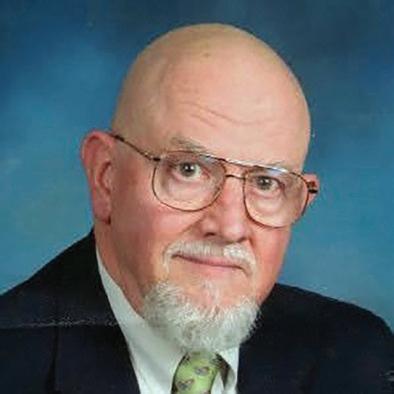

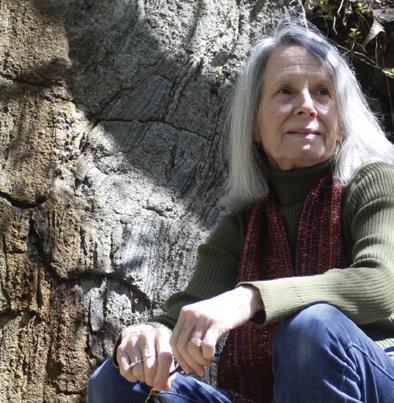

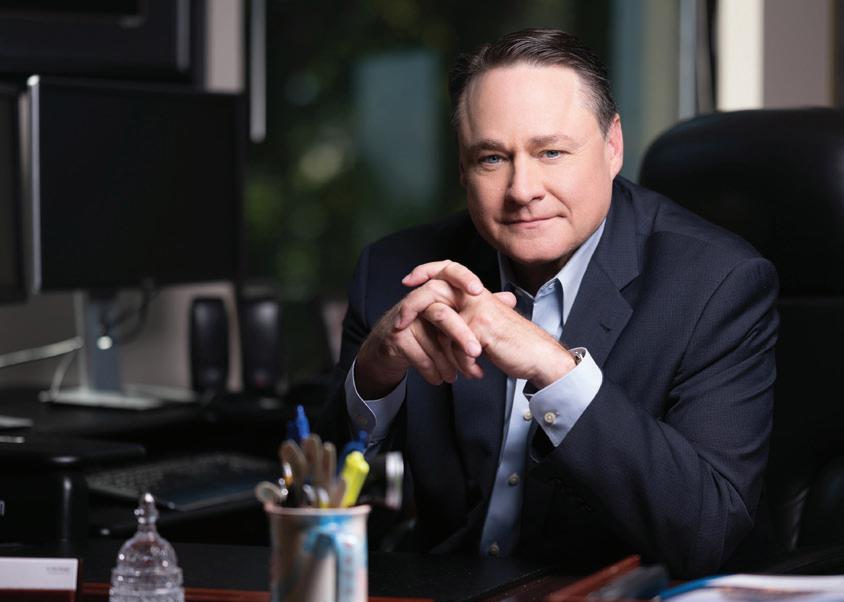
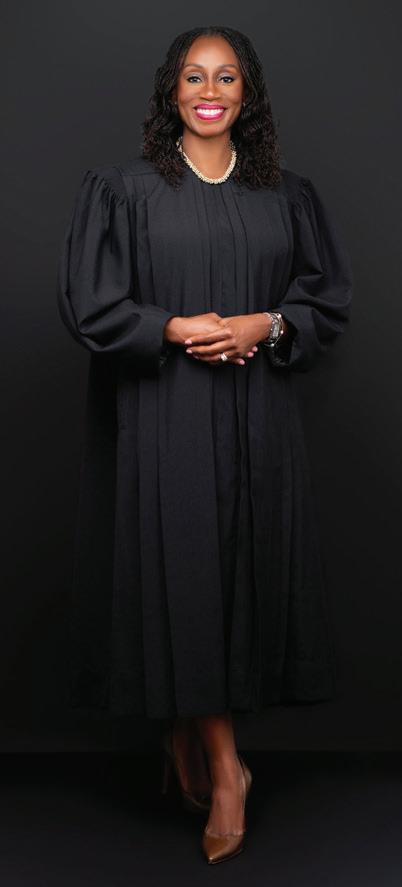

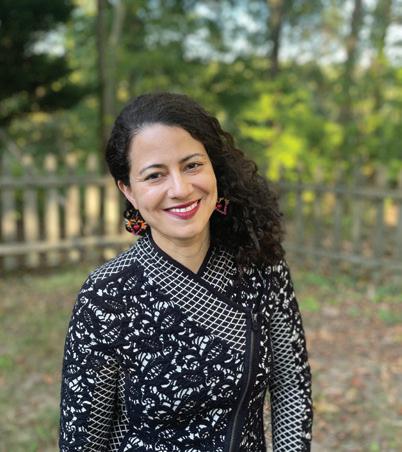
Daniel Melzer (Ph.D. ’02, M.A. ’04) published “Reconstructing Response to Student Writing’’ with the Utah State University Press. In it, Melzer makes the argument that writing instructors should shift the construct so that peer response and student self-assessment are more central than teacher response.
Kelly Therrien (B.S. ’02) was announced to the Board of the Organizational Behavior Management Network serving a three-year term as president. Therrien is also the senior manager of talent development for ALULA, a management consultancy firm that employs behavioral science to improve organizational efficiencies. (11)
Daniella Douglas (B.A. ’05) launched her business Broad Fit Financial, which boasts itself as “the first women-owned equipment finance company dedicated exclusively to serving the needs of the health, wellness and fitness industries.” Their business model aims to support the funding needs of businesses from large corporations to independent forprofit gyms.
Raven Reid Hudson (B.S. ’05) was promoted to director of Florida’s Sexually Violent Predator Program which aims to empower individuals and organizations in Florida to end sexual violence through social change, advocacy, education and training. (12)
Stewart Moore (B.A. ’07) was named co-anchor for WESH 2 News at 6, 7 and 11 p.m. Moore has won four Emmys and two Associated Press Awards for his breaking news coverage of the Pulse Nightclub shooting, best newscast and special coverage of the Pulse Nightclub anniversary. (13)
Dominique Moore (B.S. ’08) was selected as a Stein Fellow for the Class of 2024. The Stein Fellowship is a yearlong dual mentorship program that develops high-performing leaders who show a commitment to philanthropy, improving our community and growing professionally through mentorship. (14)
Kari Whaley (B.S. ’08) recently took on the role of associate dean of academic affairs and retention at Pasco Hernando State College. Whaley has previously held positions at Valencia College and Full Sail University. (15)
Sean Cook (B.S. ’13) joined the Dallas plaintiffs’ law firm Hamilton Wingo as an associate. He represents individuals and families in all types of plaintiffs’ personal injury and wrongful death cases. (16)
Jacob Salow (B.S. ’16) joined Lightfoot, Franklin and White, LLC as an associate. Salow works closely with a diverse range of defense clients, handling cases in appellate, automotive litigation, catastrophic injury claims, commercial disputes, healthcare litigation and medical malpractice defense. (17)
Erin Hoover (Ph.D. ’17) published her second collection of poetry, “No Spare People,” with Black Lawrence Press. Hoover is currently an assistant professor of English and teaches creative writing at Tennessee Tech University.
Jack Boudet (B.S. ’18, J.D. ’22) joined the litigation section of GrayRobinson. Boudet, based in the firm’s Orlando office, focuses his practice on products liability and toxic tort, construction, personal injury and class action defense. He has prior experience at an insurance defense firm representing Fortune 500 companies in various general negligence disputes.
Children’s author Karen M. Greenwald will publish her new book “The Mud Angels: How Students Saved the City of Florence,” this April. The book is based on the Great Flood in Florence, Italy, when the Arno River broke its banks and poured into the city streets. FSU students and faculty joined the aid effort to help the city protect, salvage and preserve the priceless works of art and manuscripts damaged in the flood, garnering the nickname the Angeli del fango or “Mud Angels.”
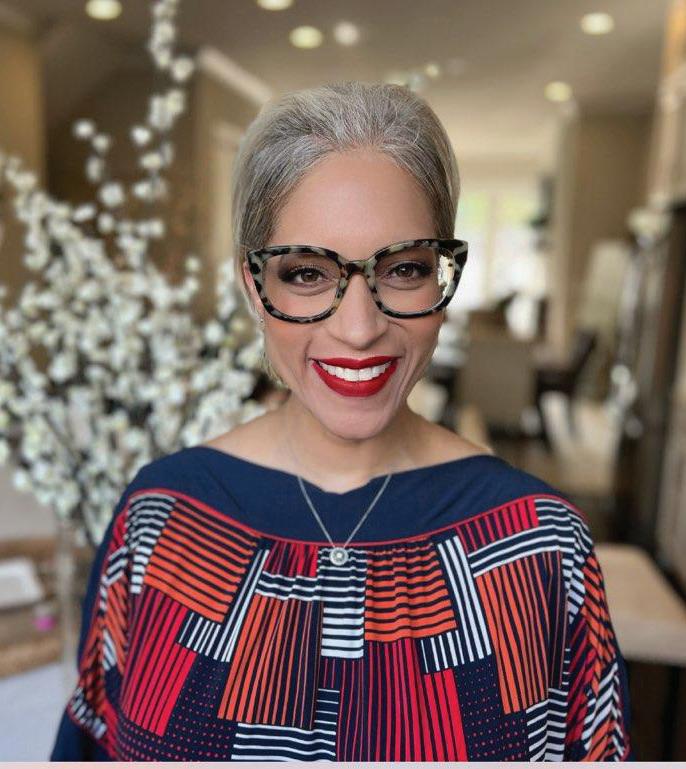
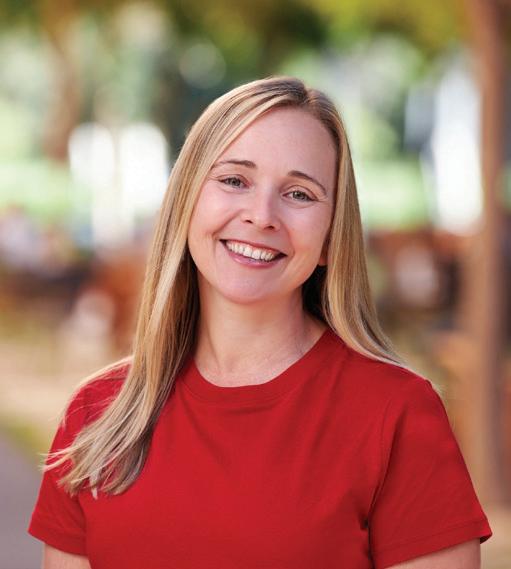
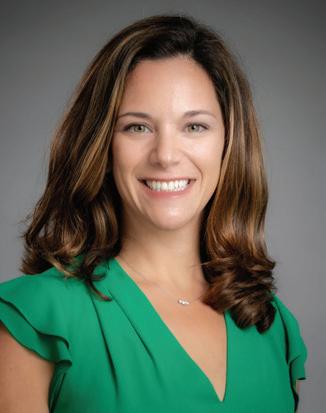
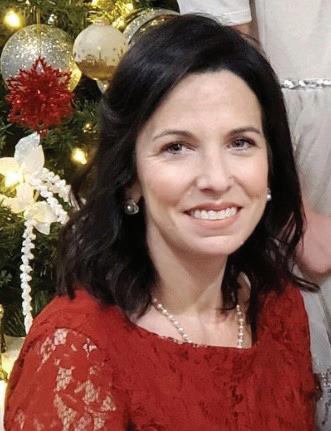
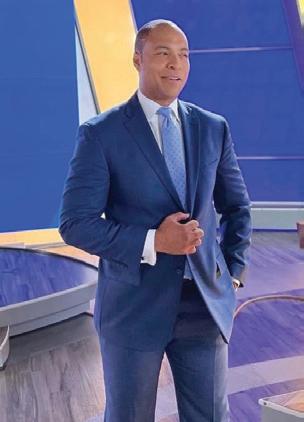

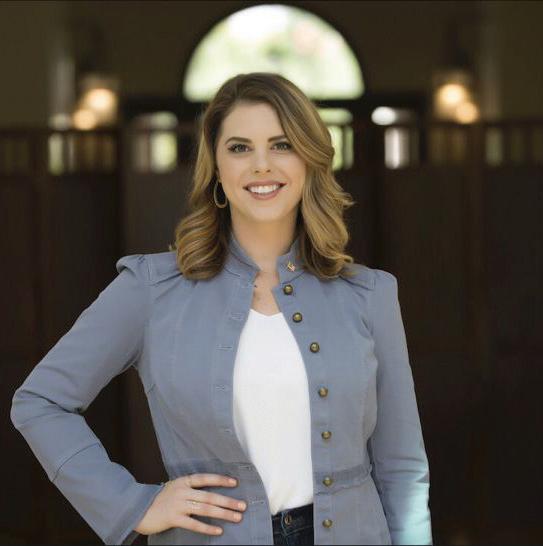
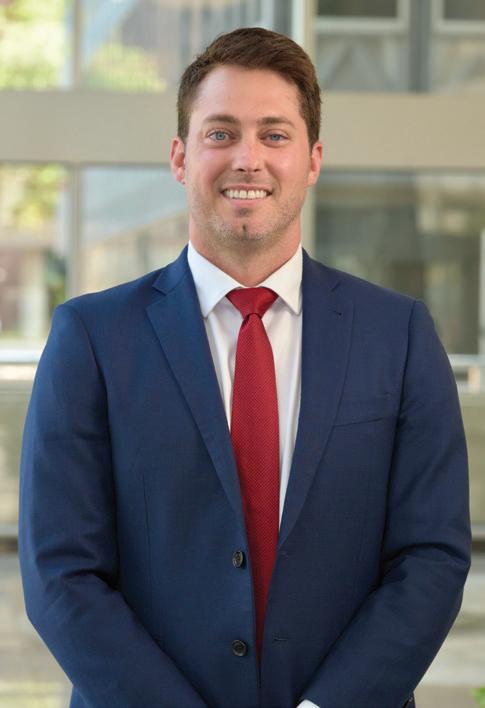

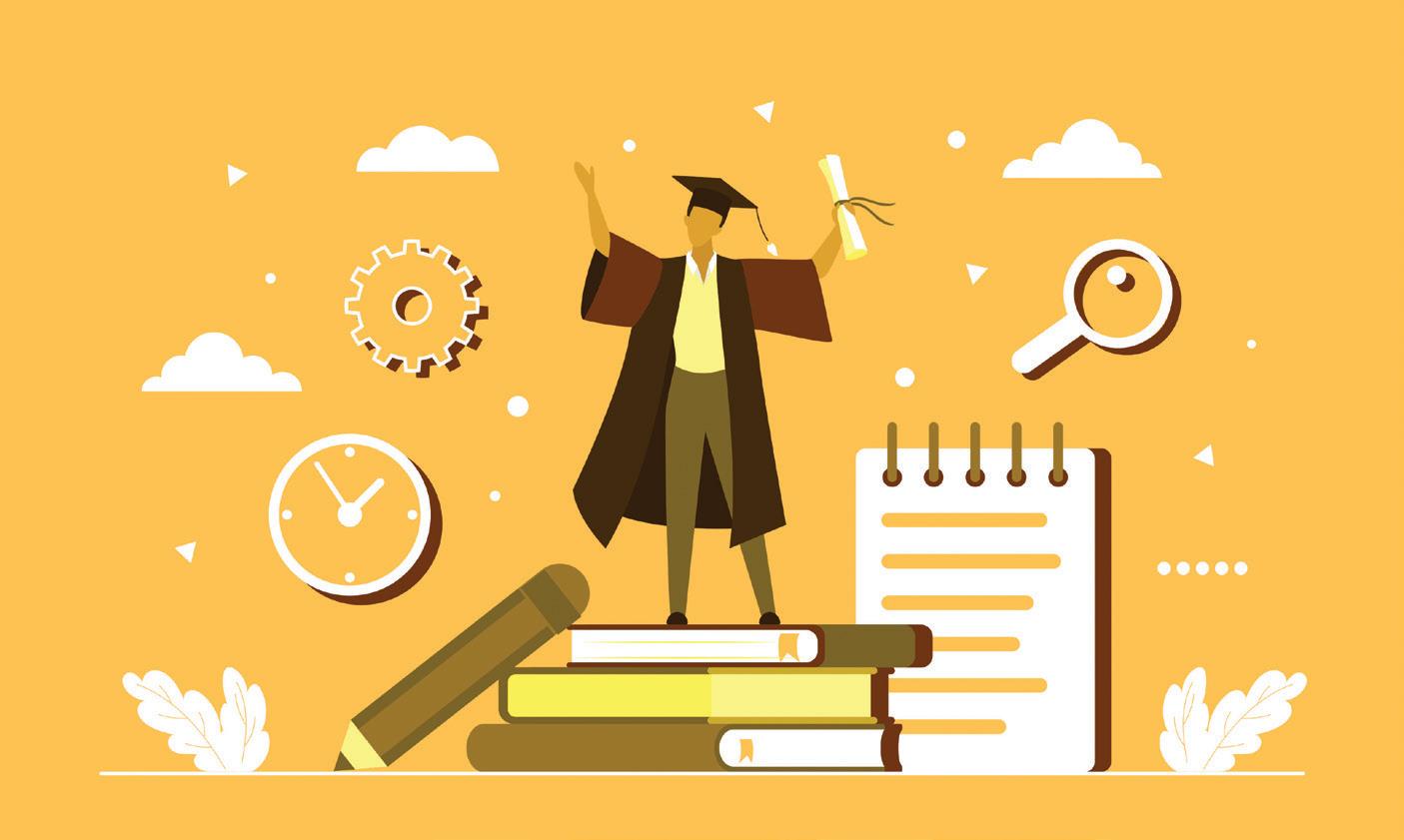
Dennis Baker, Ph.D., professor emeritus at the College of Medicine, co-authored “Effectiveness of An Online Preceptor Development Program Across Health Professions,” published by American Science Educator.
Scotty Barnhart, associate professor of jazz trumpet at the College of Music, won his third Grammy at the 66th Annual Grammy Awards. Barnhart, director of the Count Basie Orchestra, received the Grammy for “Best Large Jazz Ensemble Album” for the Count Basie Orchestra’s “Basie Swings The Blues.”
Sharma Boel-Studt, Ph.D. and Melissa Radey, Ph.D., at the College of Social Work, co-authored “Maternal Experience of Maternity Group Homes: A Qualitative Study,” published by the Journal of Adolescent Research.
Henna Budhwani, professor at the College of Nursing, was acknowledged by the Society of Behavioral Medicine as a fellow, honoring her contributions in establishing vital connections between behavioral and biomedical research. Her work has played a pivotal role in advancing healthcare and enhancing patient well-being.
Erin Bush, Ph.D., at the College of Communication & Information, co-authored “Students’ Perception of a Virtual Dissection Laboratory in Undergraduate Anatomy and Physiology of Speech and Hearing: A Focus Group Study” published by Seminars in Speech and Language.
Sonia Cabell, Ph.D., at the College of Education, Health, and Human Sciences,
delivered keynote presentations at The Ohio State University’s 2023 Symposium on Children Getting Ready to Read and Amplify’s Science of Reading: The Symposium.
Sara Hart, Ph.D., at the Department of Psychology, presented “Utilizing Precision Education to Explore Variances in Learning” at the Center for Research on Language and Literacy Acquisition Challenges at Georgia State University.
Lisa Hightow-Weidman, M.D., at the College of Nursing, presented “Digital Technologies for Supporting HIV Adherence” at the HIV Center for Clinical and Behavioral Studies at the New York State Psychiatric Institute and Columbia University.
Thomas Joiner, Ph.D., at the Department of Psychology, published the book “The Varieties of Suicidal Experience: A New Theory of Suicidal Violence.”
Mason Marks, M.D., J.D., at the College of Law, co-authored the article “How Should the FDA Evaluate Psychedelic Medicine?” published by the New England Journal of Medicine.
Ravinder Nagpal, Ph.D., at the College of Education, Health, and Human Sciences, was awarded a $100,000 research grant from the Florida Department of Health through the Ed & Ethel Moore Alzheimer’s Disease Research Program for his project “Mechanisms of Enteric Infectionmediated Pathobiome in Alzheimer’s Neuropathology.”
Iain Quinn, Ph.D., at the College of Music, authored the books “Music and Religion in the Writings of Ian McEwan,” published by Boydell and Brewer and “Rudolph Ganz, Patriotism, and Standardization of The Star-Spangled Banner, 1907-1958,” published by Routledge.
Ralm Ricarte, Ph.D., at FAMU-FSU College of Engineering, was awarded the 2023 3M Non-Tenure Faculty Award in recognition of his outstanding research on the physical chemistry of dynamic polymer networks and to support his path toward a tenured professorship.
Mollie Romano from the College of Communication & Information and her team from the Communication and Early Childhood Research and Practice Center were awarded three years of funding from the U.S. Department of Health for her work in Early Steps Professional Development.
Jayaram Sethuraman, Ph.D., at the Department of Statistics in College of Arts and Sciences, was awarded the Professor C.R. Rao Lifetime Achievement Award by the Indian Society for Probability and Statistics.
Suzanne M. Sinke, Ph.D., at the History Department, presented “Better living through marriage migration?” at the Social Science History Association meeting in Washington, D.C.
Elizabeth Slate, Ph.D., at the Department of Statistics in the College of Arts and Sciences, was selected for the Carnegie Mellon University Department of Statistics Alumni Distinguished Lecture Award.
Christopher Solís, Ph.D., at the College of Education, Health, and Human Sciences, was awarded a $747,000 grant from the National Institutes of Health for his project “PostTranslational Mechanisms of Cardiac Adaptation During Unloading.”
Tuba Tuncel, Ph.D., at the Department of Economics in the College of Social Sciences & Public Policy, co-authored “Monetary values of increasing life expectancy: Sensitivity to shifts of the survival curve” in the Journal of Risk and Uncertainty.
Arda Vanli, Ph.D, associate professor of industrial engineering at FAMU-FSU College of Engineering, was elected as the program chair of the American Society of Quality (ASQ) Reliability, Maintenance & Managing Risk (RMMR) Conference that will be held in Pittsburgh, July 25-26, 2024. The RMMR Conference is the main conference of the Reliability and Risk Division of the ASQ focusing on statistical and analytical techniques for analyzing risk and reliability in a variety of engineering and societal applications.
Carli Zegers, Ph.D., associate professor at the College of Nursing, was named a Distinguished Fellow of the National Academies of Practice (NAP) in recognition of her exceptional nursing and interprofessional collaborations.
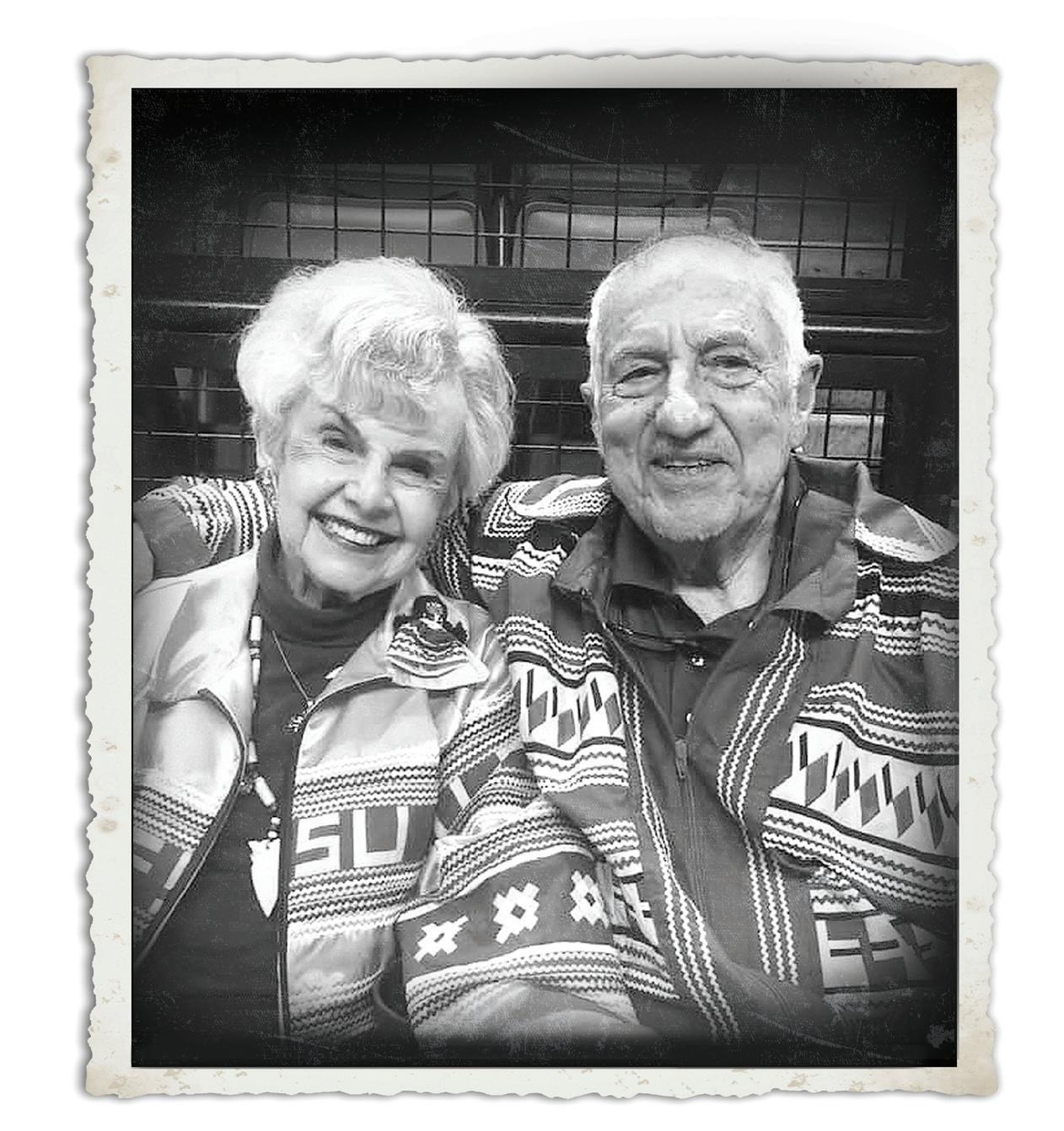
Judge James E. Joanos (B.S. ’56), who passed away on January 20, 2024, in Tallahassee, Florida, at 89, was a veteran attorney, judge and devoted alumnus of FSU. A Tallahassee native, he graduated from Leon High and Florida State University, served three years in the Air Force, then went to Yale Law School before returning to his hometown to practice law. He became a trial judge on the Second Judicial Circuit of Florida for eight years. Eventually, he rose to chief judge of Florida’s First District Court of Appeal, serving for two decades. In 2000, Joanos retired to private practice.
The FSU Alumni Association deeply mourns the passing of Joanos, who epitomized family, tradition, unwavering service and loyal support of FSU for over six decades. He was instrumental in establishing FSU’s College of Law, where he also served as an adjunct professor for over 20 years. He received nearly every honor a volunteer can receive from FSU, including the FSU Alumni Association’s Circle of Gold award—an award he helped to create to honor alumni of merit who, by their service and accomplishments, embody the esteemed tradition of excellence at the university.
As an FSU student, Joanos earned a Bachelor of Science in government and public administration; he served as a student body leader and member of the FSU Varsity Club (track).
“Judge Joanos’ legacy at Florida State University simply can’t be overstated,” said Julie Decker, President and CEO of the FSU Alumni Association. “He made unique contributions to FSU and the Alumni Association that make us who we are today. I will miss his input on historic topics and innovations of the day. He was a partner through and through. He and Betty Lou are woven throughout who we are as an association.”
The FSU Alumni Association extends its condolences to his wife, Betty Lou (B.S. ’57, Ph.D. ’85), also a devoted Seminole, and is grateful for Judge Joanos’ impact, commitment and loyalty to Florida State University.
Dr. Ronald Blazek, professor emeritus for the College of Communication and Information, passed away in December of 2023. An accomplished librarian, professor and academic author of dozens of articles and reviews, Blazek wrote and published 10 books alone and with colleagues, including widely used textbooks on the Humanities and U.S. History. He received FSU Foundation Grants, served on editorial boards, as well as numerous doctoral and professional committees. He received the Justin Winsor Award for Outstanding Piece of Historical Writing; as well as numerous Choice Magazine awards for Outstanding Academic Book. Blazek joined the faculty in 1971 and served at Florida State University for over 32 years, mentoring countless students and leaving a lasting impact on its programs. He and his wife Genny were married for 63 years.
Gifts can be made in his memory to the Ron & Genny Blazek Endowed Scholarship Fund.
GIVE TODAY give.fsu.edu/blazek
Barbara Jean Davis (B.S. ’50) passed in January of 2024 in Black Mountain, North Carolina. She was 95. While at FSU, she held leadership positions in a number of campus organizations, with extensive involvement in FSU Student Government. She also had leadership roles in Garnet Key and Mortar Board, all of which prepared her for a life of impact. Following college, Davis attended Southern Baptist Theological Seminary, where she received a Master of Religious Education, an unusual pursuit for women in the 1950s. While there, she met Cornelius Davis, and they were married for 70 years, until his death in 2022. Davis had a lengthy and significant calling as a pastor’s wife. Other consequential roles included being a teacher, mentor, writer, speaker, tutor, volunteer, as well as a daughter, sister, wife, mother, grandmother and friend. Davis touched countless souls throughout her life as she beautifully and enthusiastically embraced serving people in the churches and communities where she lived.
George “Gary” Folsom Sr. (B.S. ’58) passed away in August of 2023. A 60-year resident of Raleigh, North Carolina, formerly of Jacksonville, Florida, he was 91. Folsom was awarded a full athletic scholarship to attend Florida State University, where he played quarterback for the Seminoles during the 1950 and 1951 seasons. Then, he entered the U.S. Navy as a dental technician. While on active duty, he met Anna Frances Larkin, to whom he was married for 69 years. Folsom worked in textile research during his early years, after which he played a key role in the construction and operation of a coal-gas reactor for North Carolina State University.
Dr. James D. Gwartney passed away in January of 2024. Professor emeritus for the College of Social Sciences & Public Policy, Gwarney served as director of The Gus A. Stavros Center for Economic Education and was a professor of economics at FSU for 53 years before his retirement. As a tribute to his impact in the field of economics, Ottawa University in Kansas, his undergraduate alma mater, is now home to The Gwartney Institute. In addition to his role as professor, Gwarney was a prolific writer and researcher, co-authoring “Economics: Private and Public Choice," a widely acclaimed textbook that has educated students around the globe. As a researcher, he made substantial contributions to the understanding of the relationship between economic freedom and prosperity. His “Economic Freedom of the World” annual report is widely recognized and cited by researchers and policy makers. Supported by Amy, his wife of 61 years, Gwartney accomplished much in his life while being blind for the past 30 years. Gwartney’s contributions to the world of economics will continue to resonate, and his memory will be cherished by colleagues, students and all those who were touched by his remarkable journey.
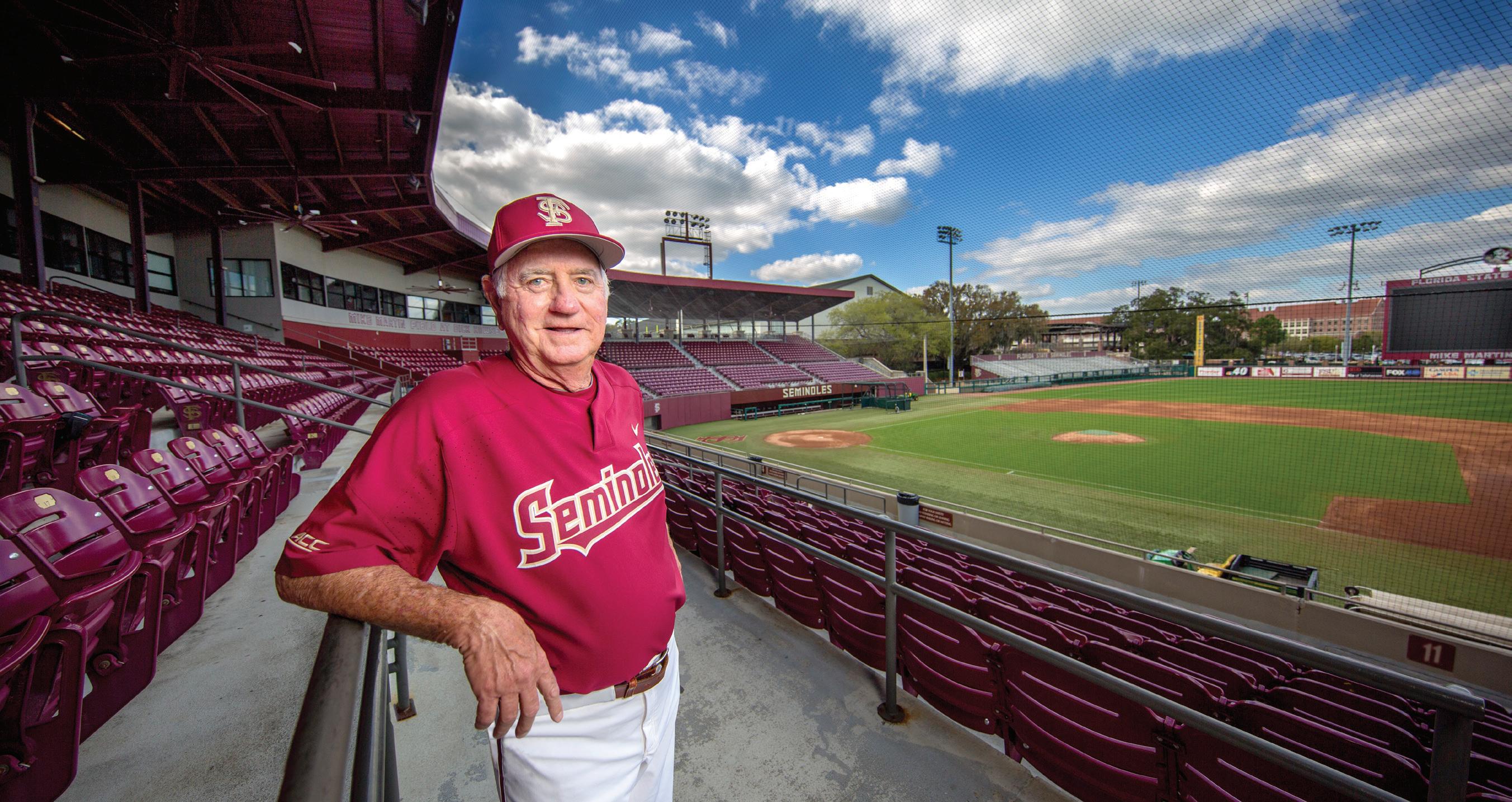
Mike Martin, Florida State baseball's head coach for 40 seasons and the winningest coach in college baseball history, died Thursday, February 1, 2024, after a three-year battle with Lewy body dementia. He was 79 years old.
Martin is survived by his wife of 59 years, Carol; children Mike Jr., Melanie and Mary Beth; and grandchildren Hannah Elizabeth, Tyler, Thomas Joseph and Lexi.
Martin capped his 40-year head coaching career at Florida State in 2019 with his 40th NCAA Tournament appearance, his 40th winning season and his 17th College World Series appearance, tied for the all-time most. Martin is the all-time winningest coach in NCAA history, for any sport, finishing his career with a 2,029-736-4 record.
A man whose uniform number –11 – was universally substituted among FSU faithful, Martin is a member of the Florida Sports Hall of Fame (inducted 2005), the American Baseball Coaches Association (ABCA) Hall of Fame (2007) and his home-state North Carolina Sports Hall of Fame (2018). After his retirement in 2019, he was inducted into the Florida State Athletics Hall of Fame and the National Collegiate Baseball Writers Association named its Coach of the Year trophy in his honor.
Just last month, Martin was recognized by the ABCA with the Lefty Gomez Award, presented to "an individual who has distinguished himself amongst his peers and has contributed significantly to the game of baseball locally, nationally and internationally."

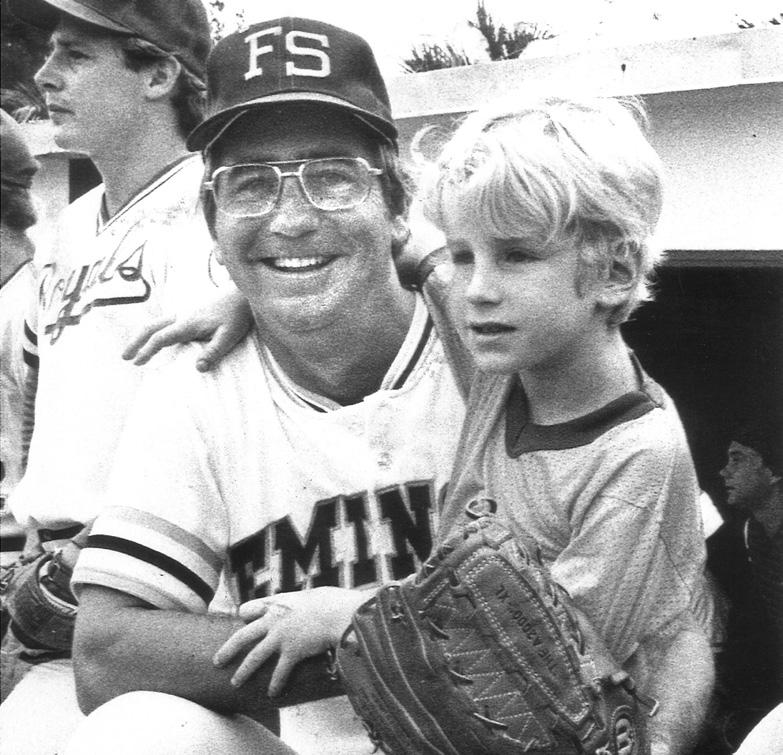
Born February 12, 1944, in Charlotte, North Carolina, Martin graduated from Garinger High School before spending two years at Wingate Junior College, where he first met the former Carol Dellinger. Accompanied by Carol, the pair moved to Tallahassee when Martin enrolled at Florida State as a junior. After helping lead the Seminoles to the 1965 College World Series and the NCAA Tournament in 1966, Martin earned his undergraduate degree in 1966 and his master's degree in 1971.
Mike and Carol married and remained in Tallahassee for the next 60 years.
After coaching stints at Cobb Middle School, Godby High School and Tallahassee Community College, Martin was hired by Woody Woodward as FSU's assistant coach prior to the 1975 season. After four seasons with Woodward and one under Dick Howser, Martin was promoted to the head job in the fall of 1979 after Howser was hired away to manage the New York Yankees.
Martin earned the first of his 17 College World Series appearances in 1980. He took the Seminoles three more times in the 1980s, seven times in the 1990s, twice in the 2000s and four times over his final decade, including his final year in 2019.
Florida State won 19 conference titles under Martin's leadership and he was a 13-time conference Coach of the Year. He was the National Coach of the Year in 2012 and 2019.
Martin had 20 players selected in the first round of the MLB Draft and 60 former players reached the Major Leagues. Eight former players were named National Player of the Year with four –Mike Fuentes, Mike Loynd, J.D. Drew and Buster Posey – recognized with the Golden Spikes Award, college baseball's Heisman Trophy.

Winning alone, however, did not define Martin's brilliant career. The 2001 team got a first-hand reminder of that prior to a series at Stanford. Leaving the San Francisco airport, Martin and assistant Chip Baker gained control of the team's charter bus after the driver suffered a fatal heart attack, safely guiding the bus to the side of a busy freeway. Martin and Baker were presented with the university's prestigious Westcott Award for their bravery in saving the lives of players and staff.
Martin's passion for the game and working with young people made him a popular public speaker throughout the country. His involvement through the years with the Fellowship of Christian Athletes provided another avenue for reaching out to others.
In August 2017, Martin delivered the commencement address for Florida State's summer graduates, the first time in his career he was so honored.
In 2004, Martin was honored by the two schools he attended as an undergraduate. Wingate University (then Wingate Junior College) bestowed upon him the honor of Distinguished Alumnus. He was also presented the Bernard F. Sliger Award for Service, named after Florida State's 11th president, which is the highest honor accorded by the Alumni Association.
In January of 2015, the Martin Family, longtime supporters of Tallahassee Memorial HealthCare's children's center and newborn intensive care unit, were honored as the children's playroom at TMH was named the "Mike Martin Family Playroom."
A public celebration of life was held on Mike Martin Field at Dick Howser Stadium on February 10, 2024.
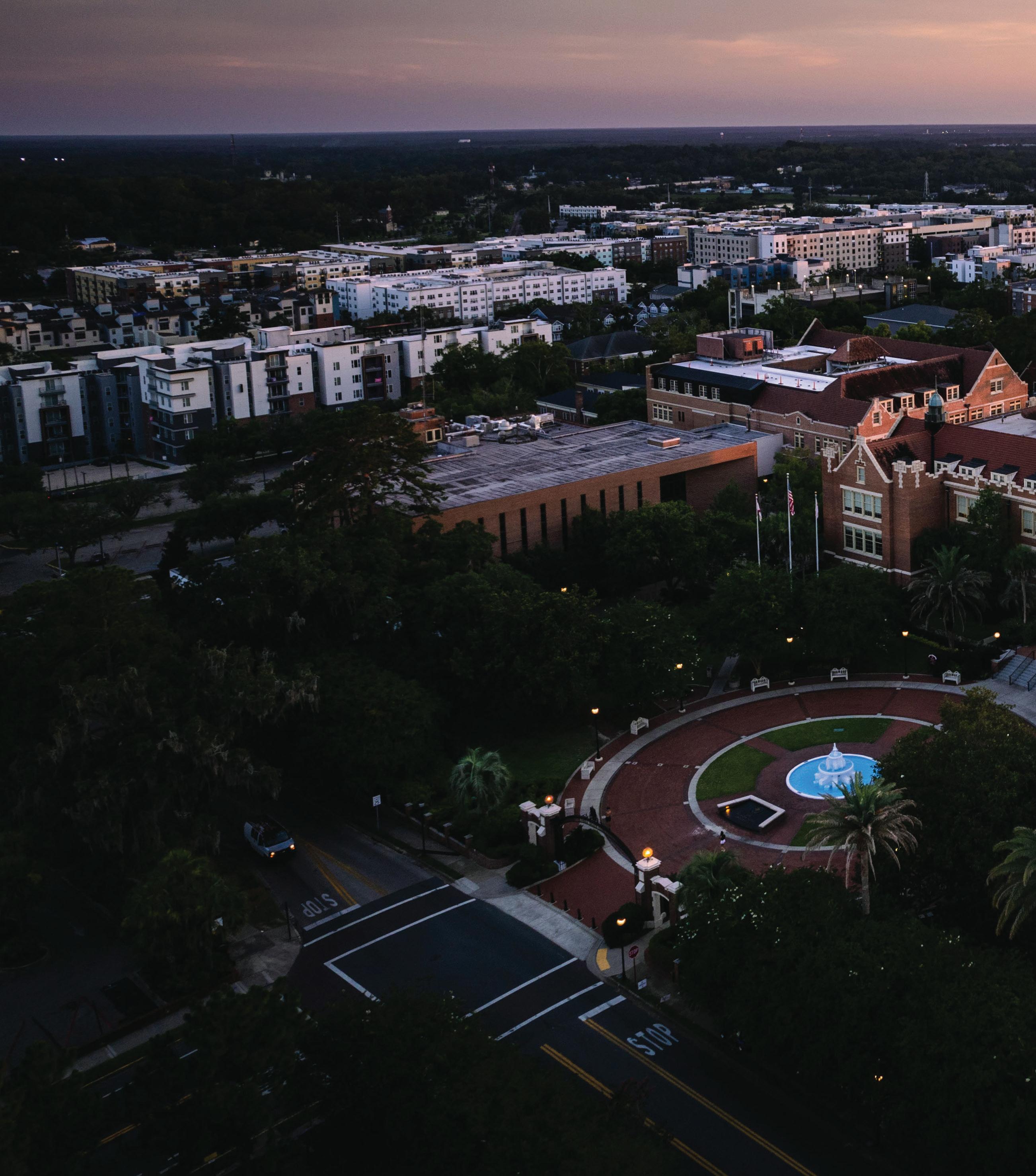

Florida State University is almost as old as the City of Tallahassee.
This year, as FSU celebrates its 173rd birthday, the City of Tallahassee celebrates a huge milestone: its bicentennial.
As you plan to head back to campus this year, check out the many facets of arts, culture, history and more the Capital City’s 200-year festivities will bring.
Florida State University Alumni Association 1030 West Tennessee Street Tallahassee, FL 32304-7719
alumni.fsu.edu

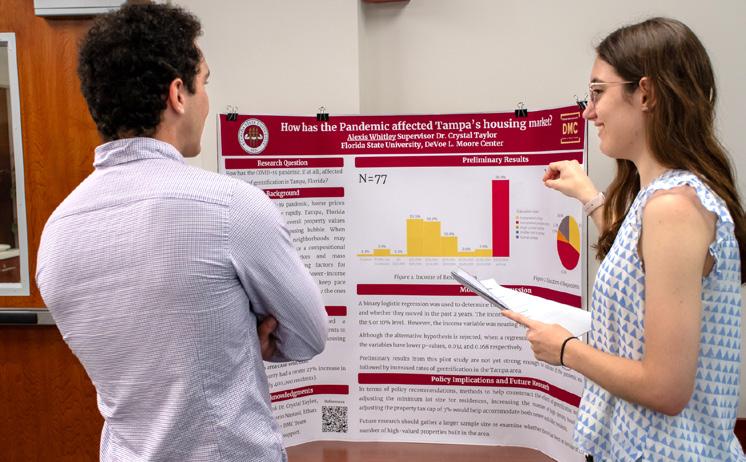

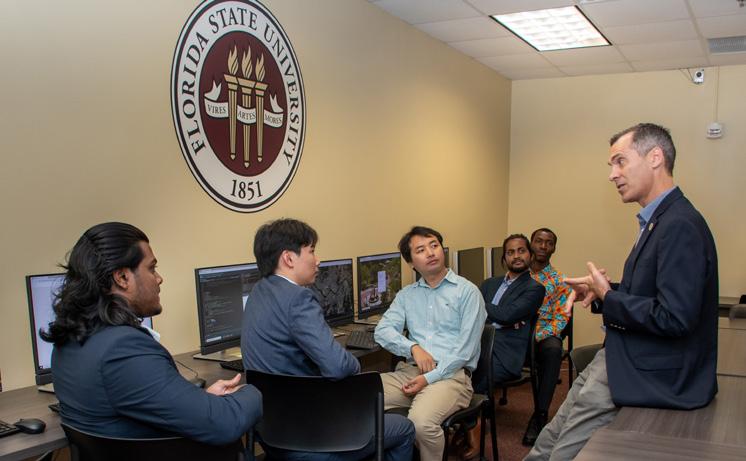

Since its creation during the 1973-1974 academic year, Florida State University’s College of Social Sciences and Public Policy has grown into the third-largest, most demographically diverse and politically engaged College on campus.
Visit our website to learn about our 50th anniversary events and for more about our College’s rich history.